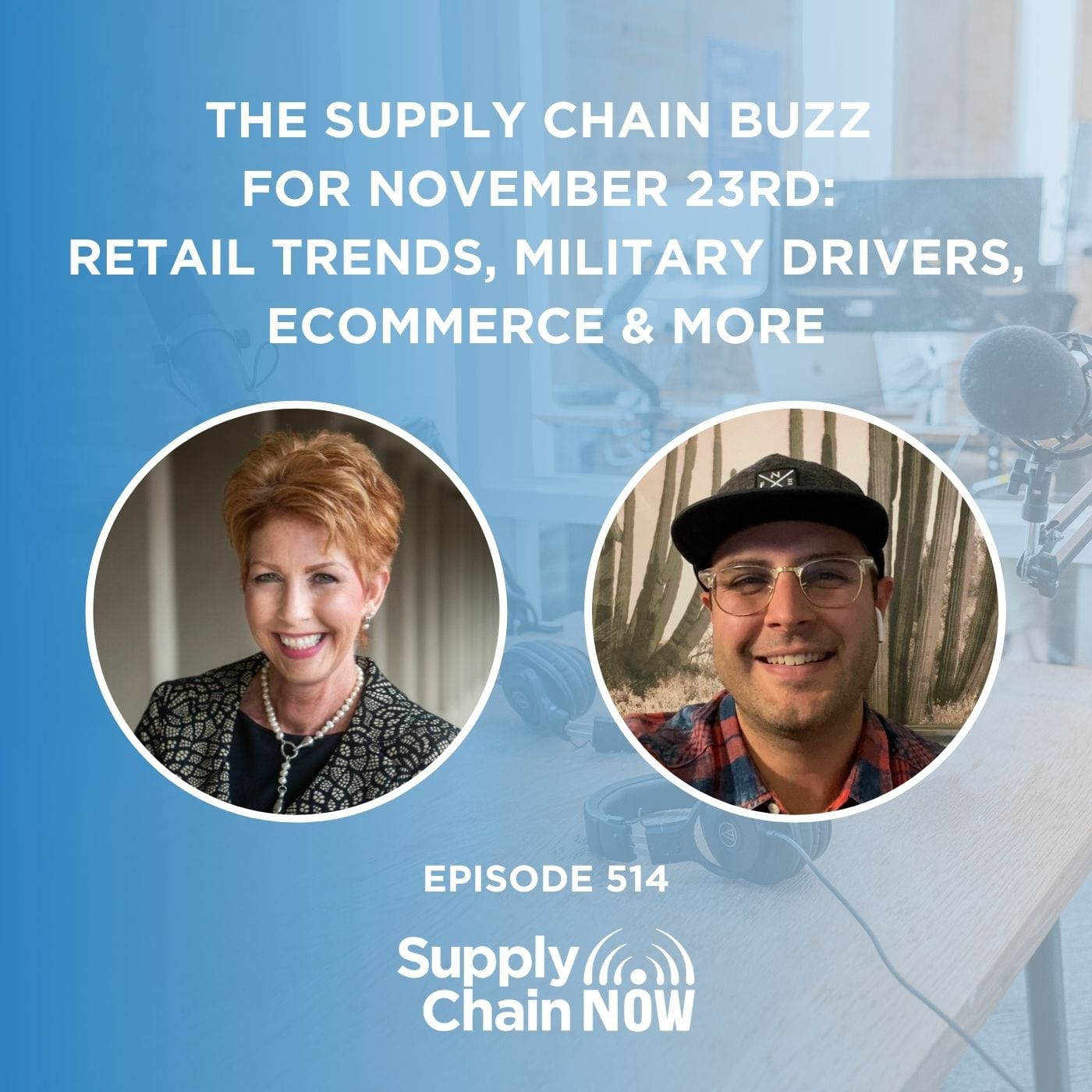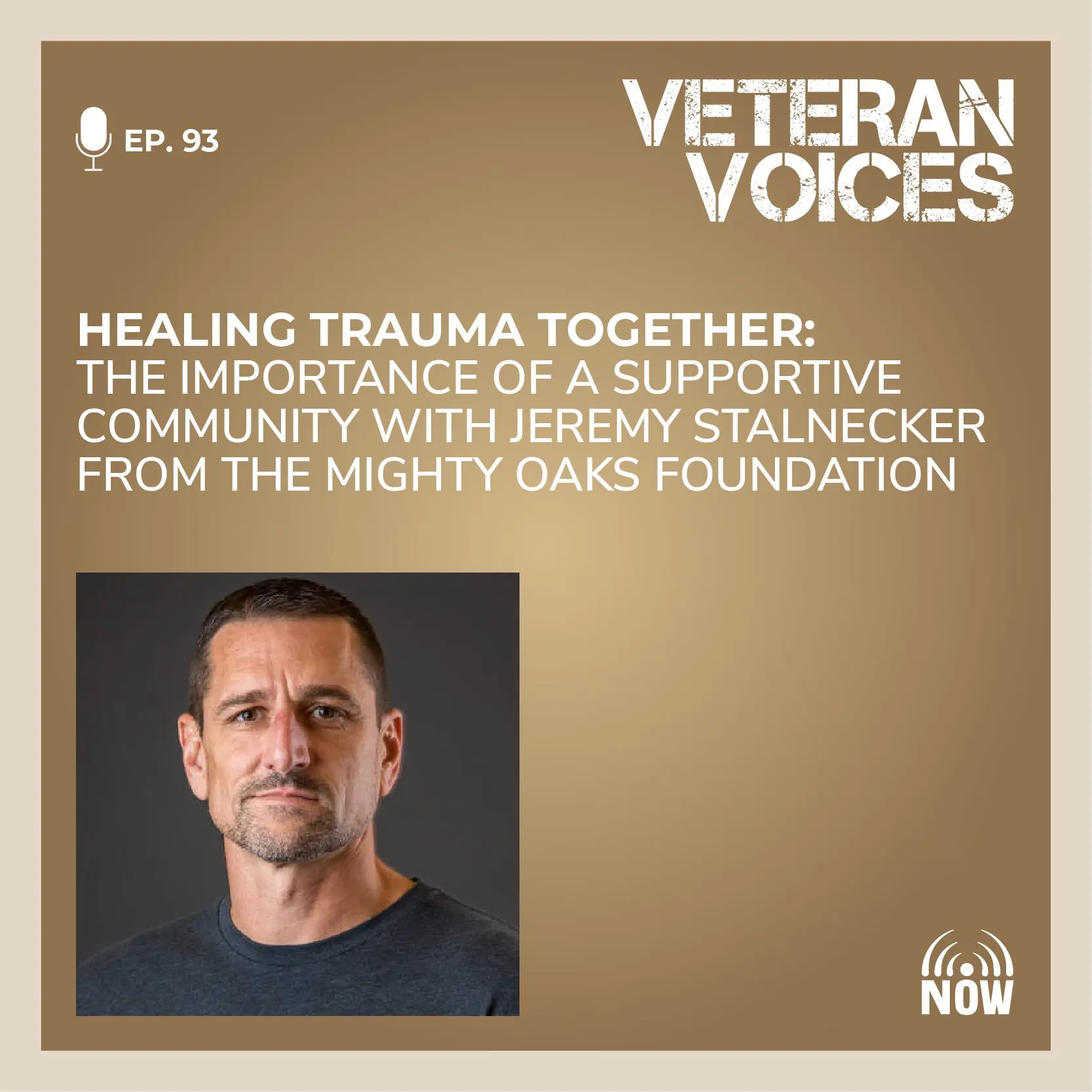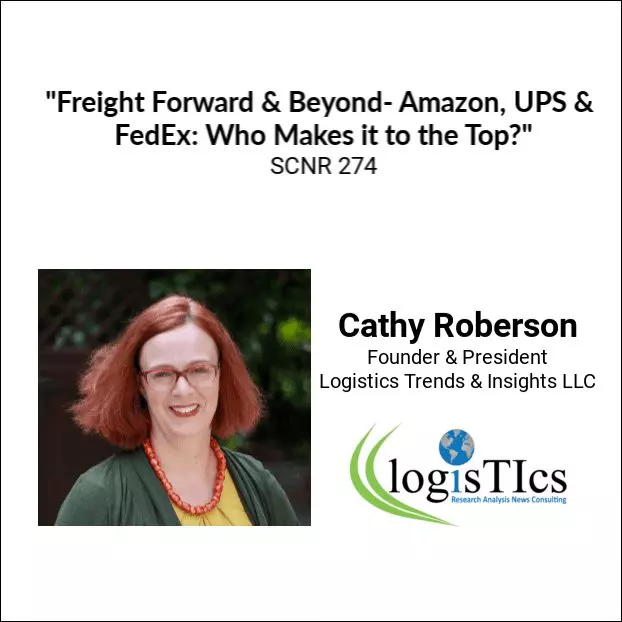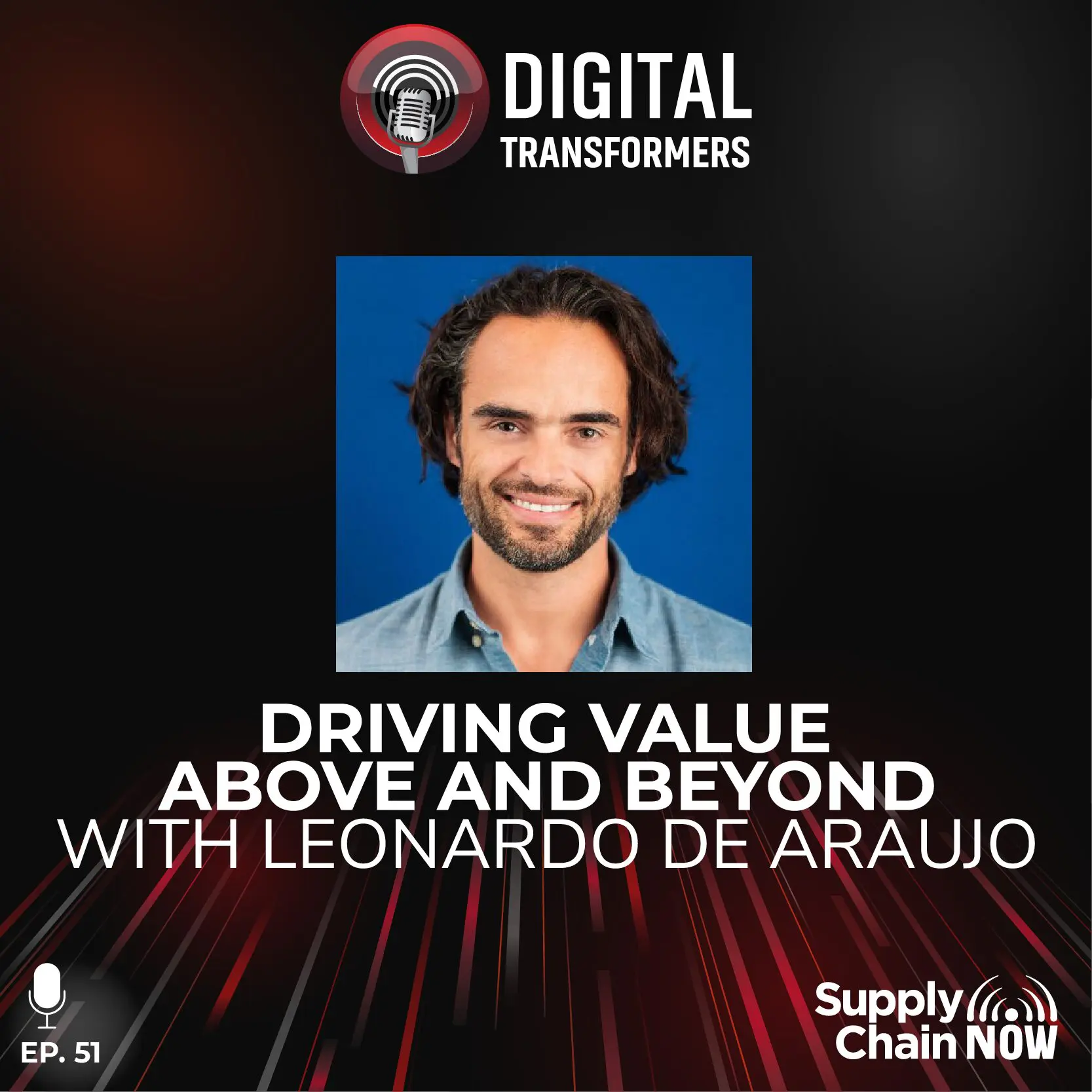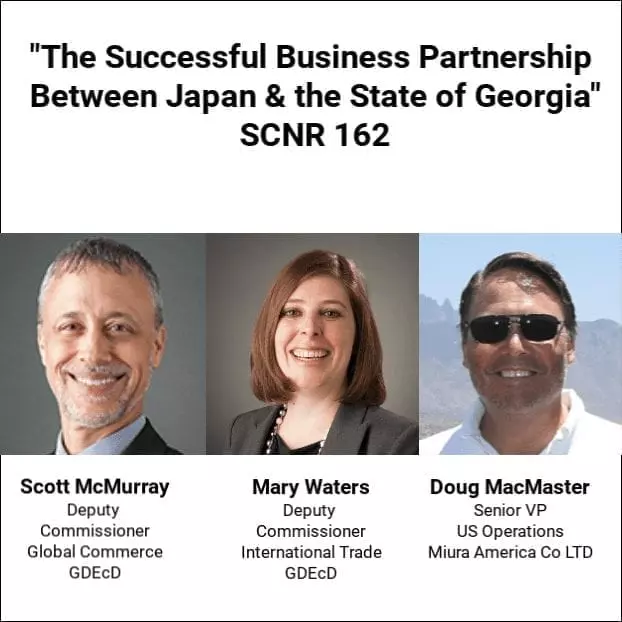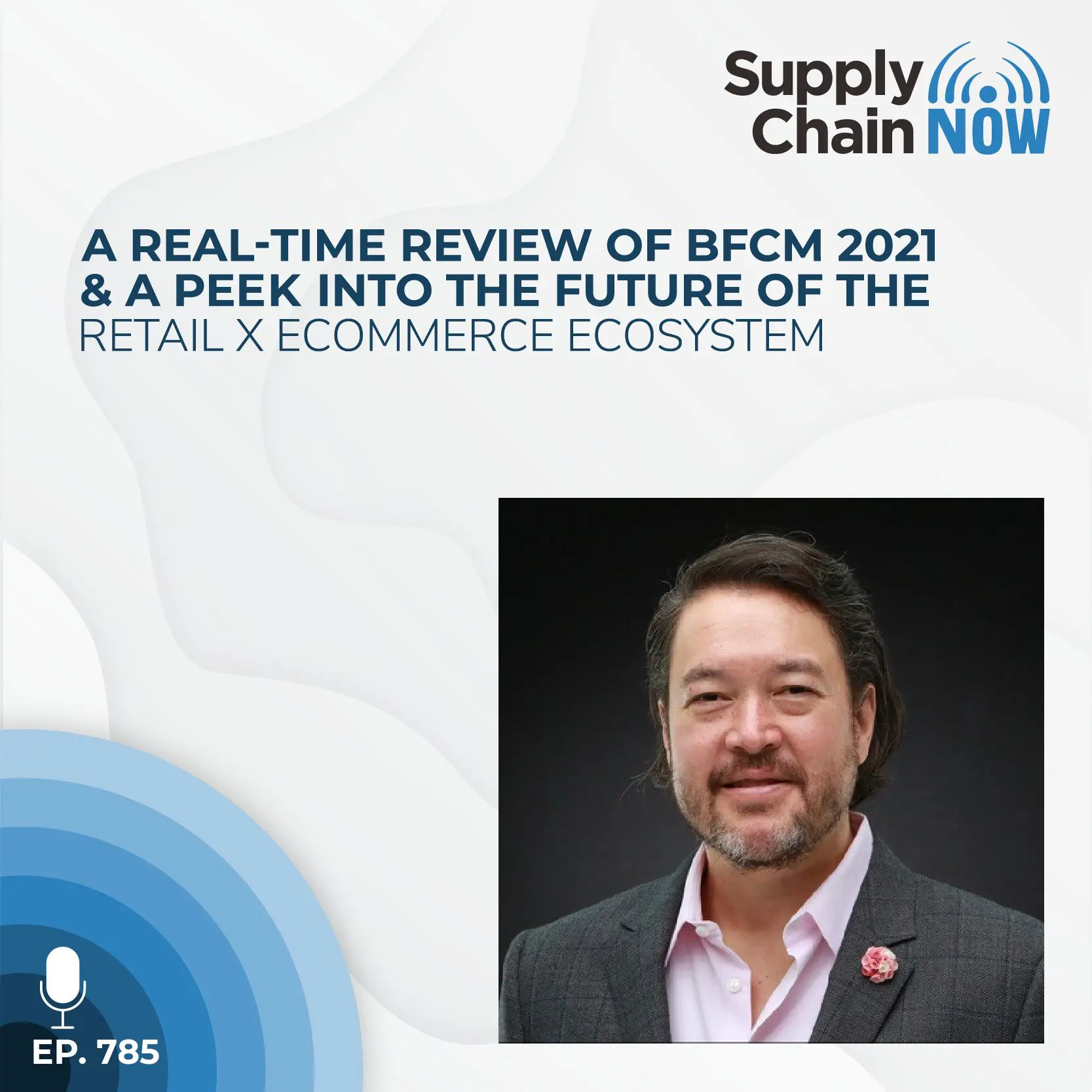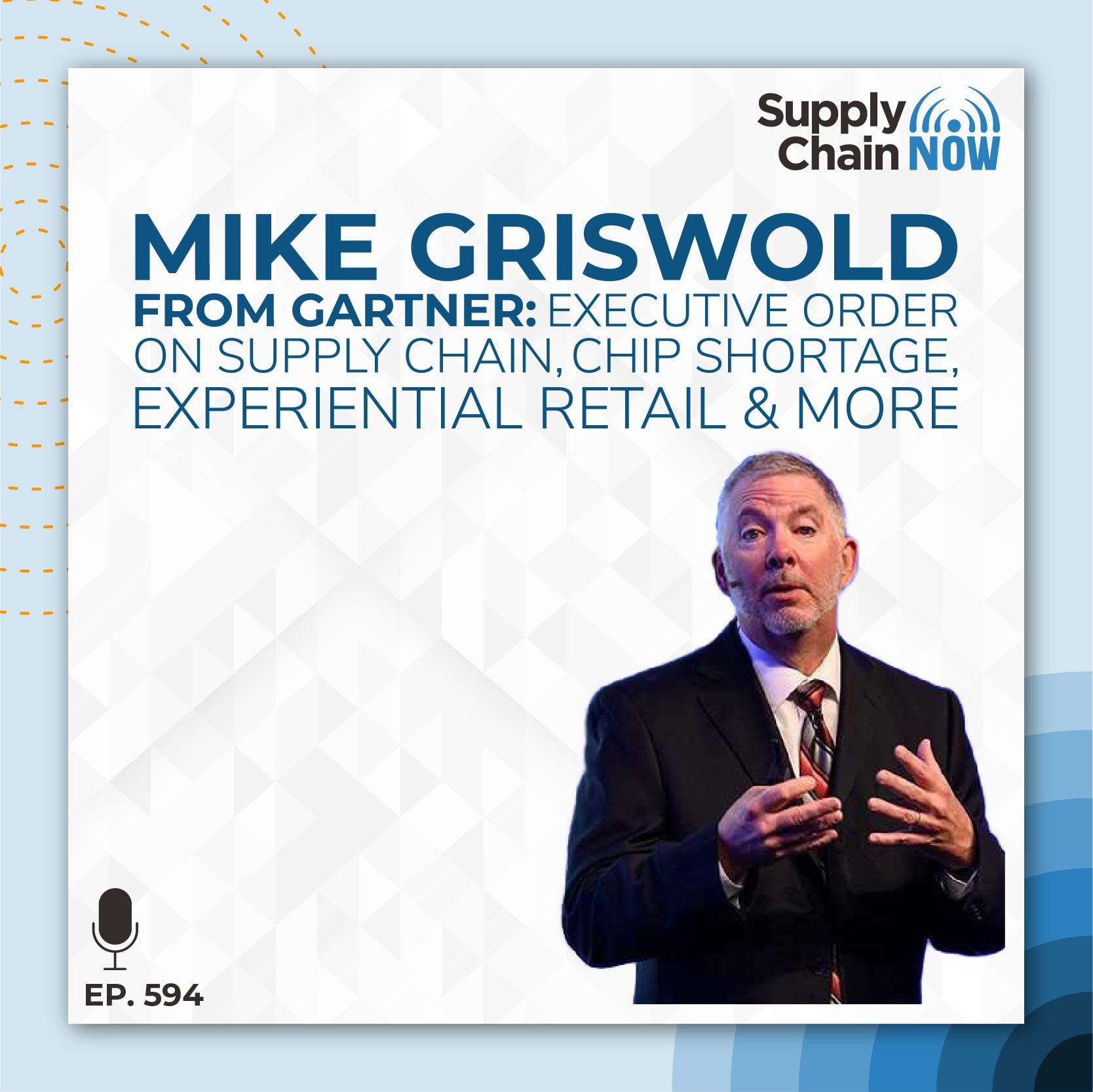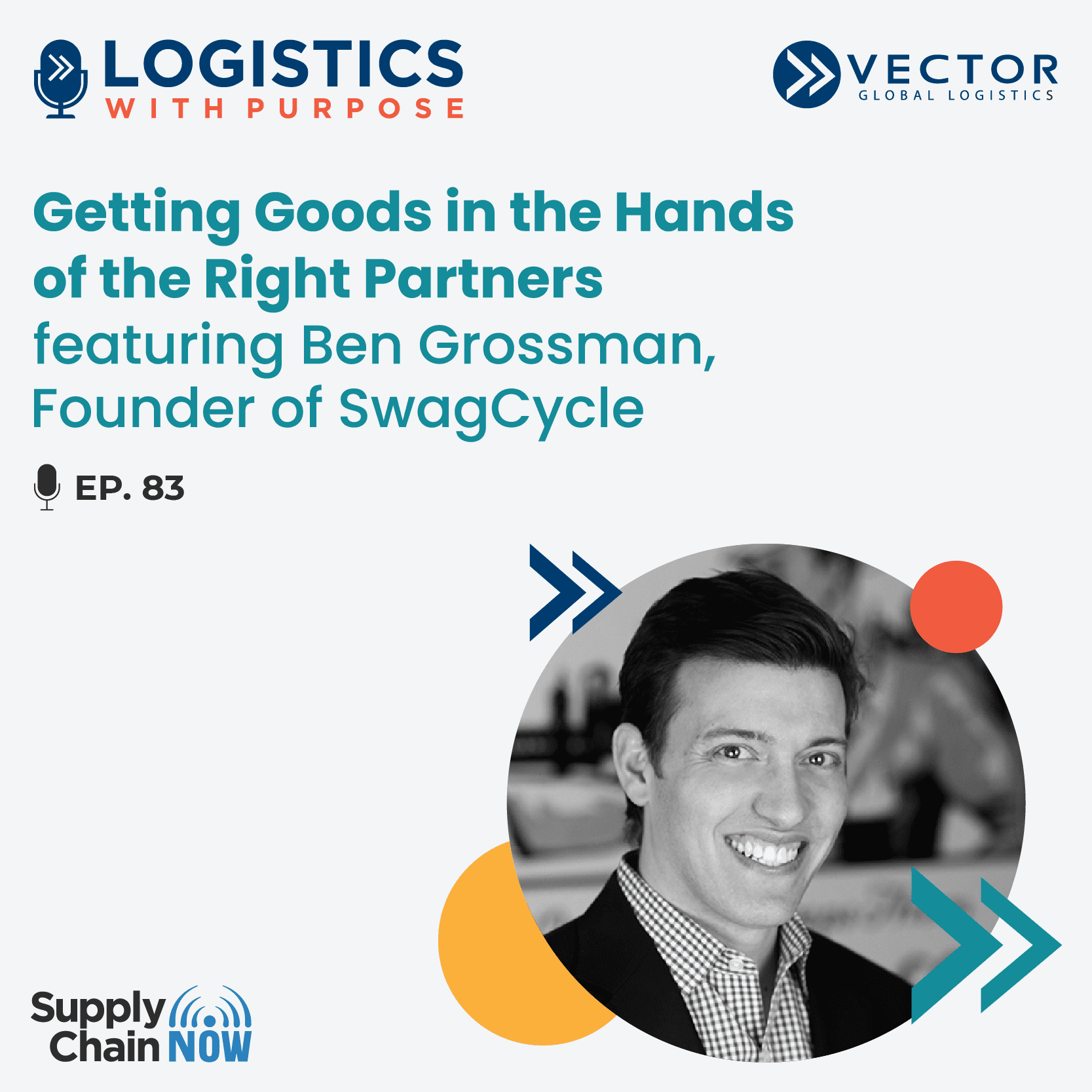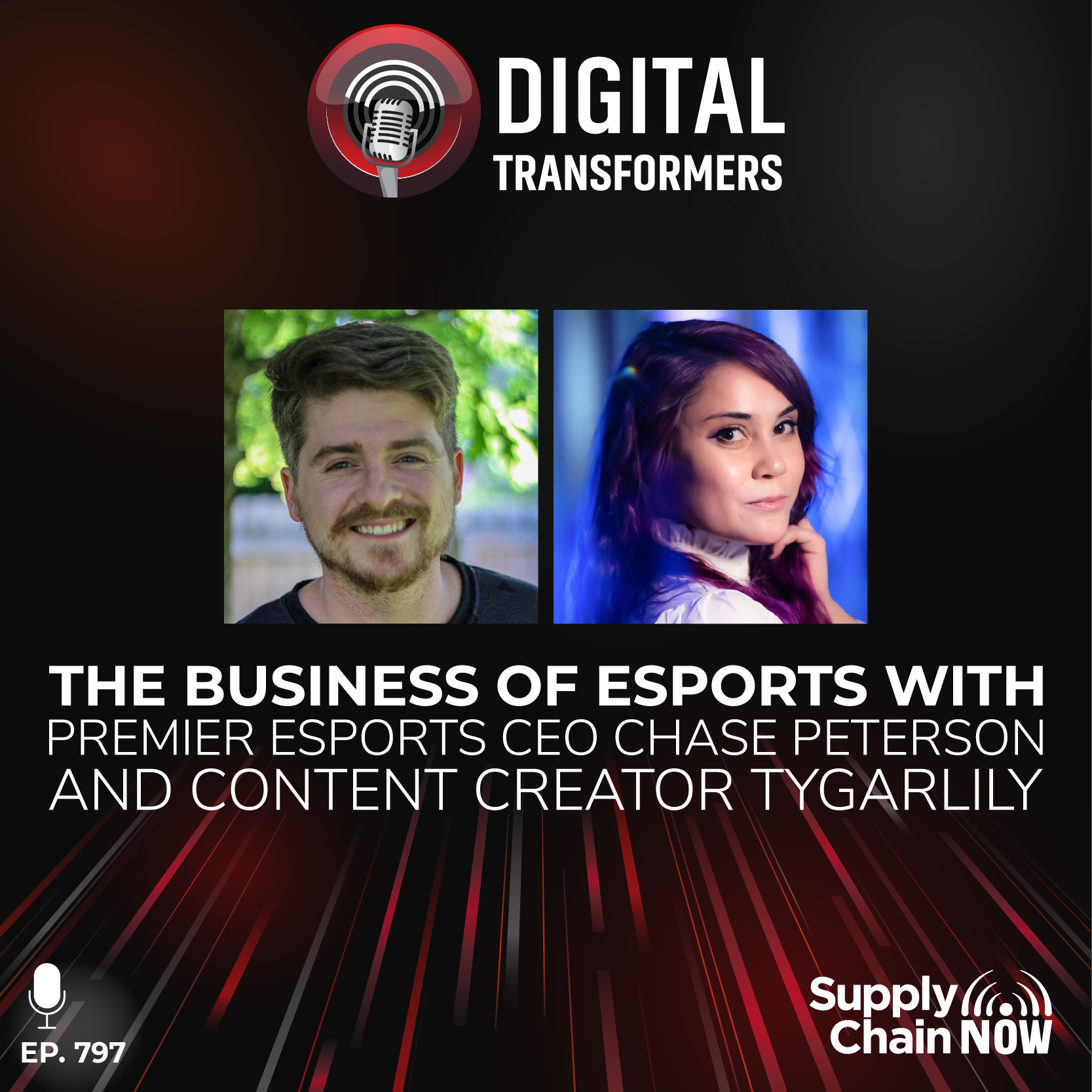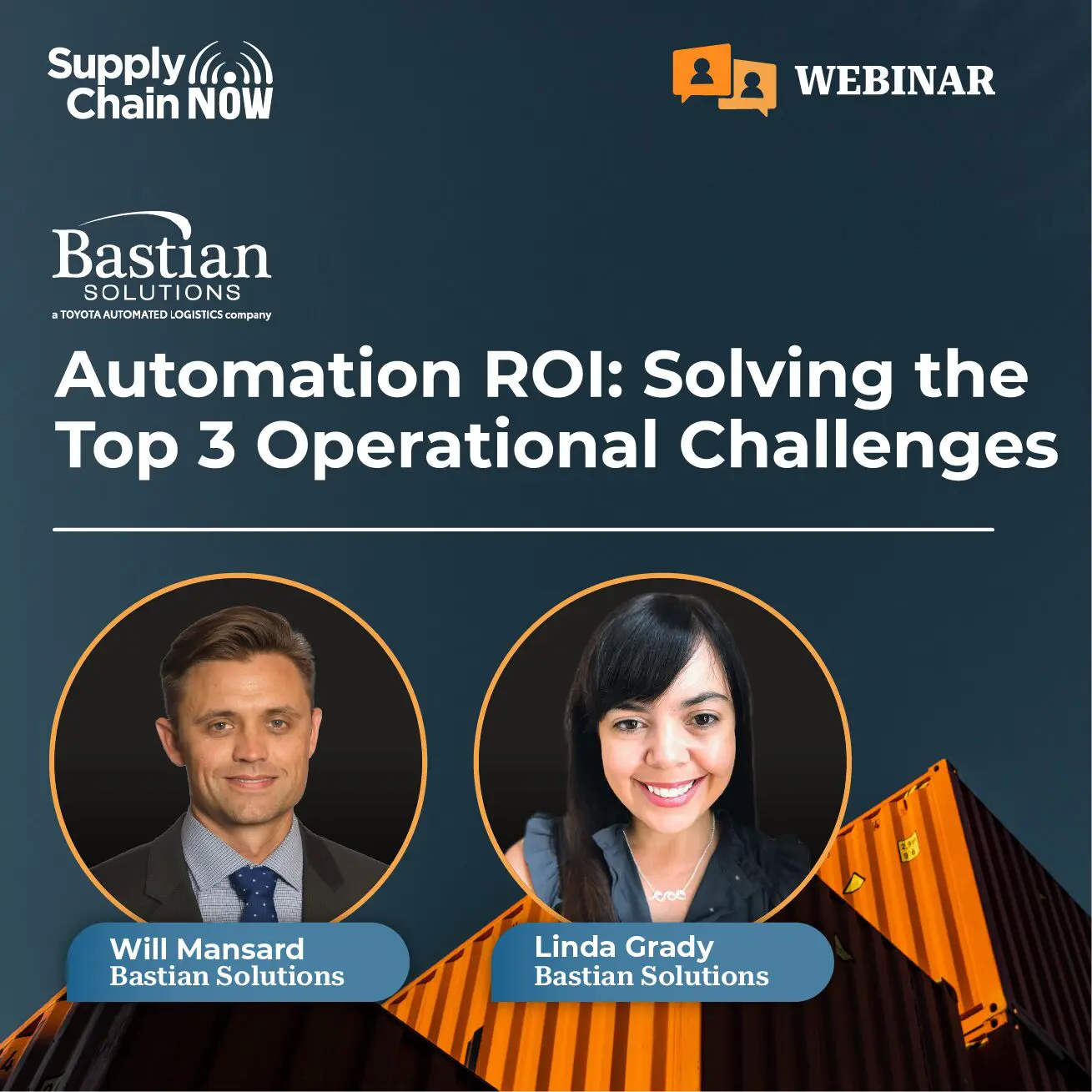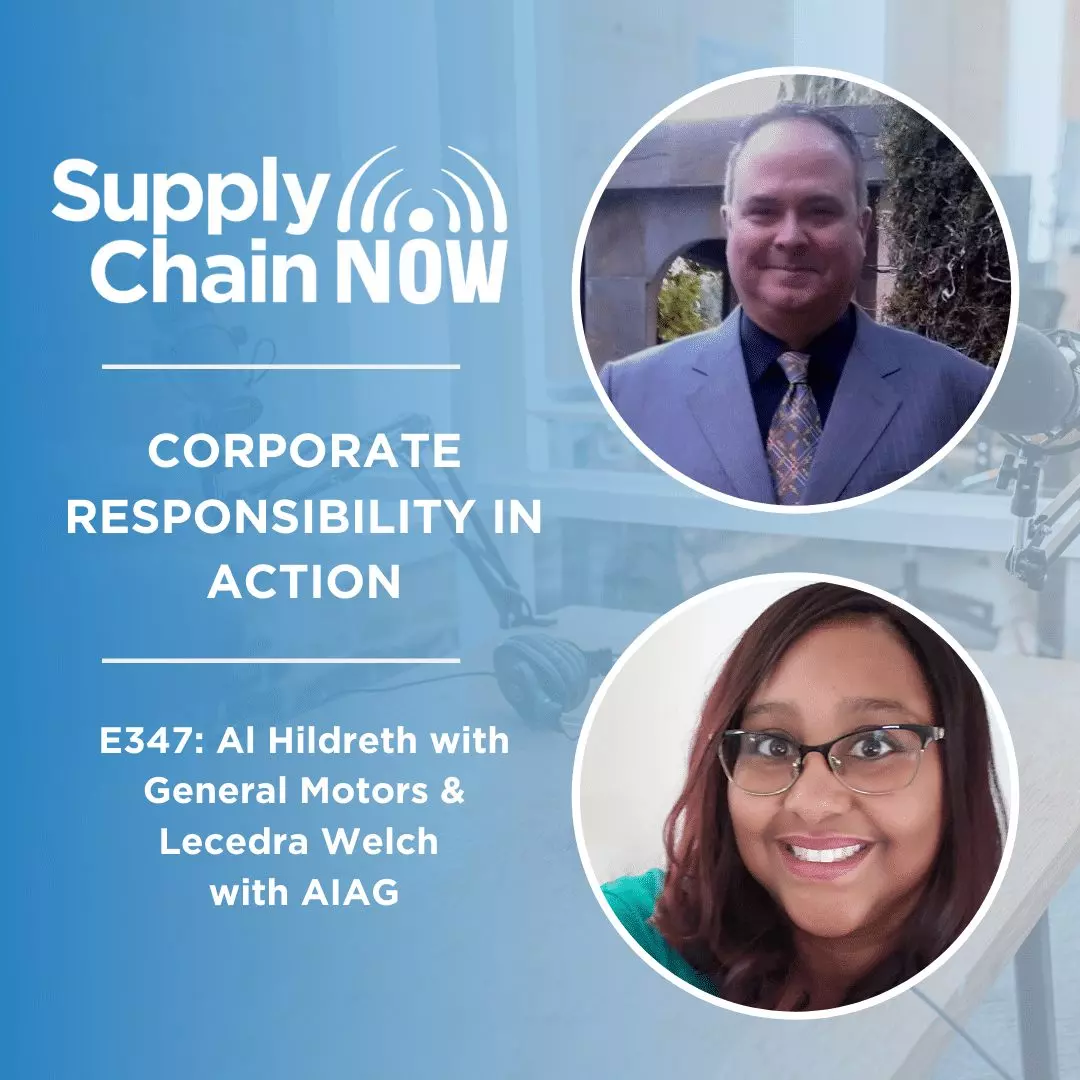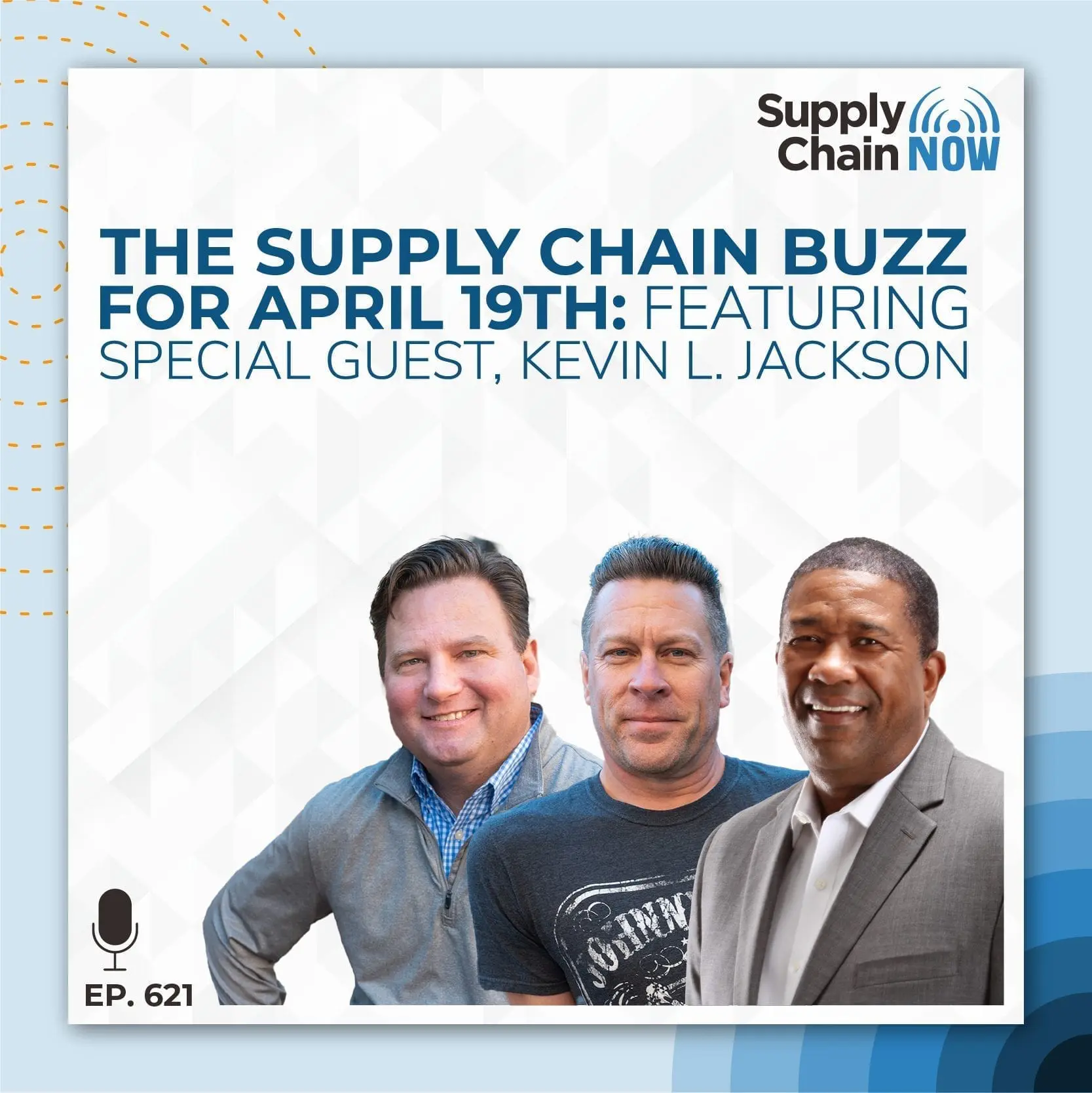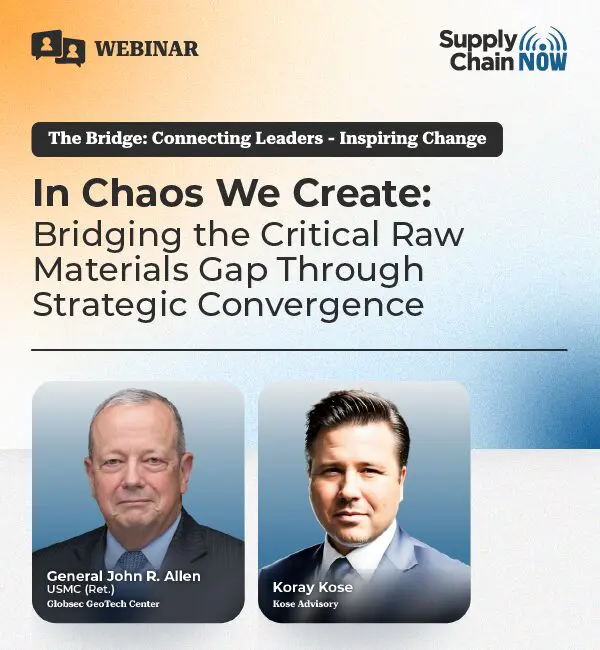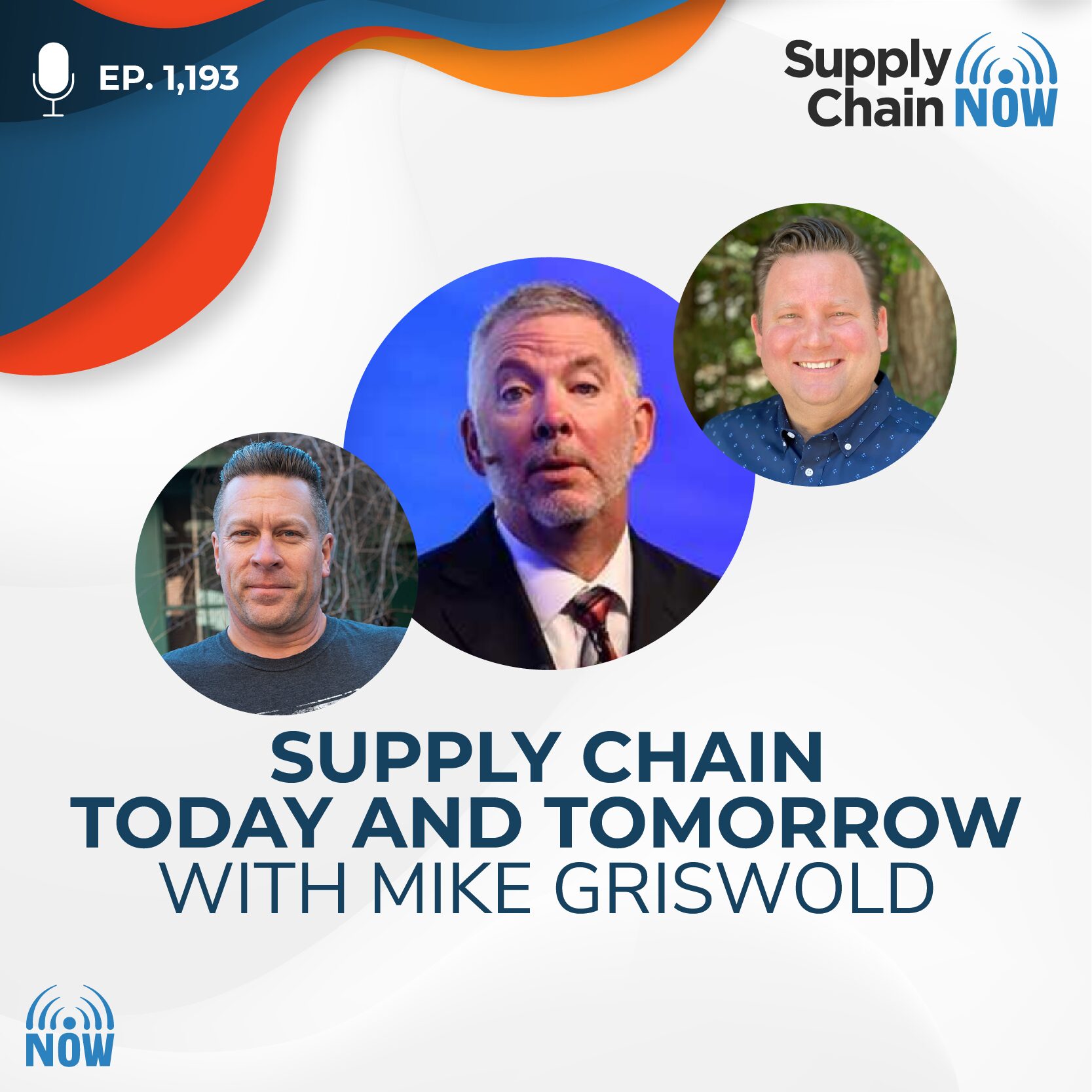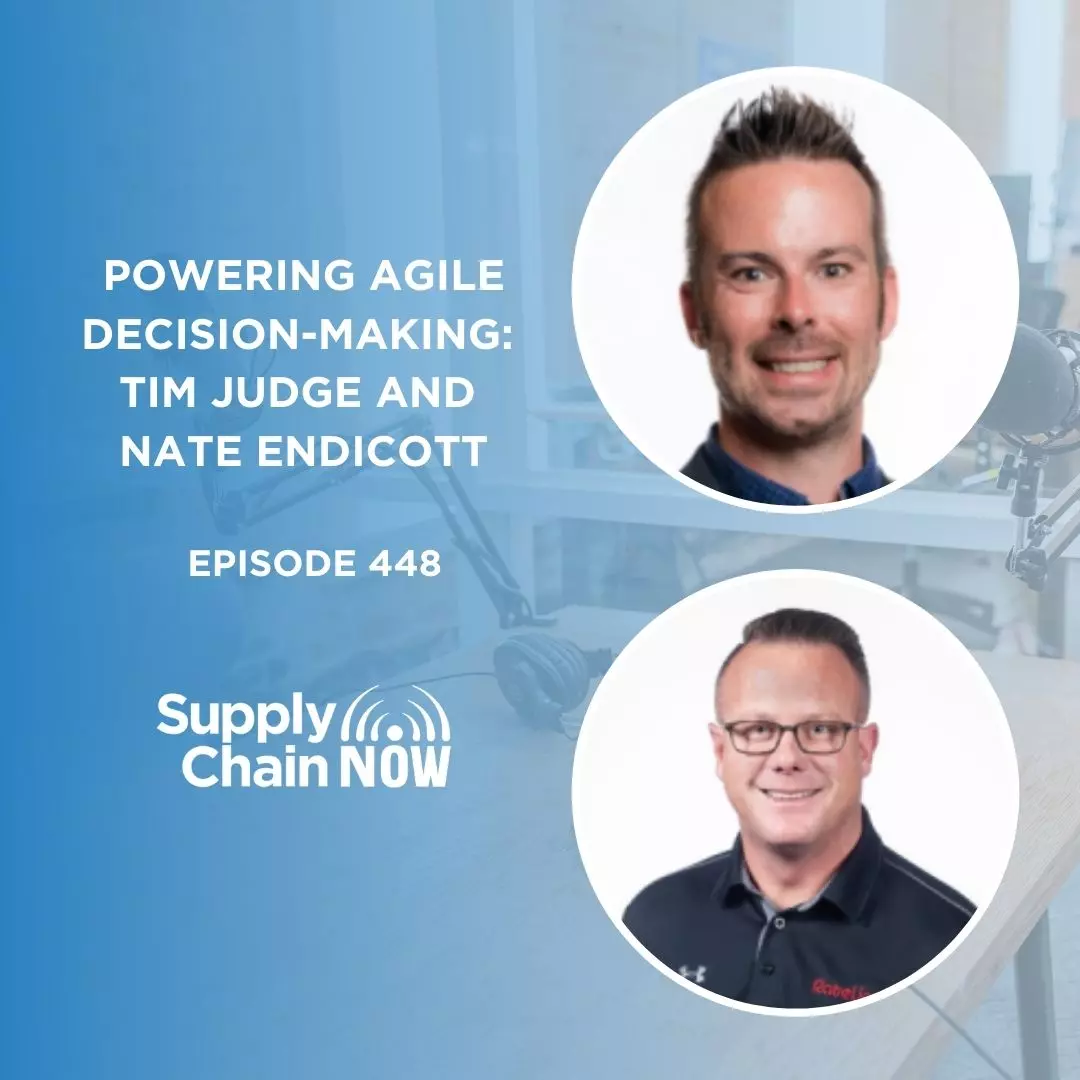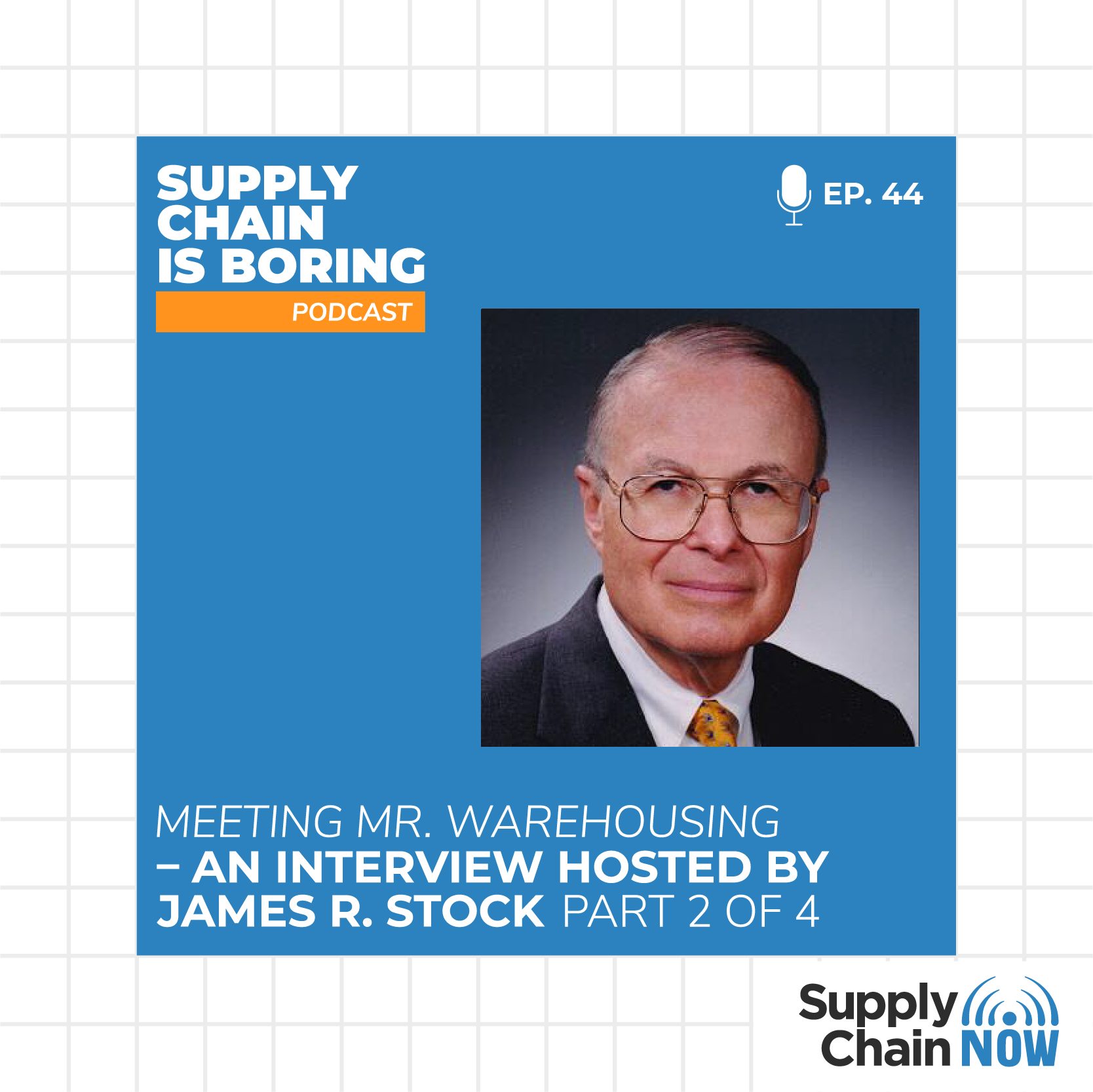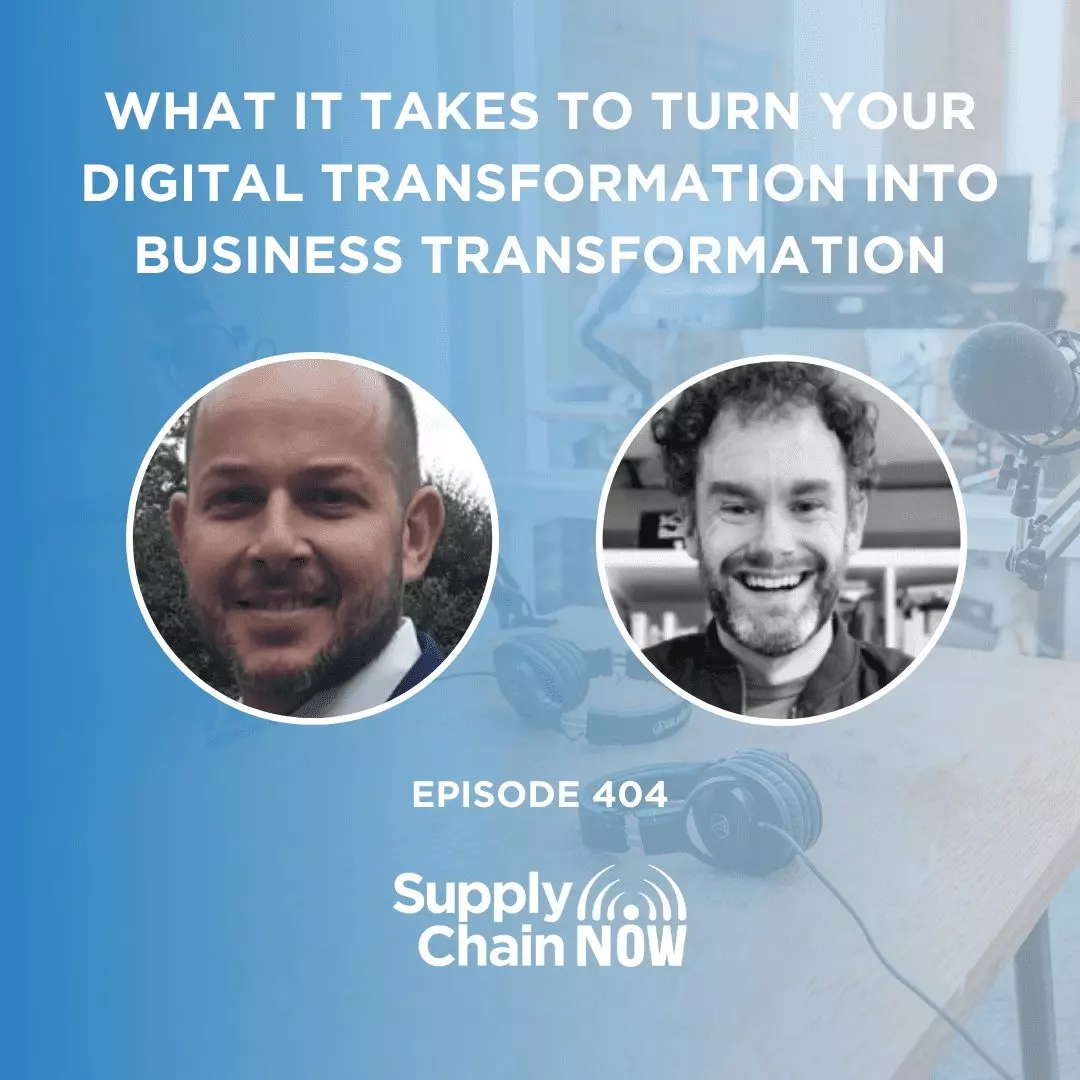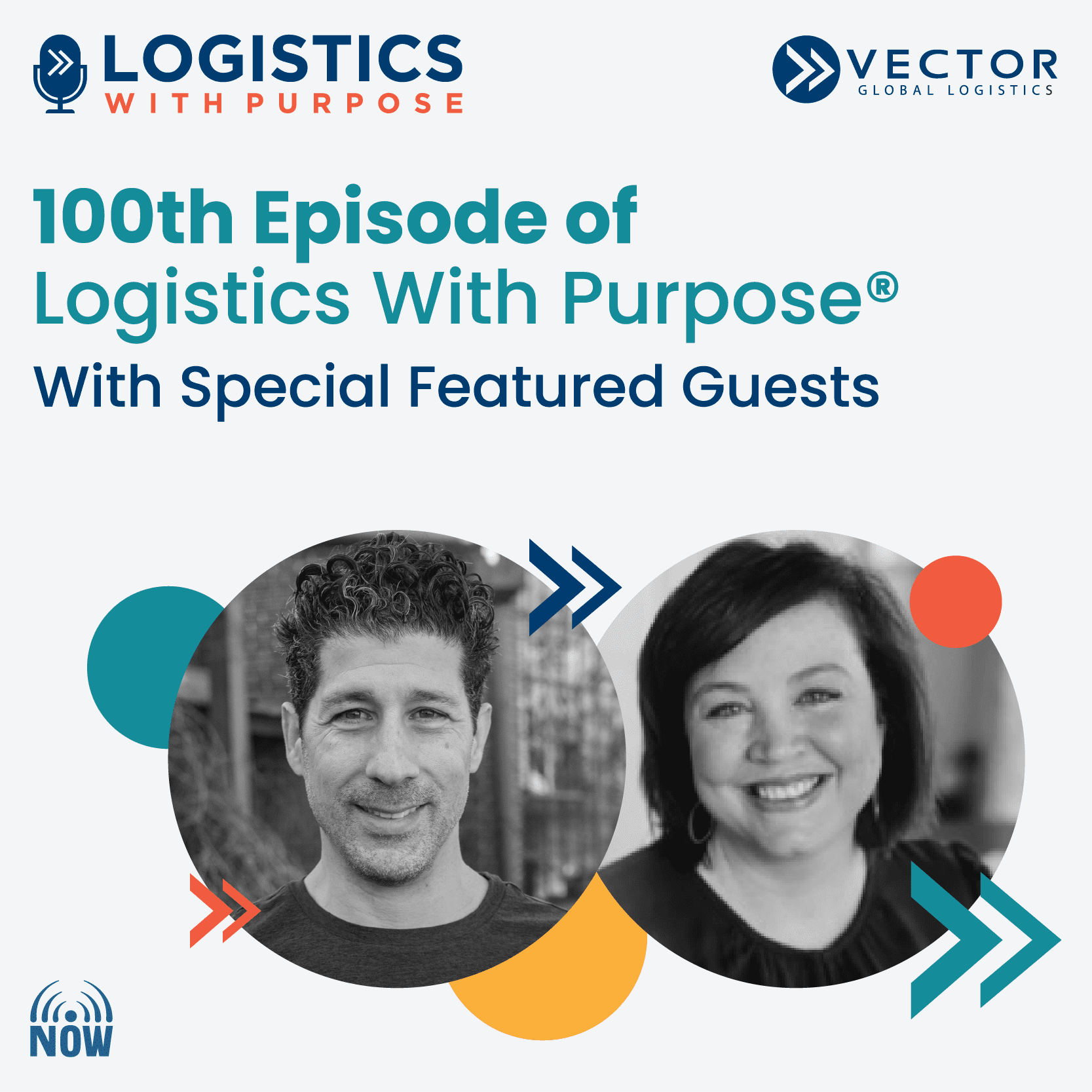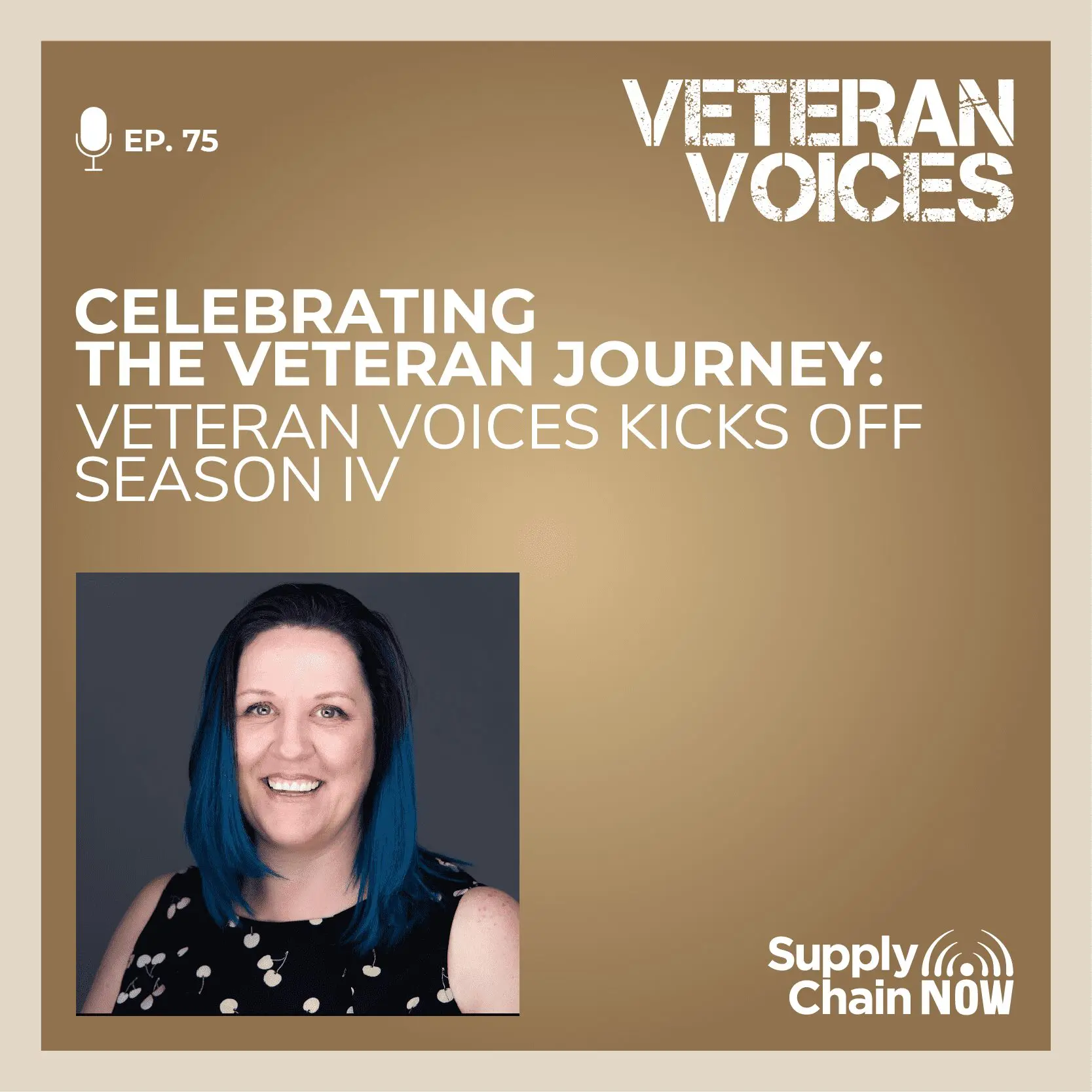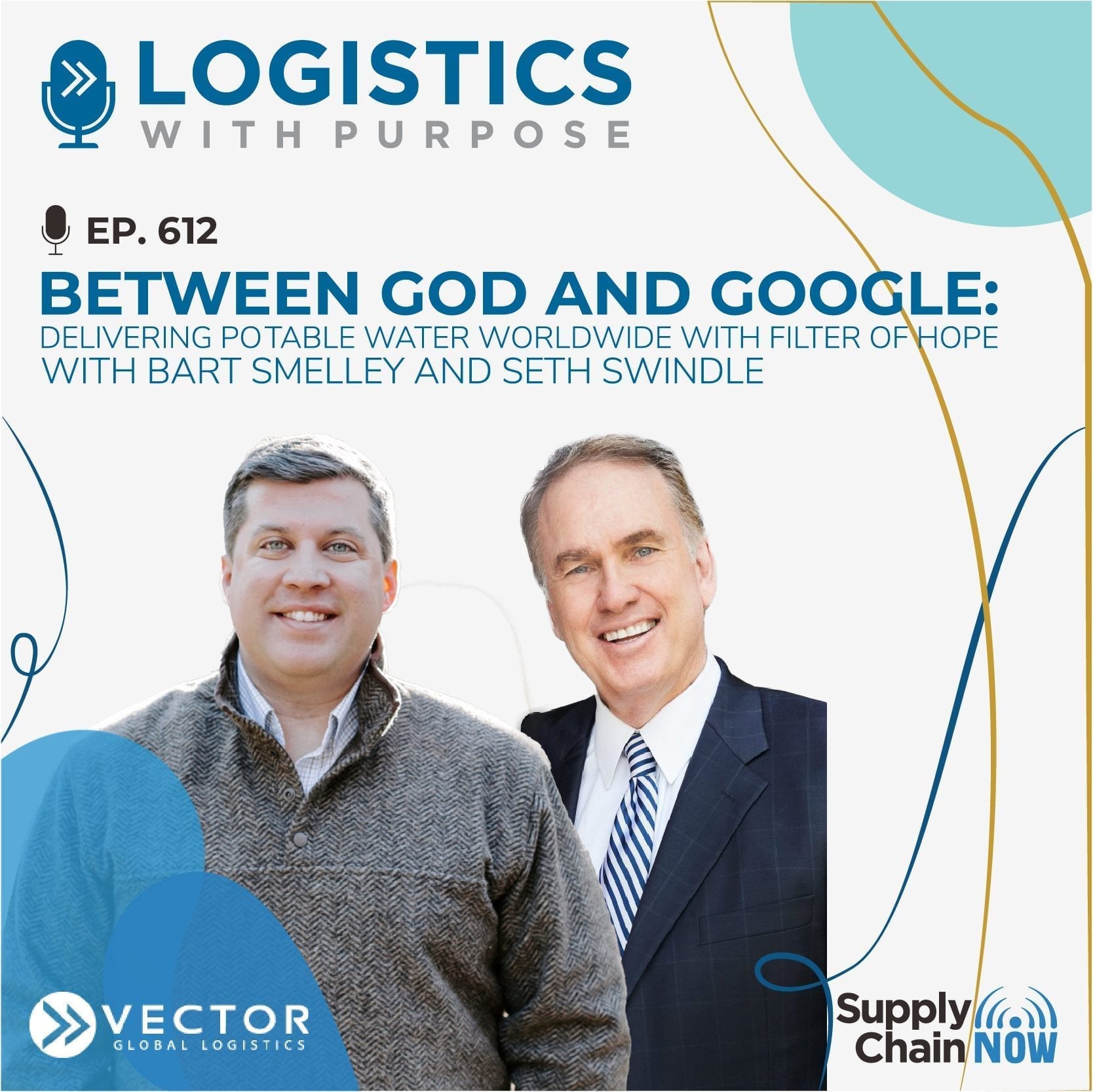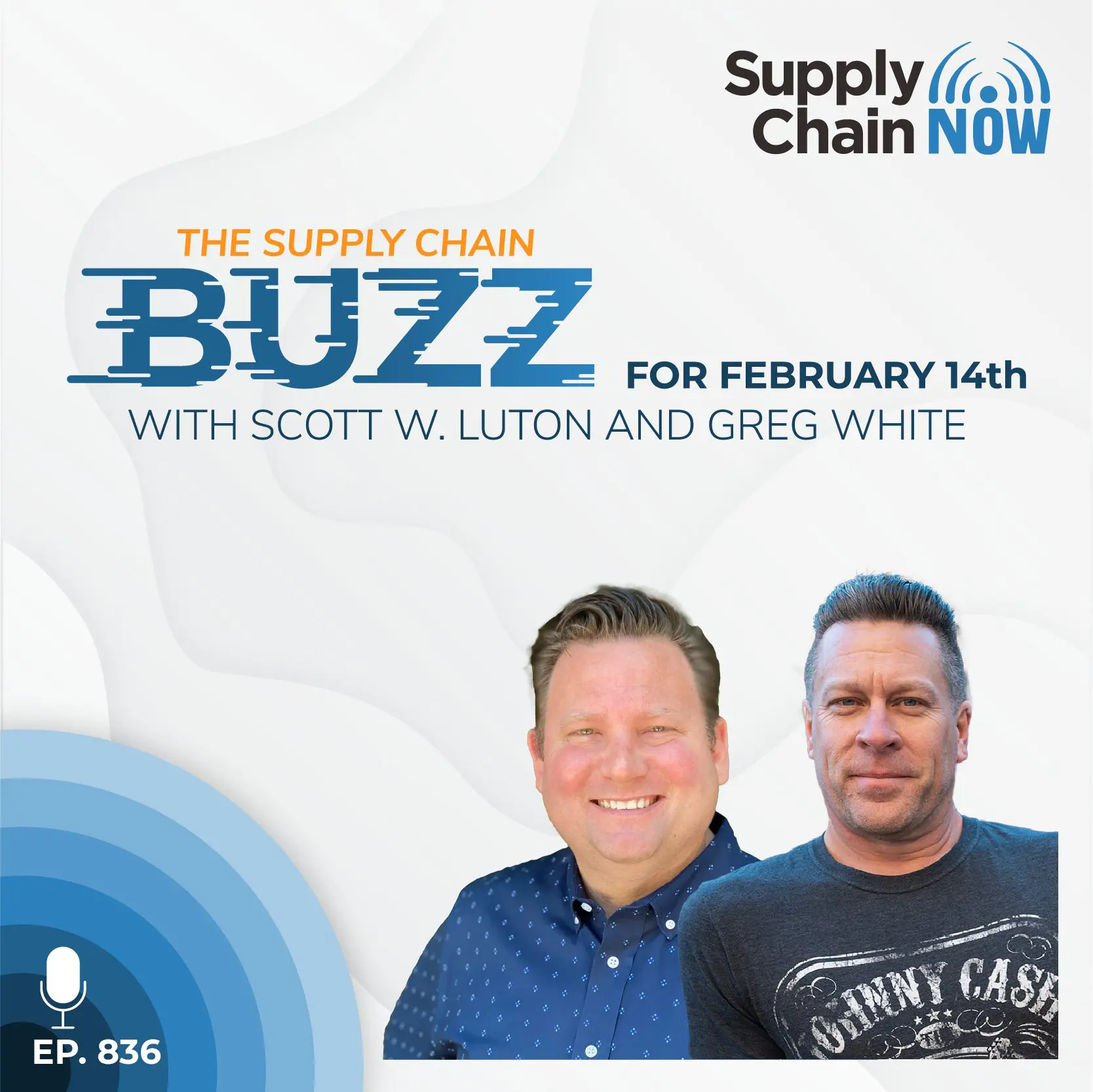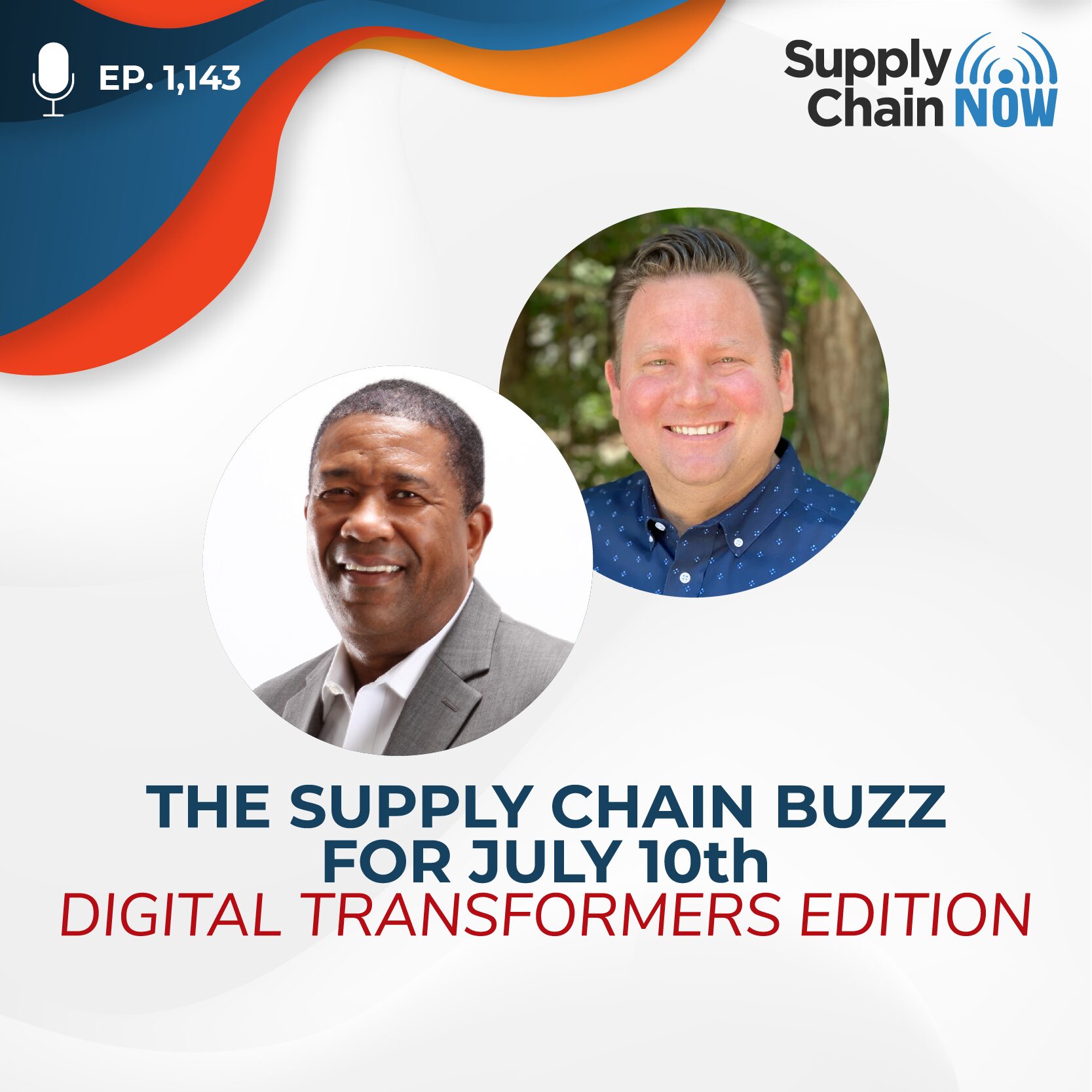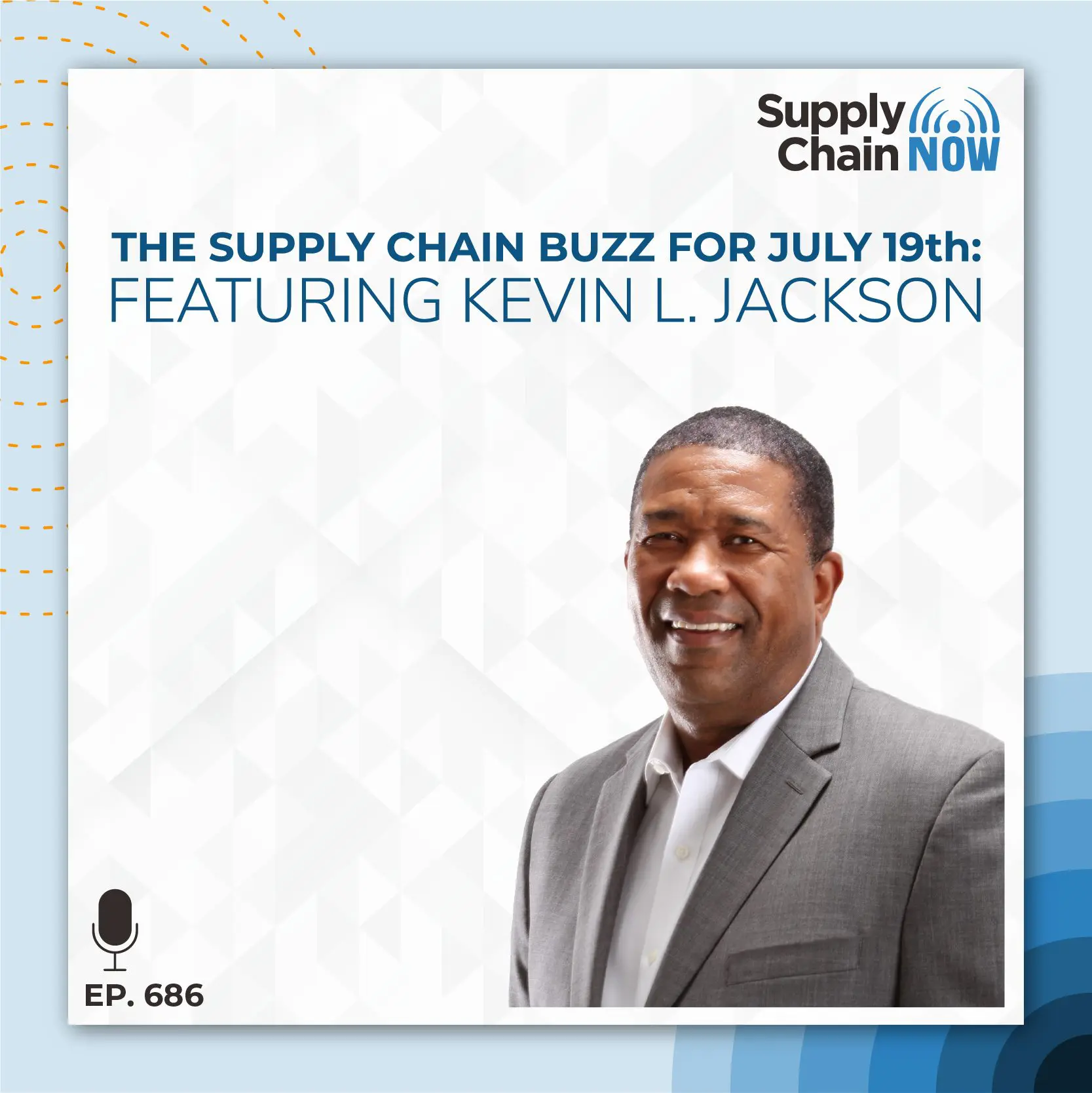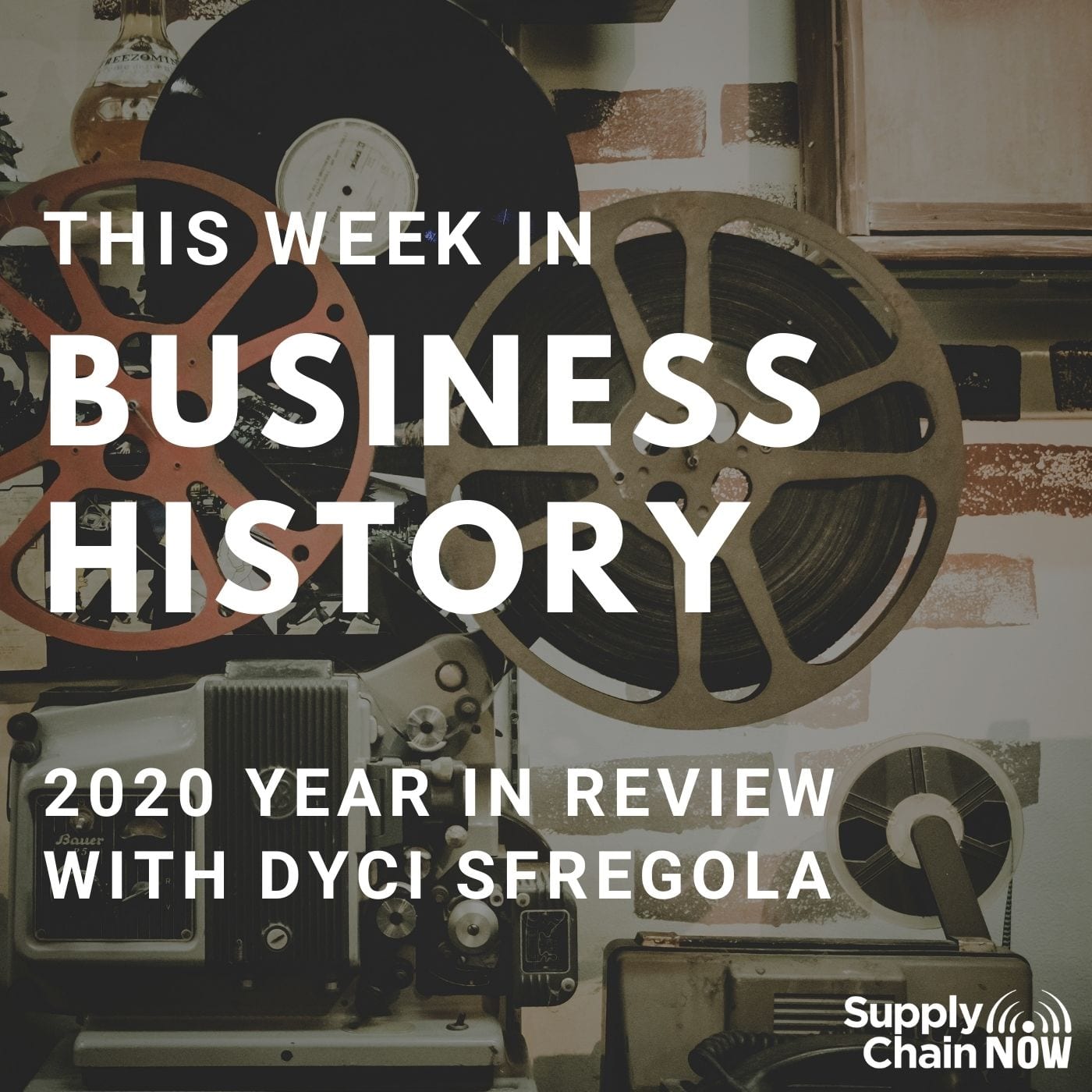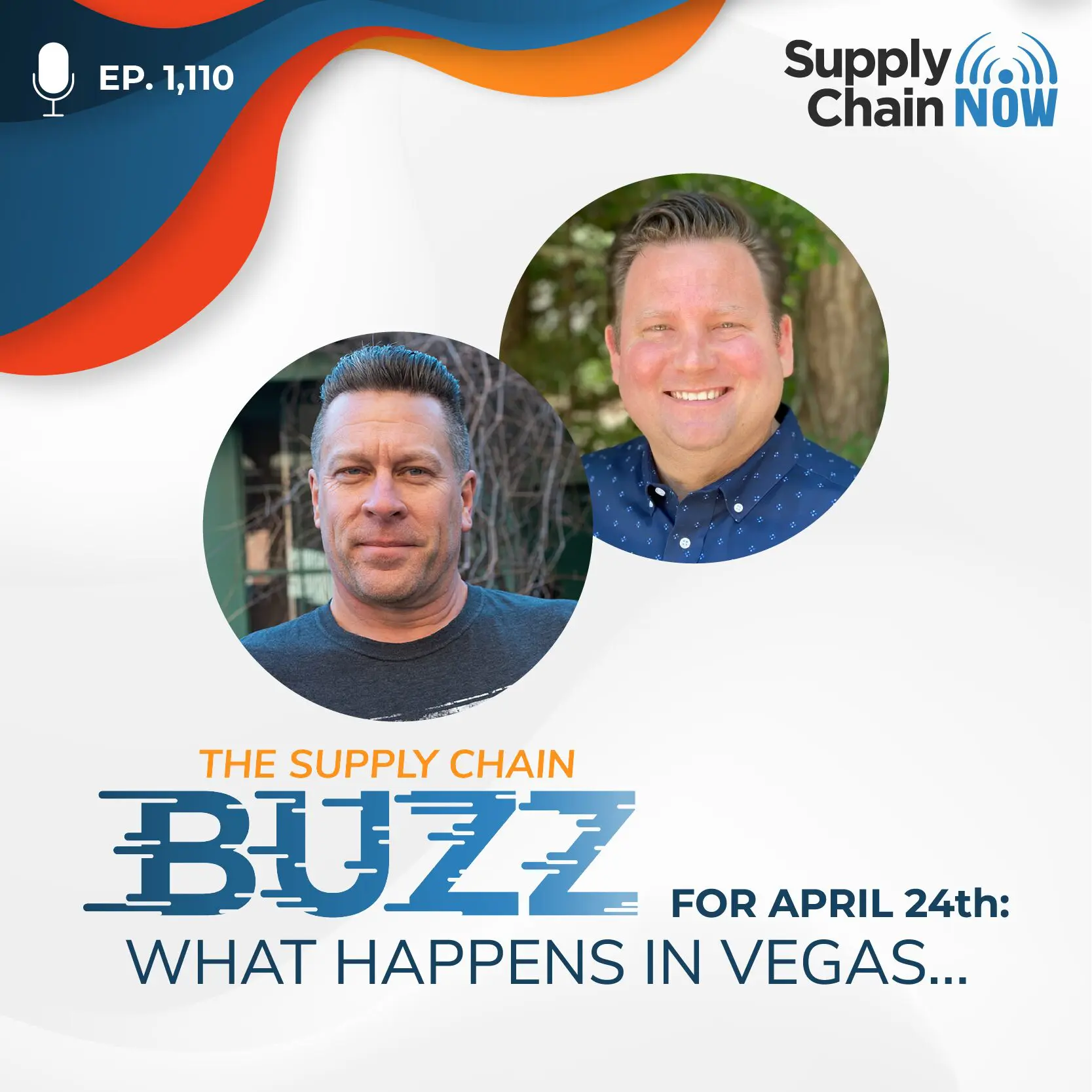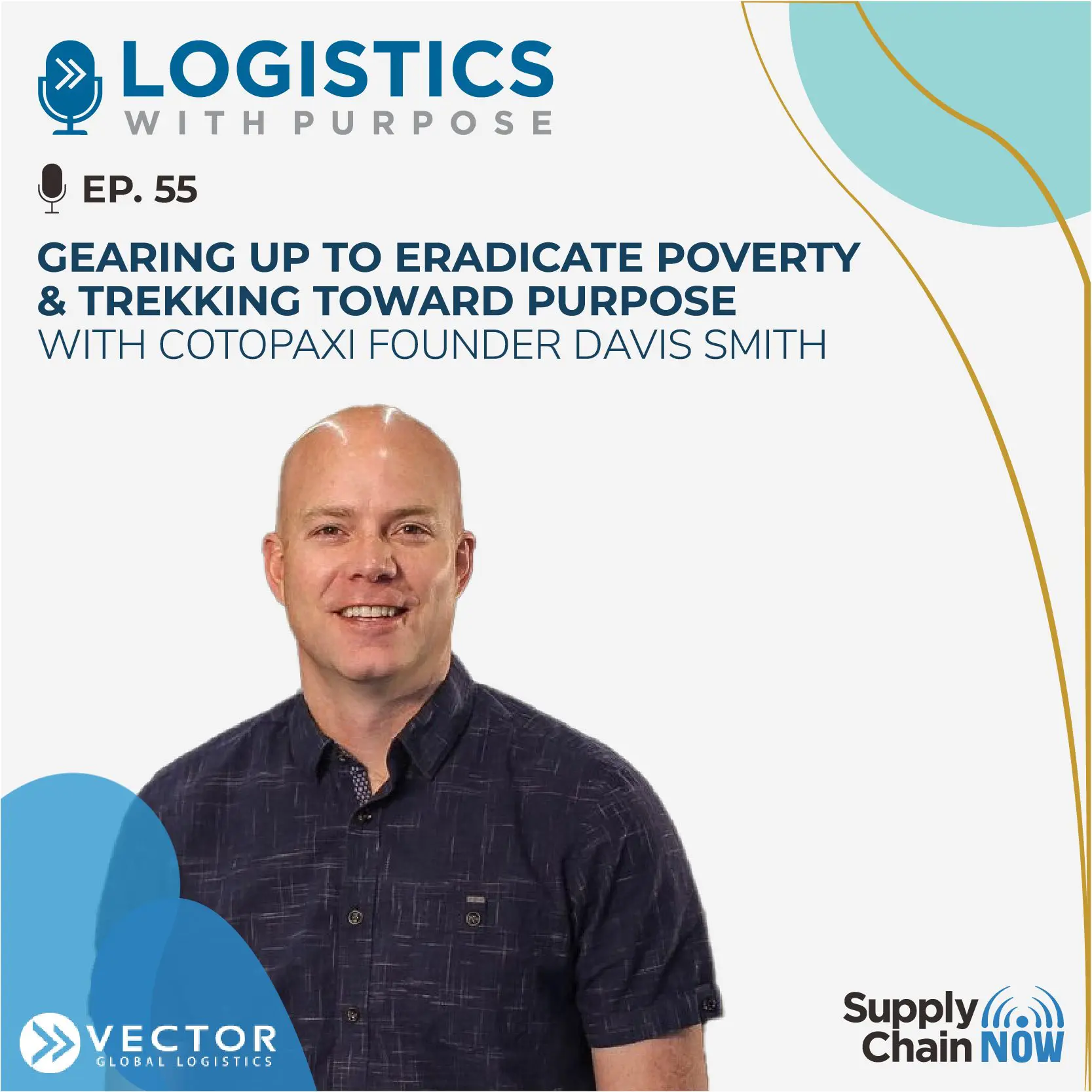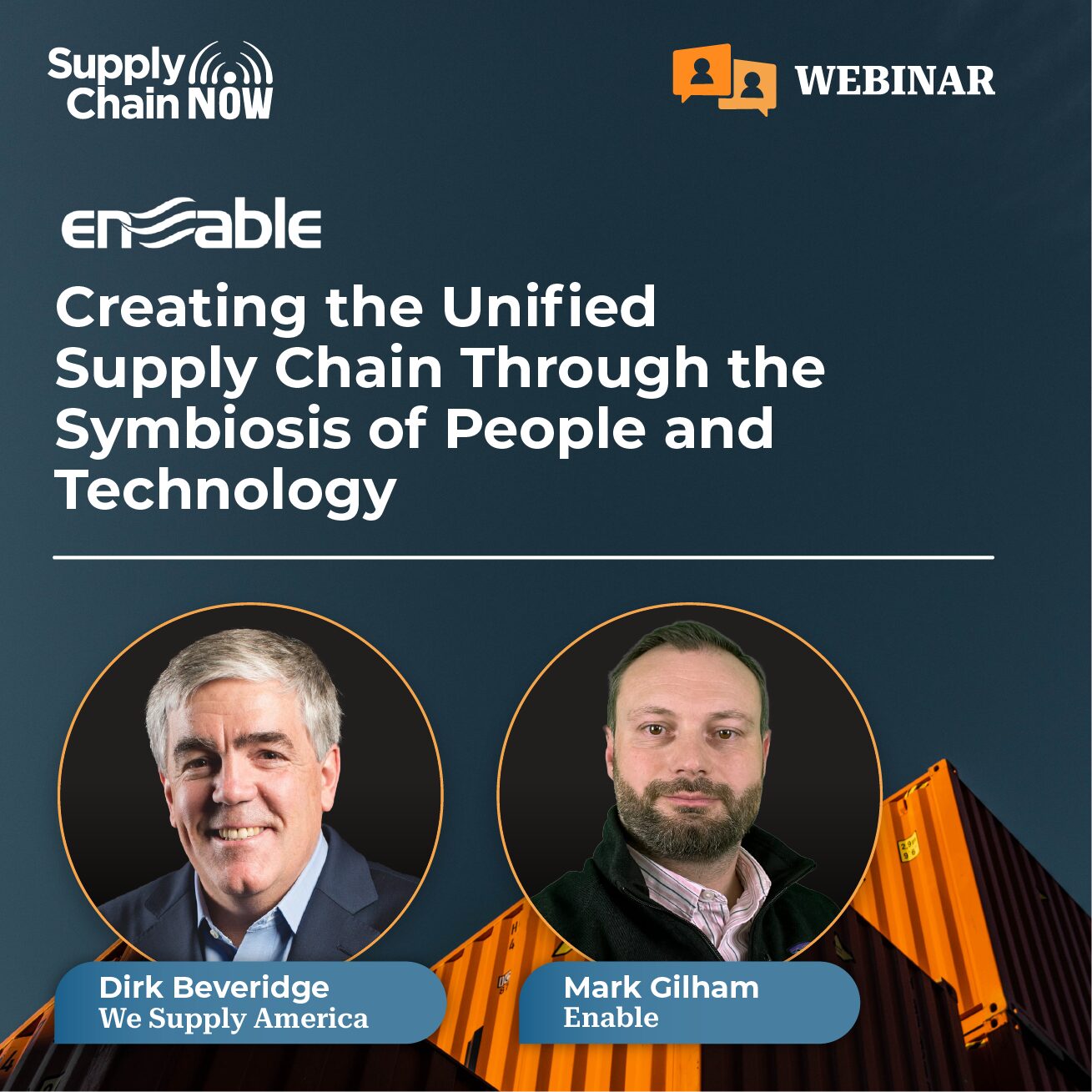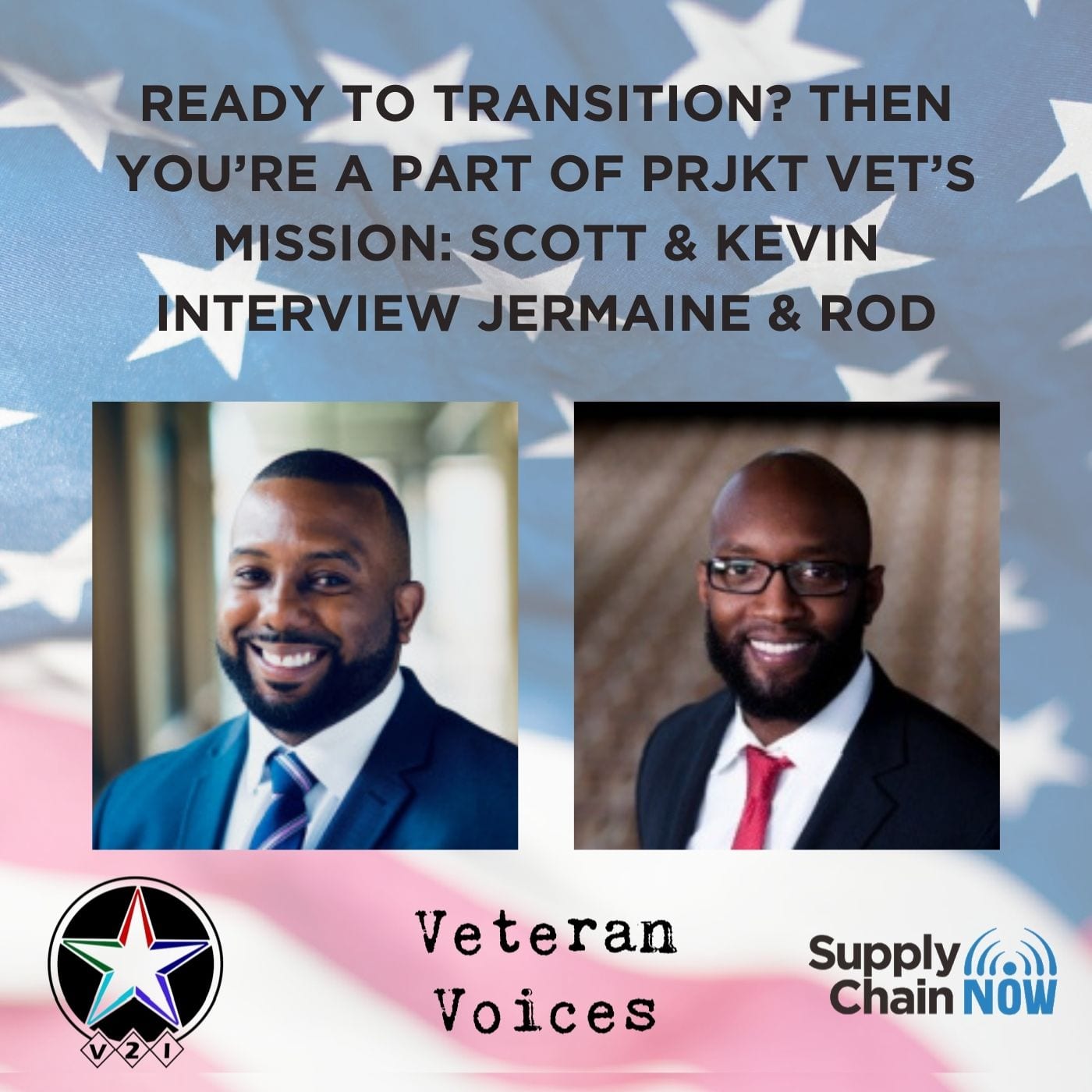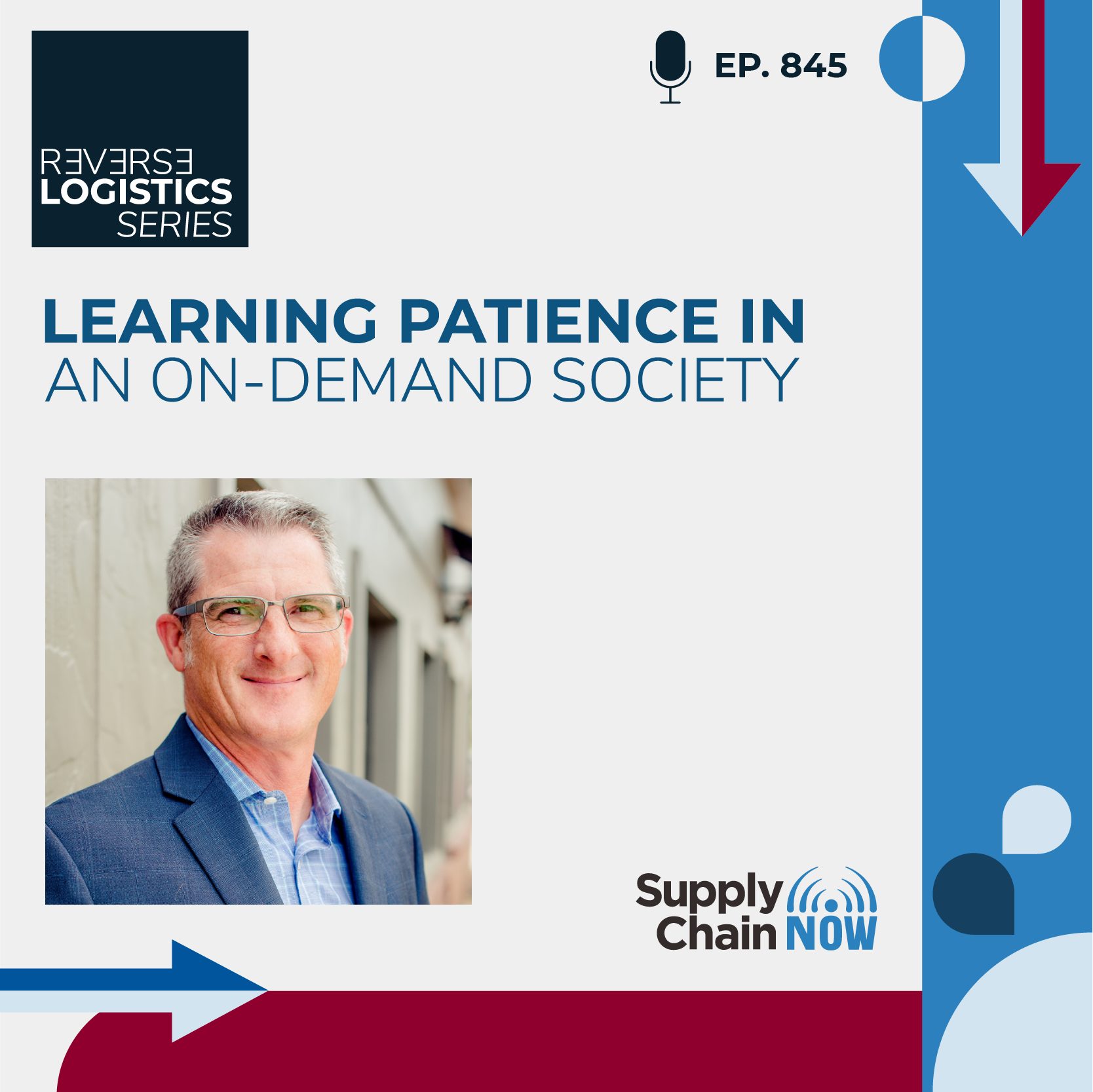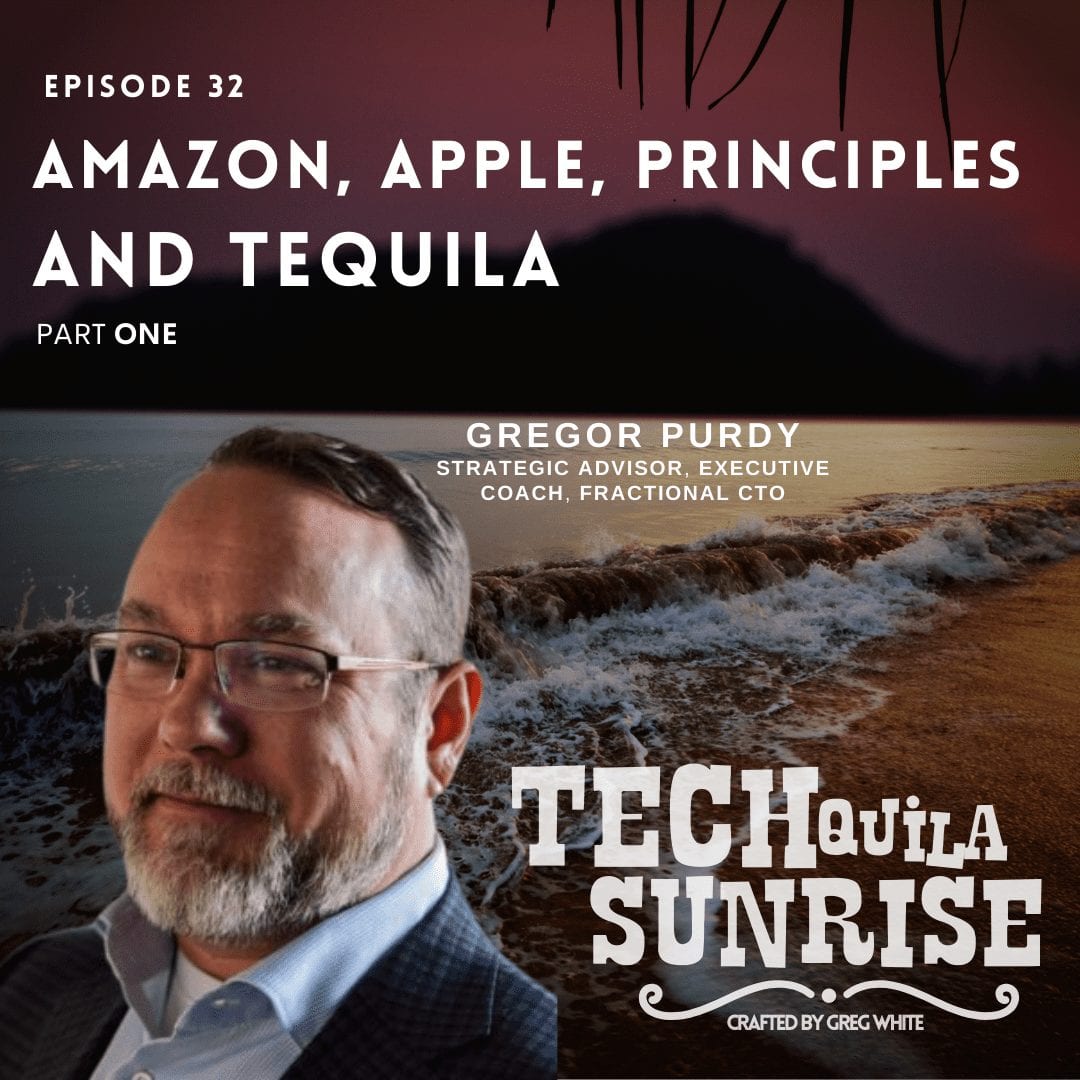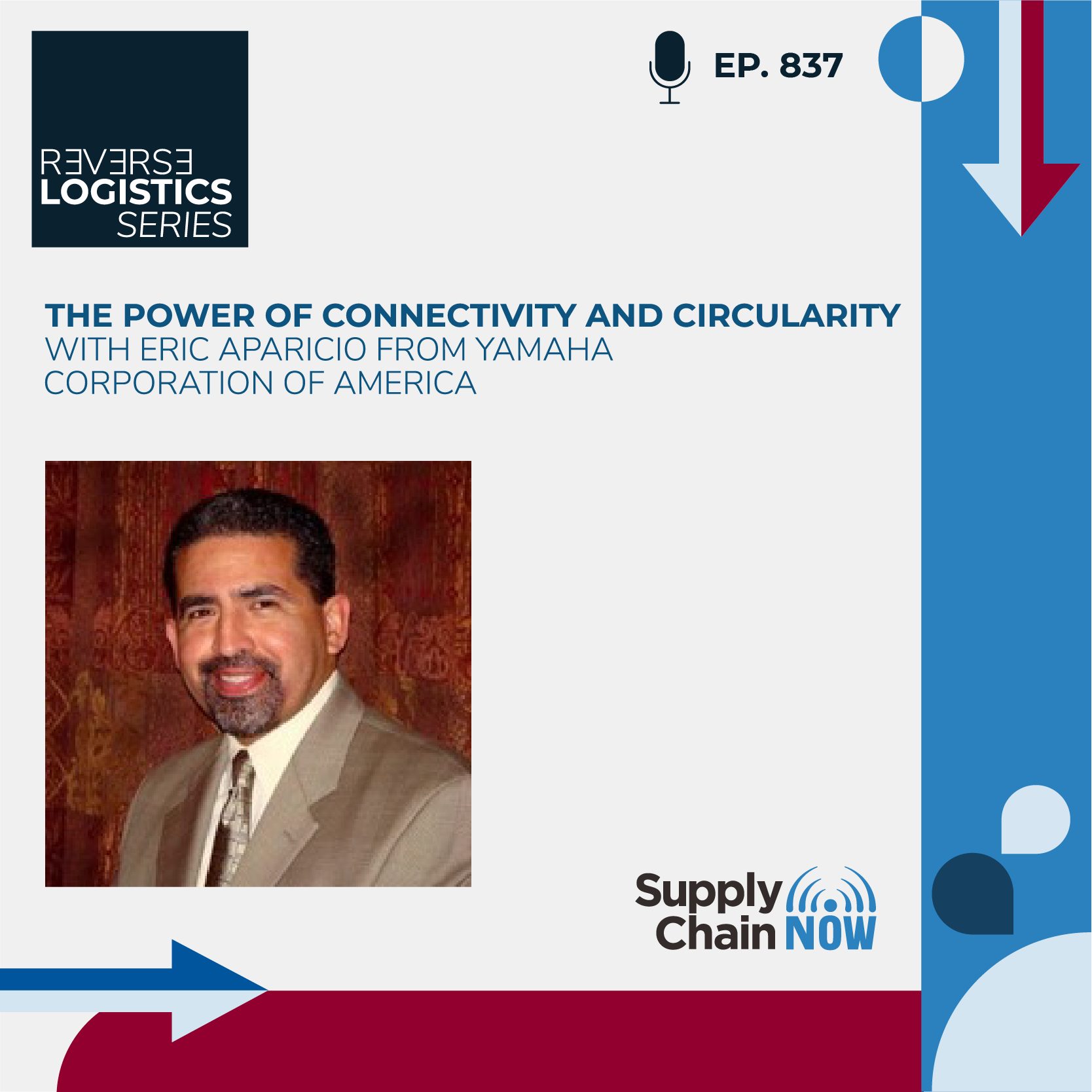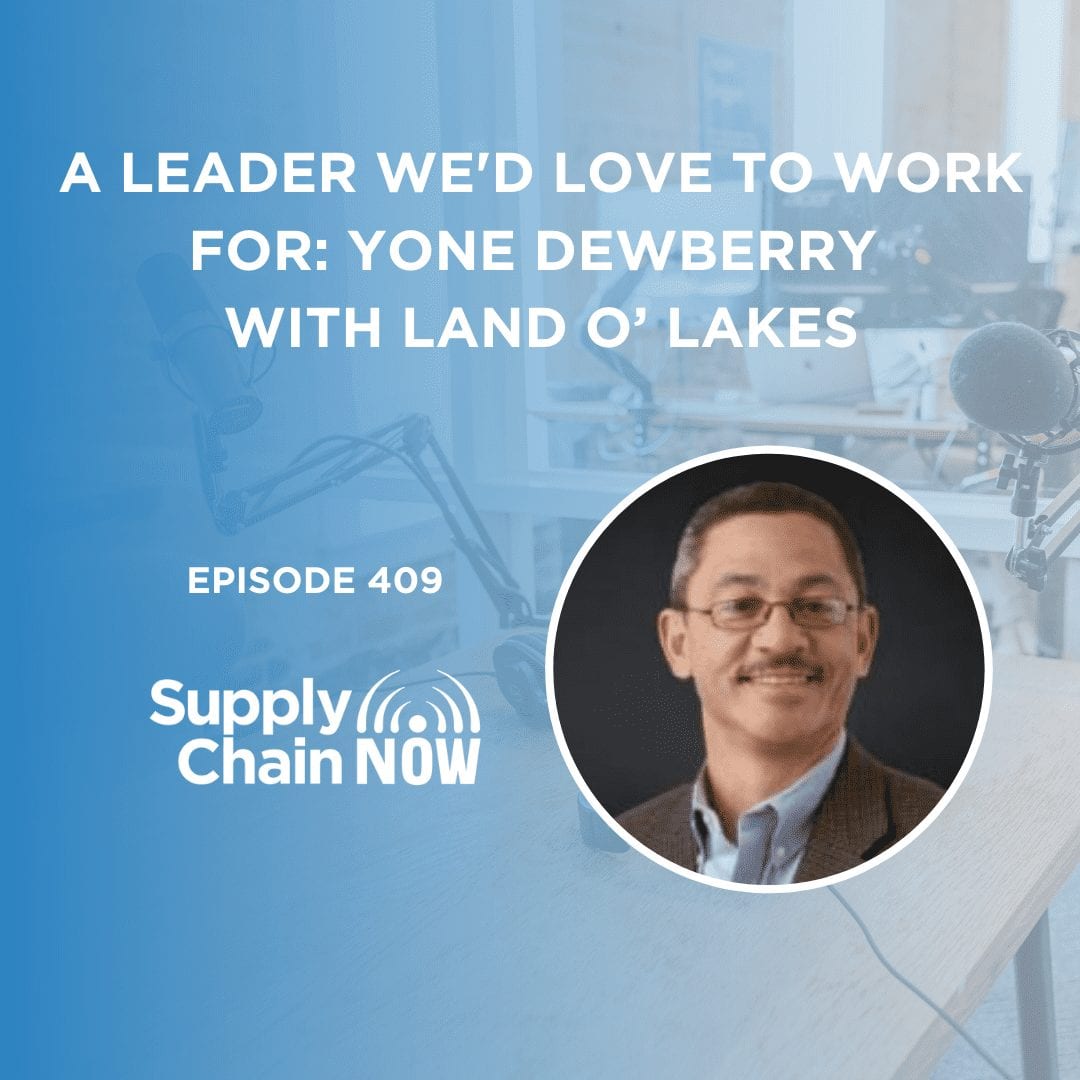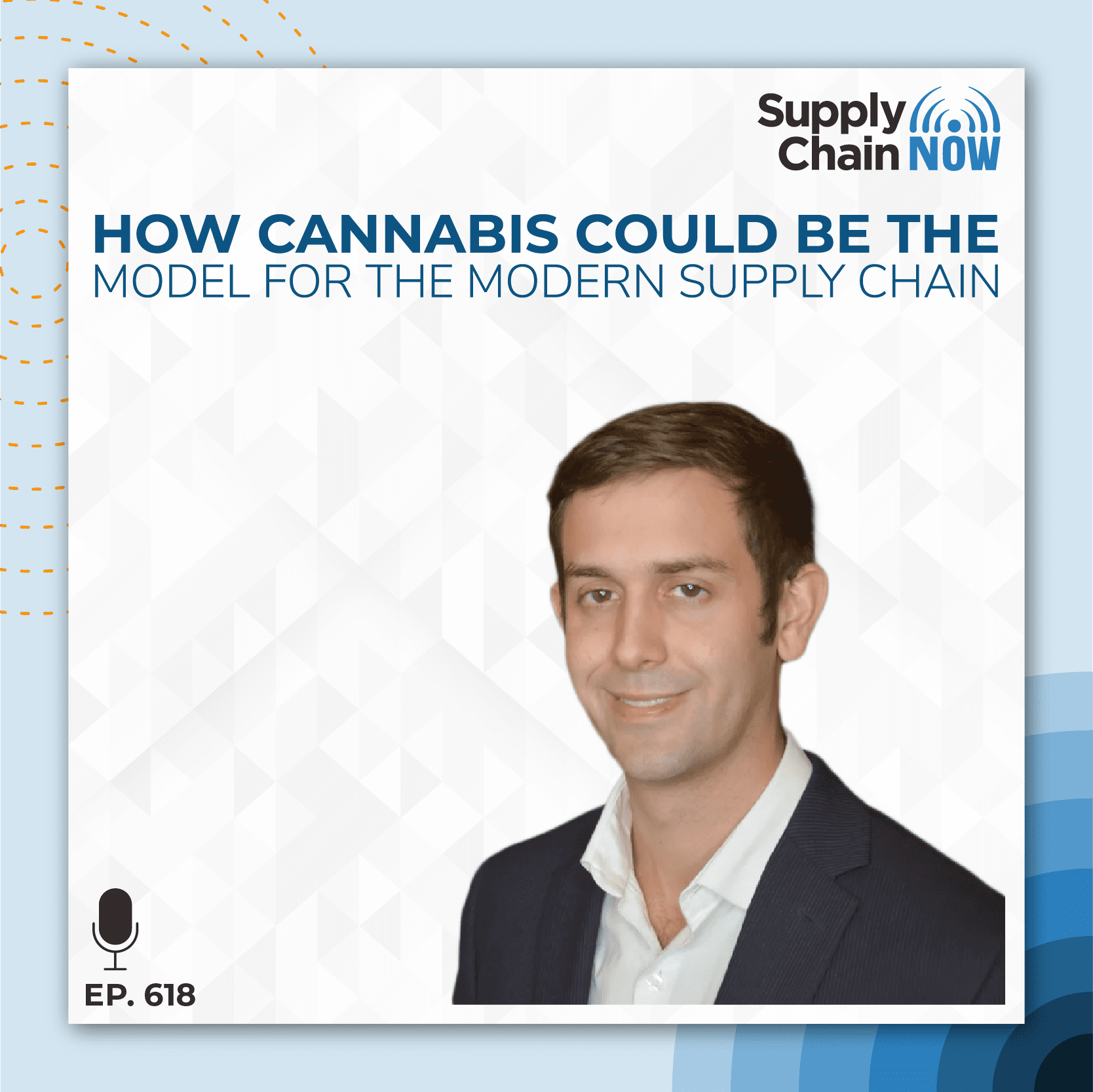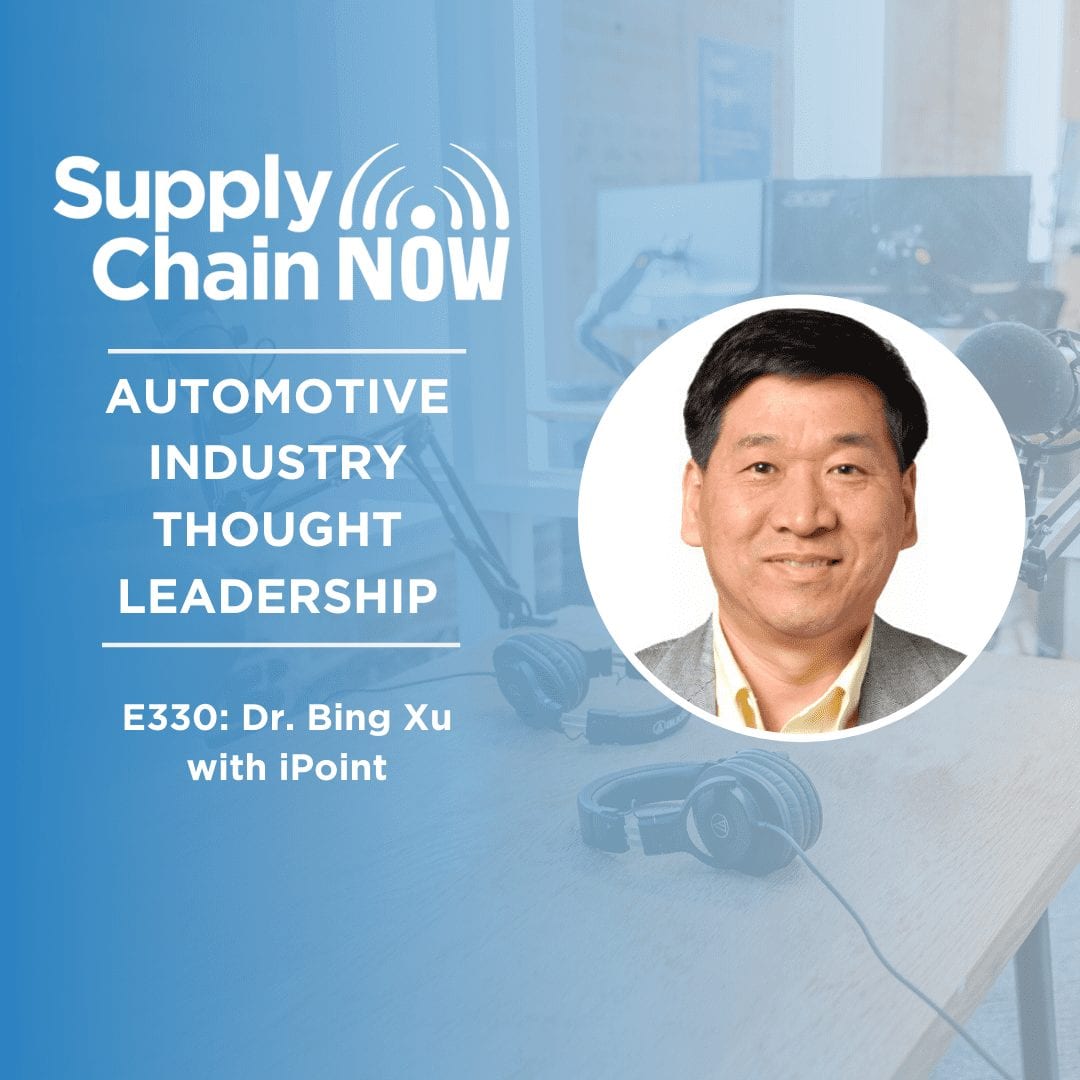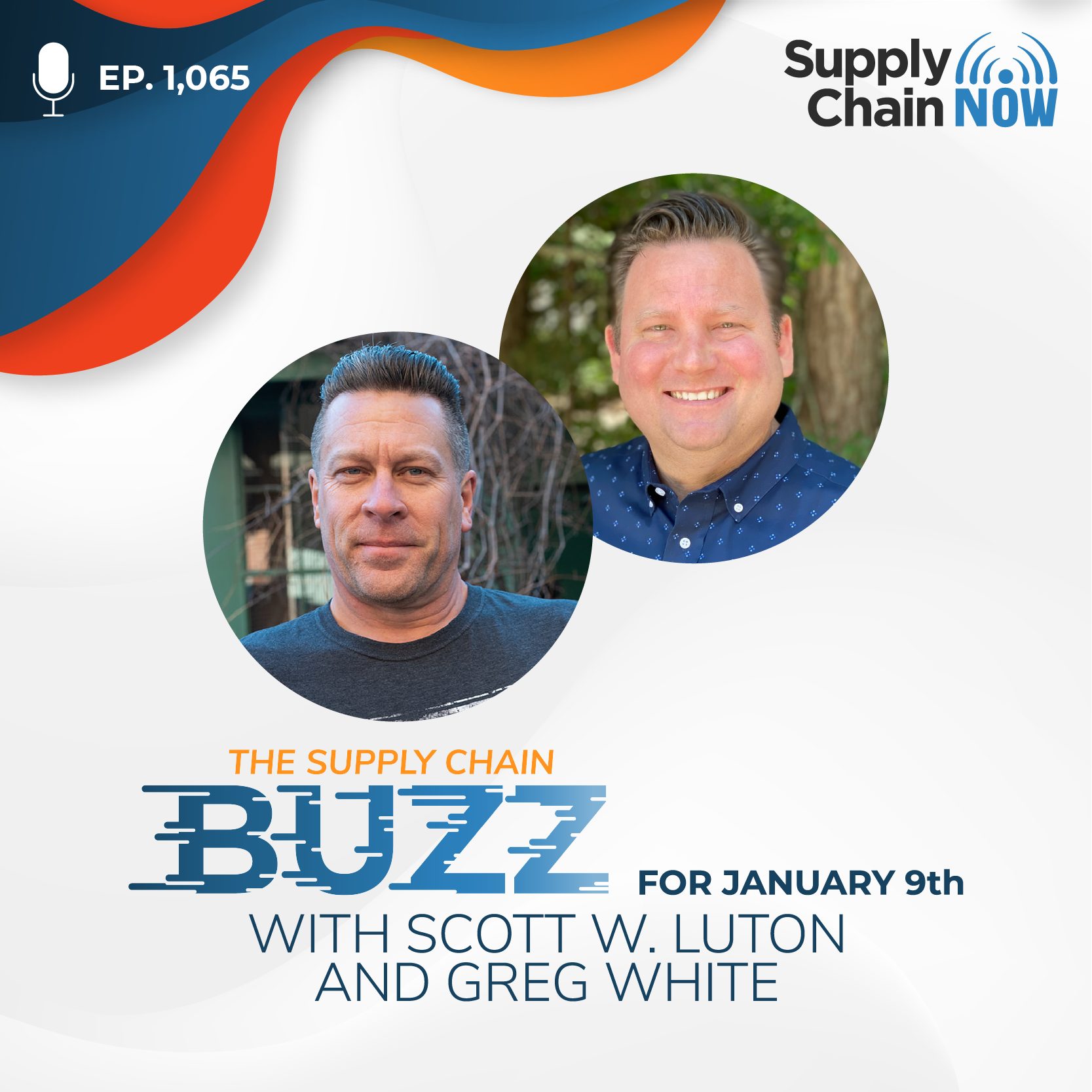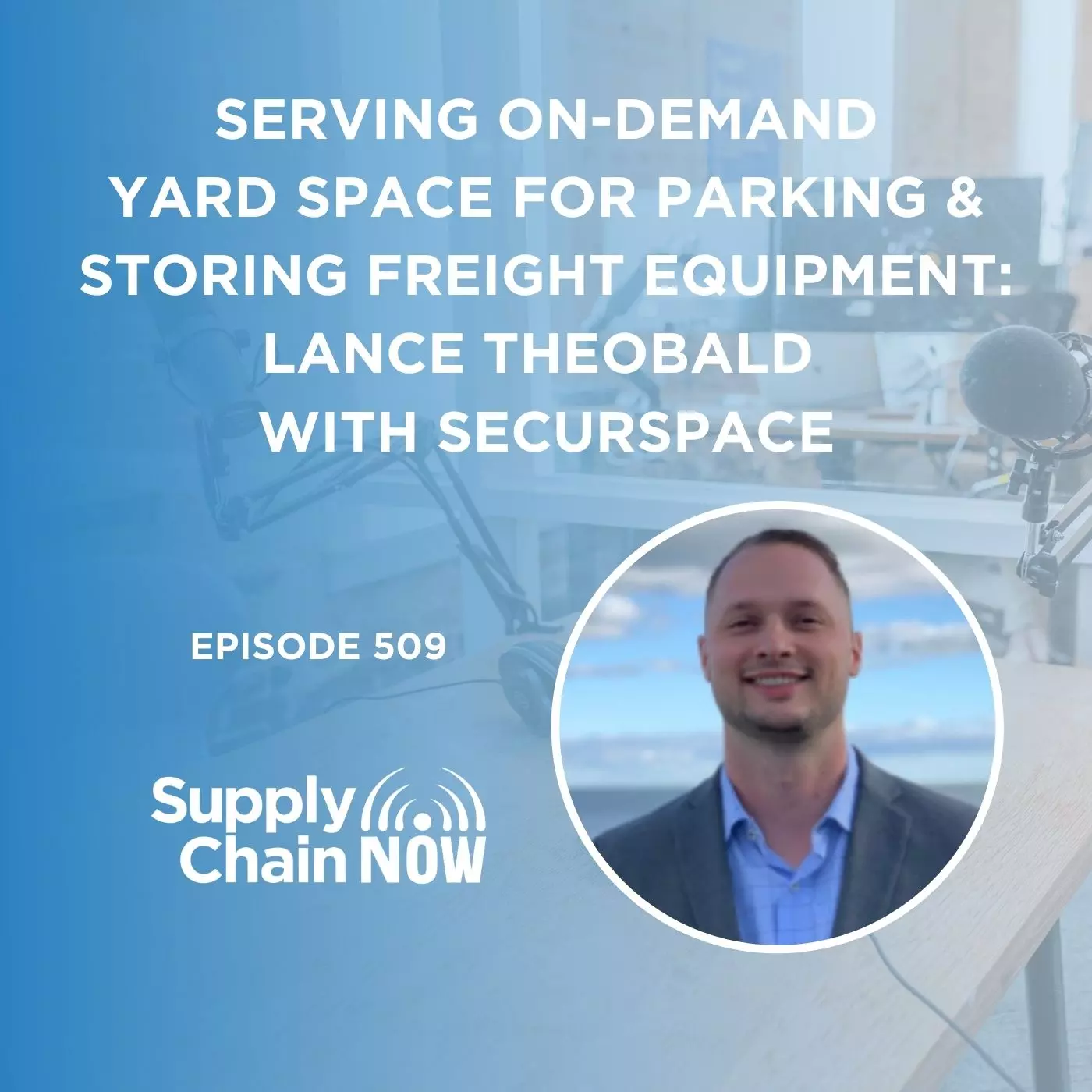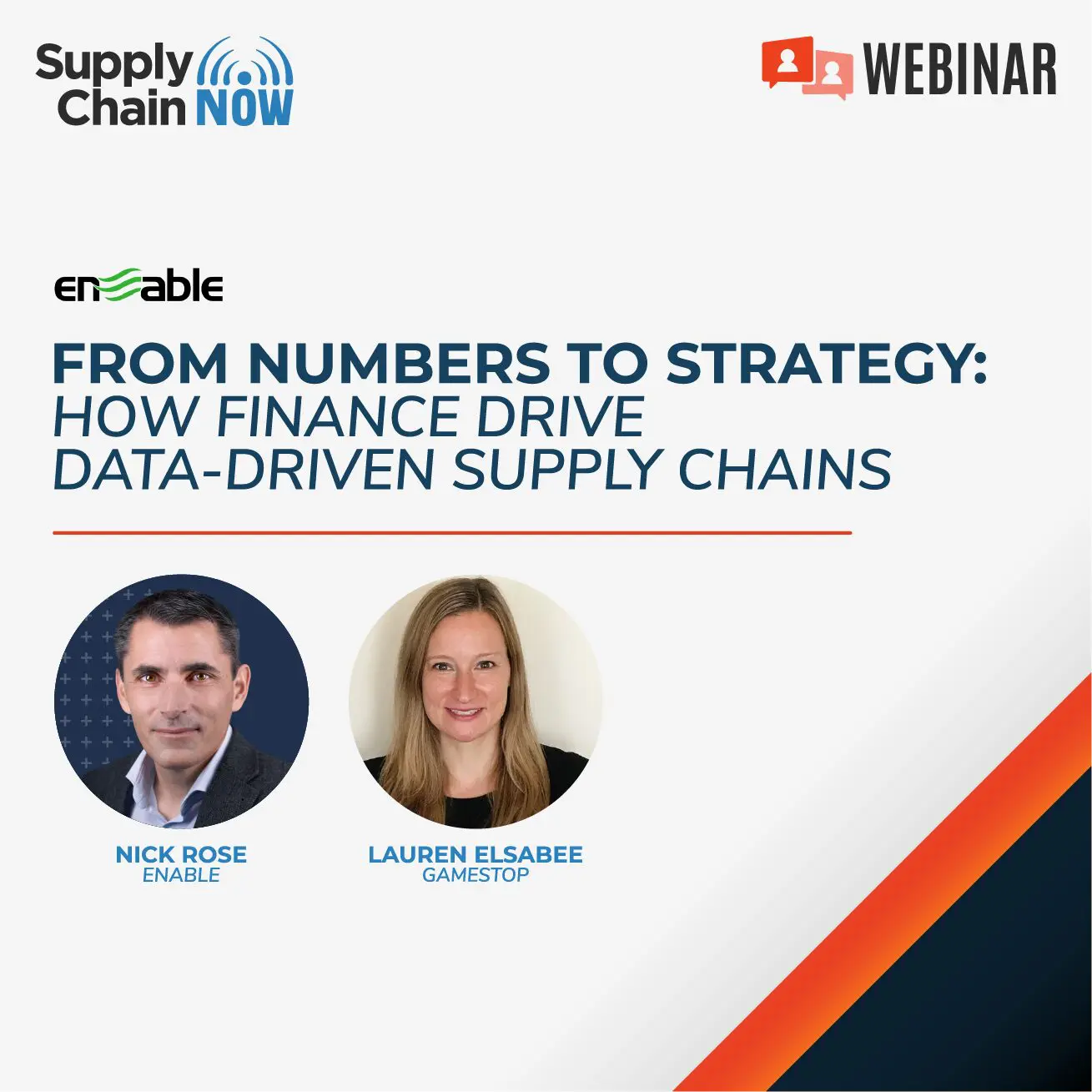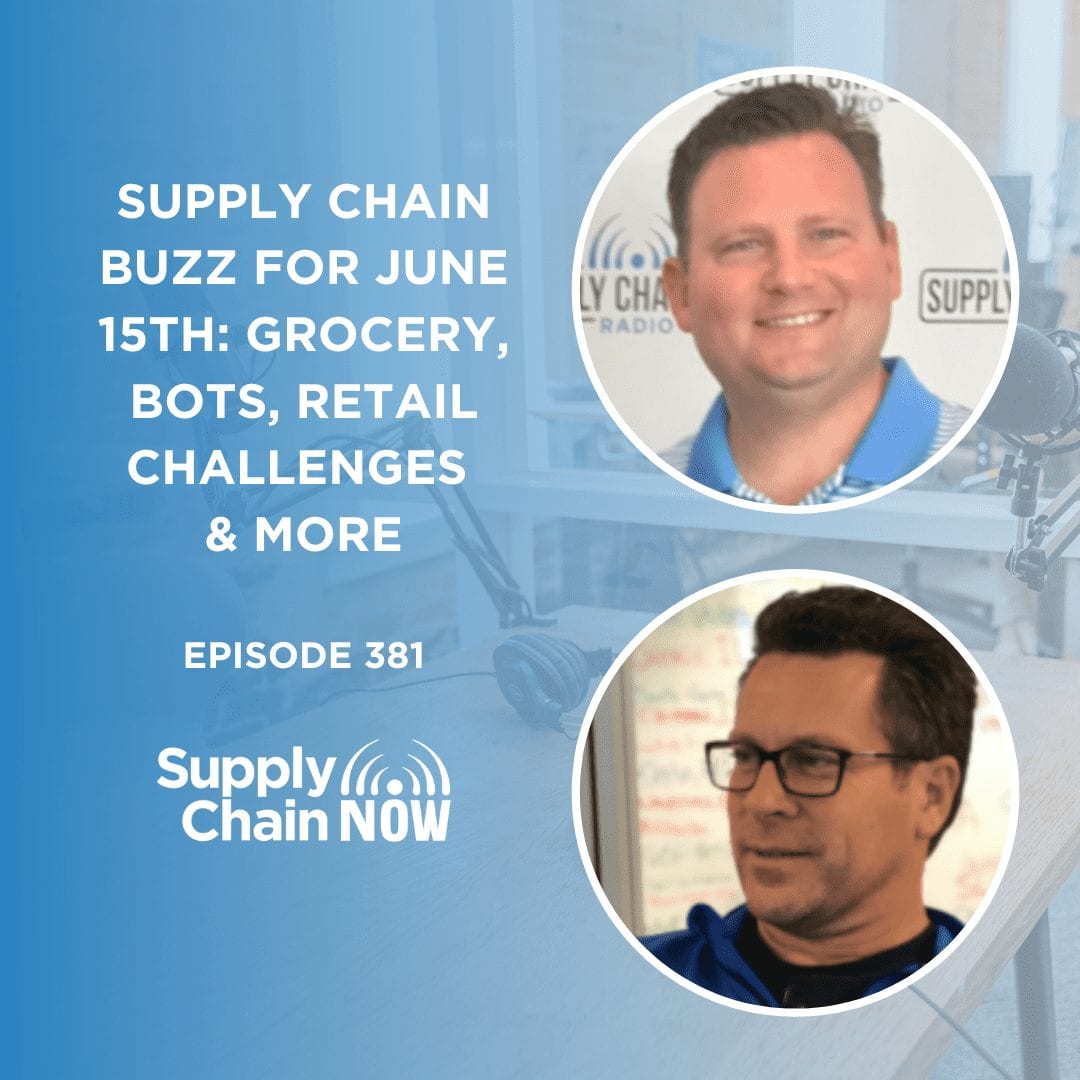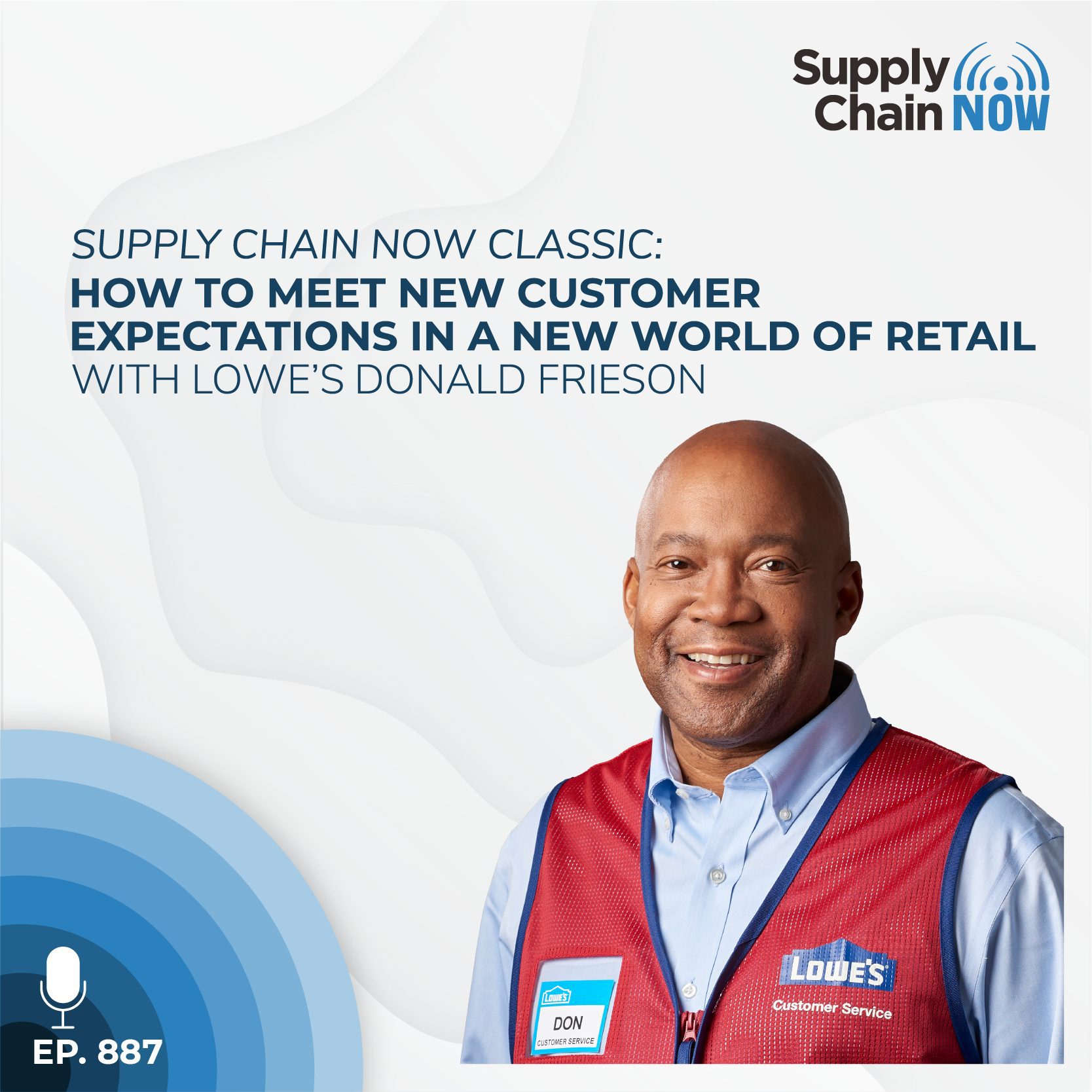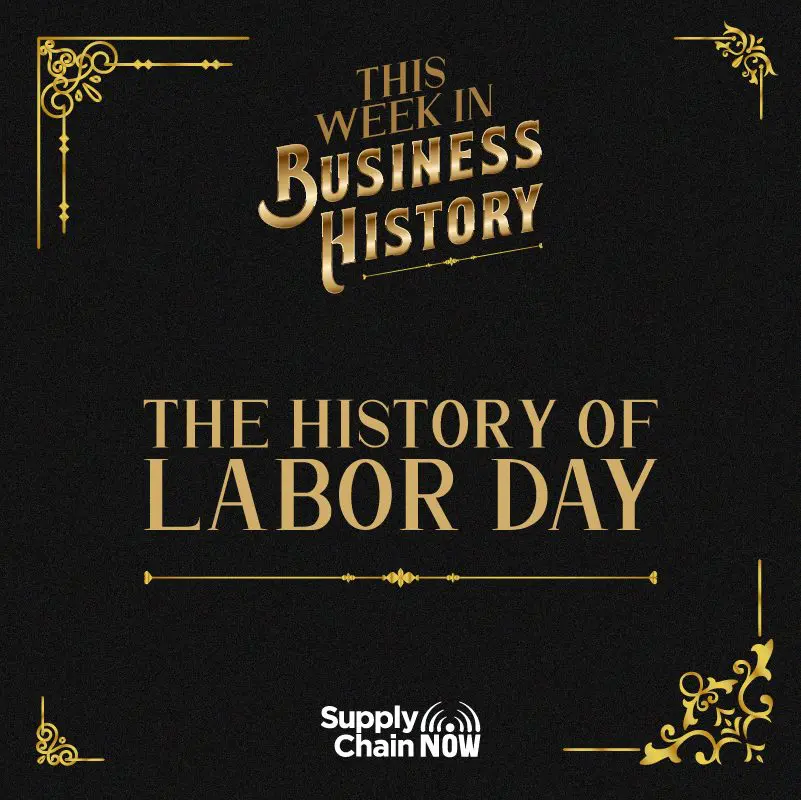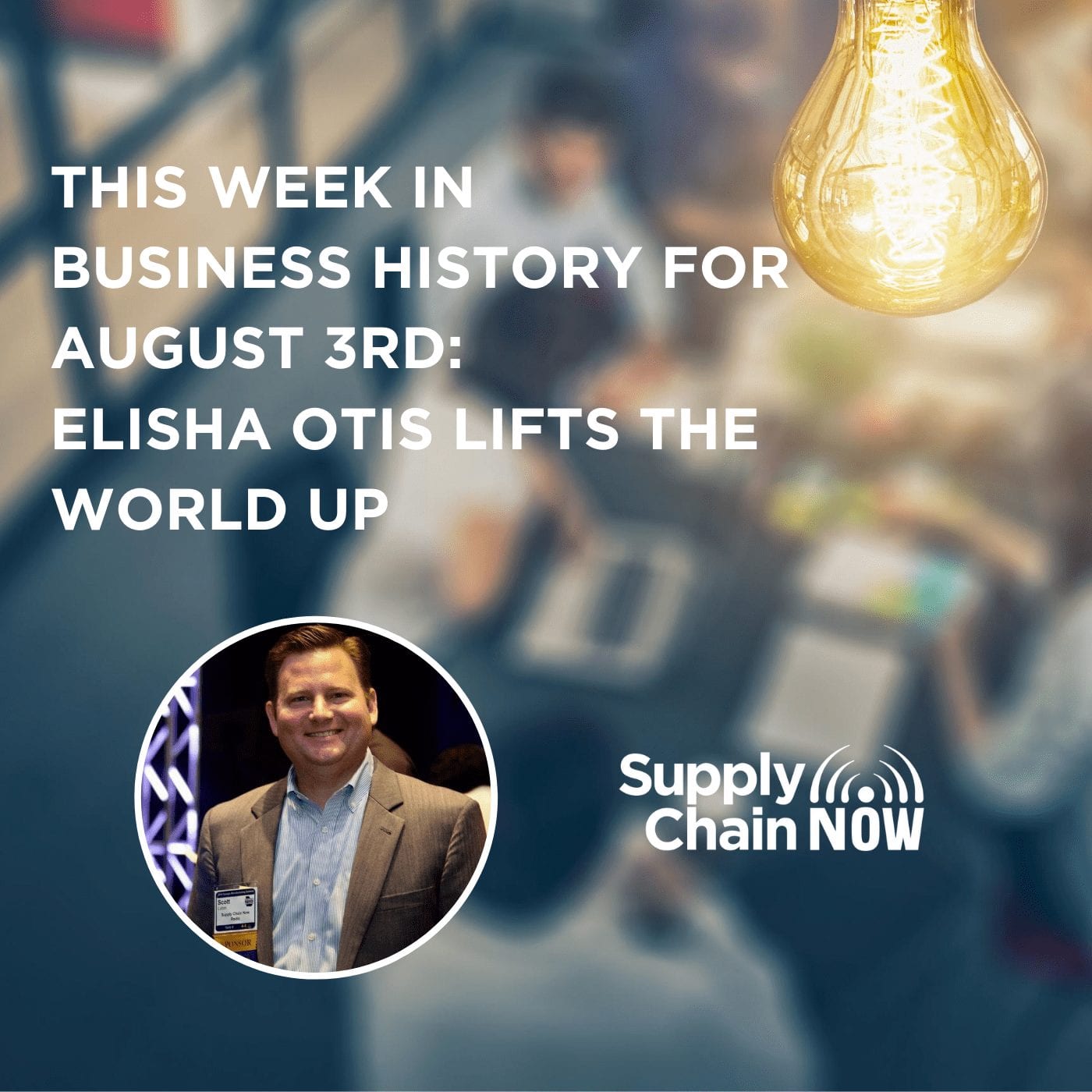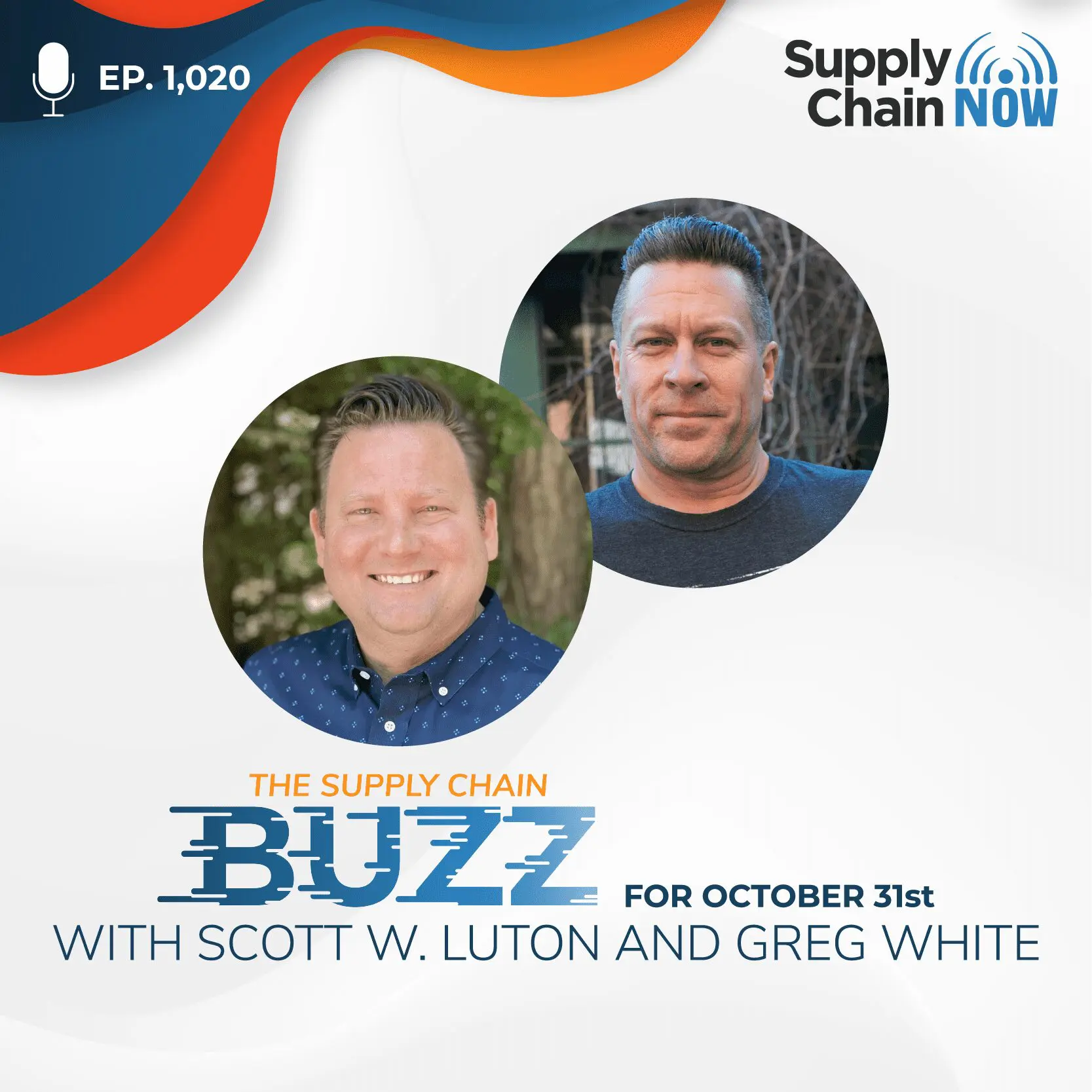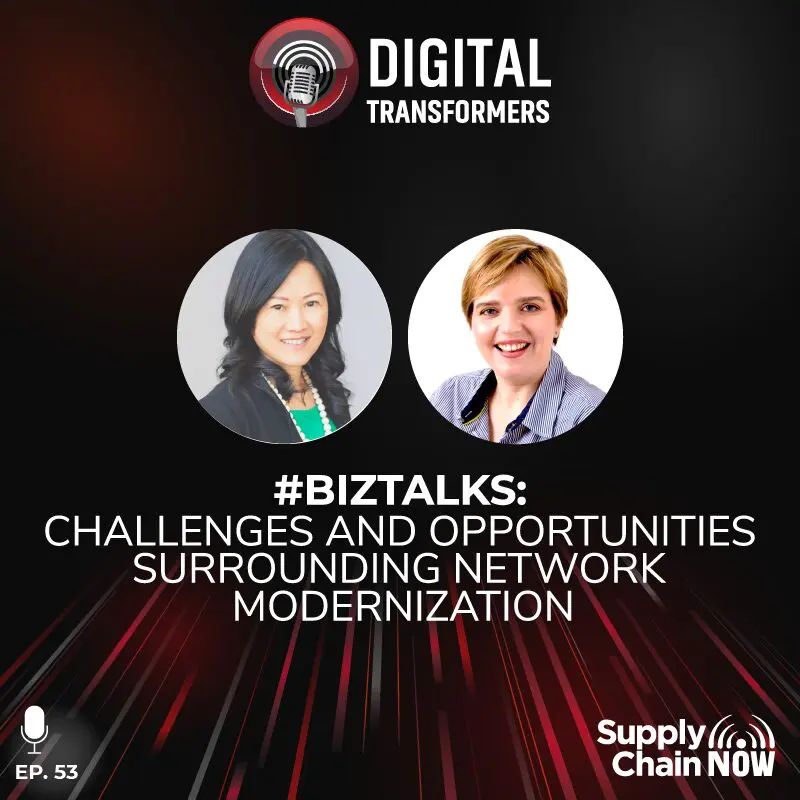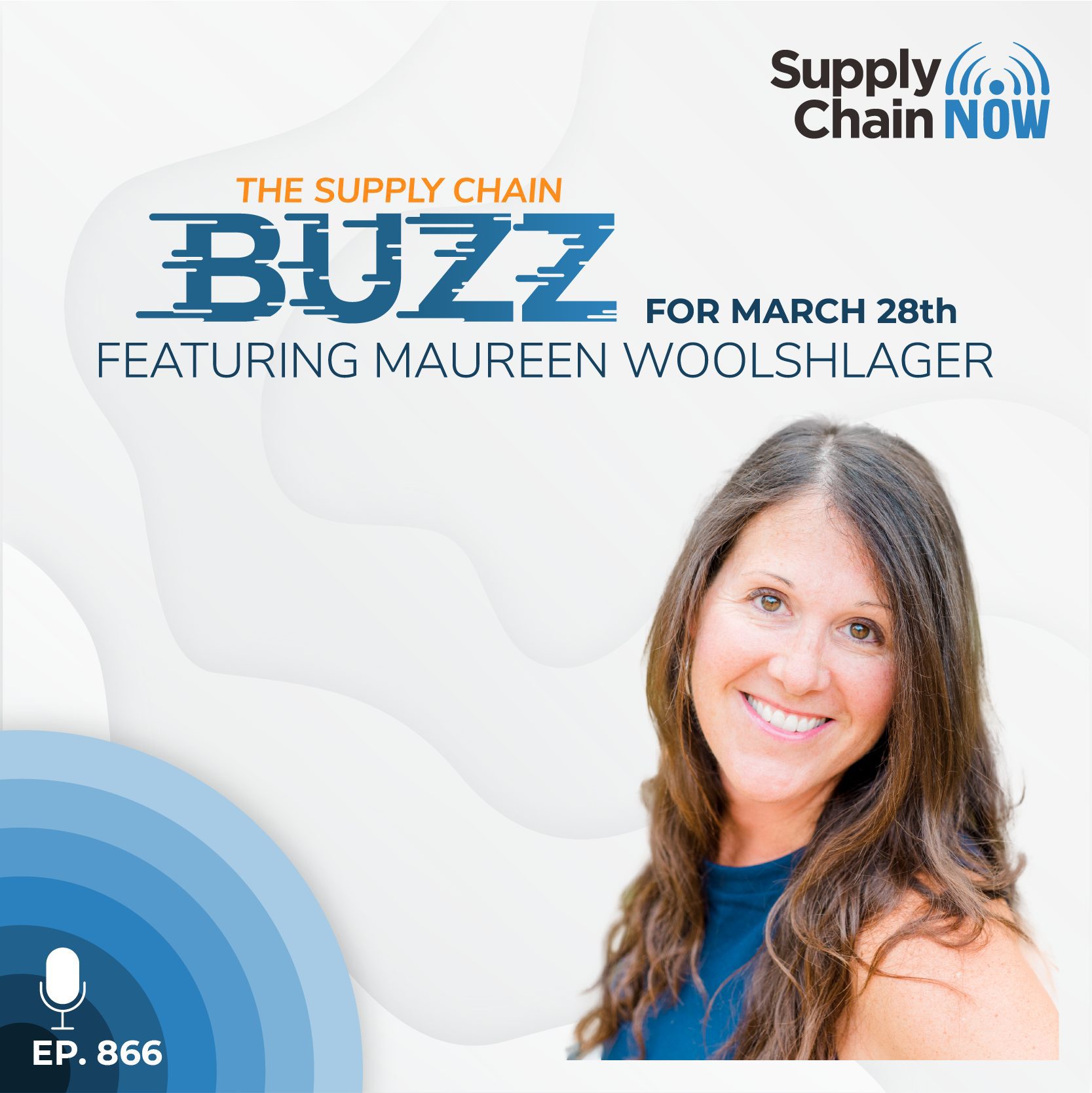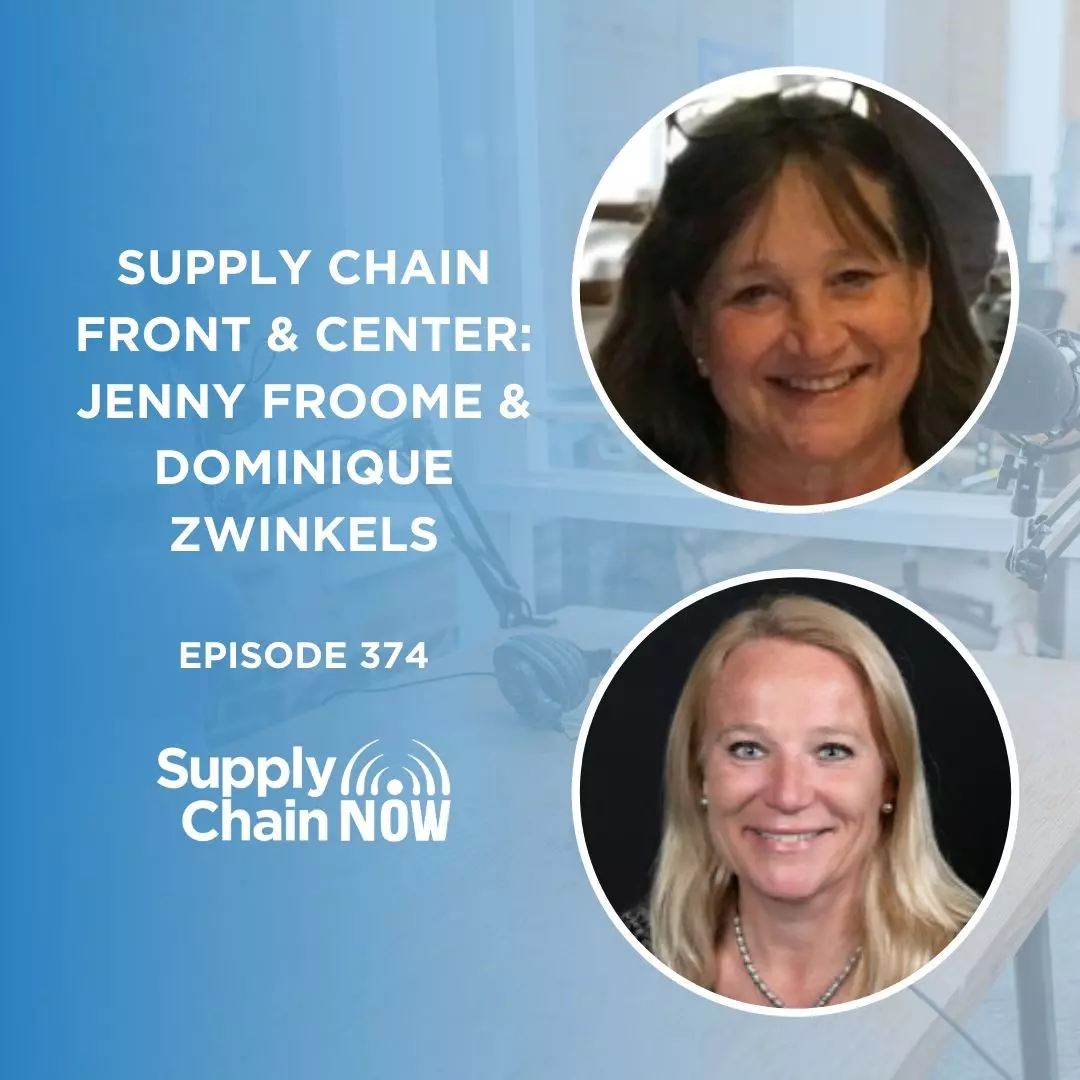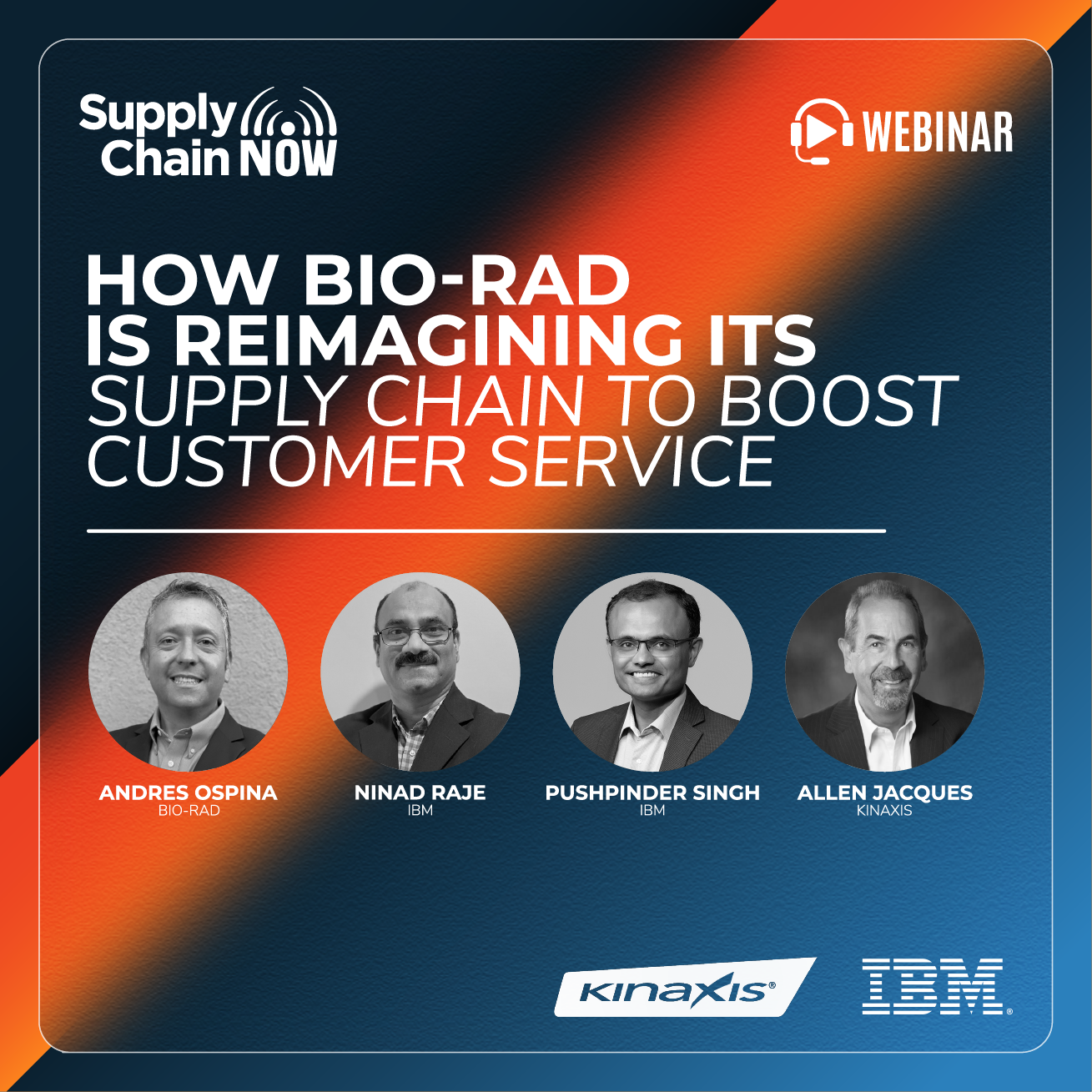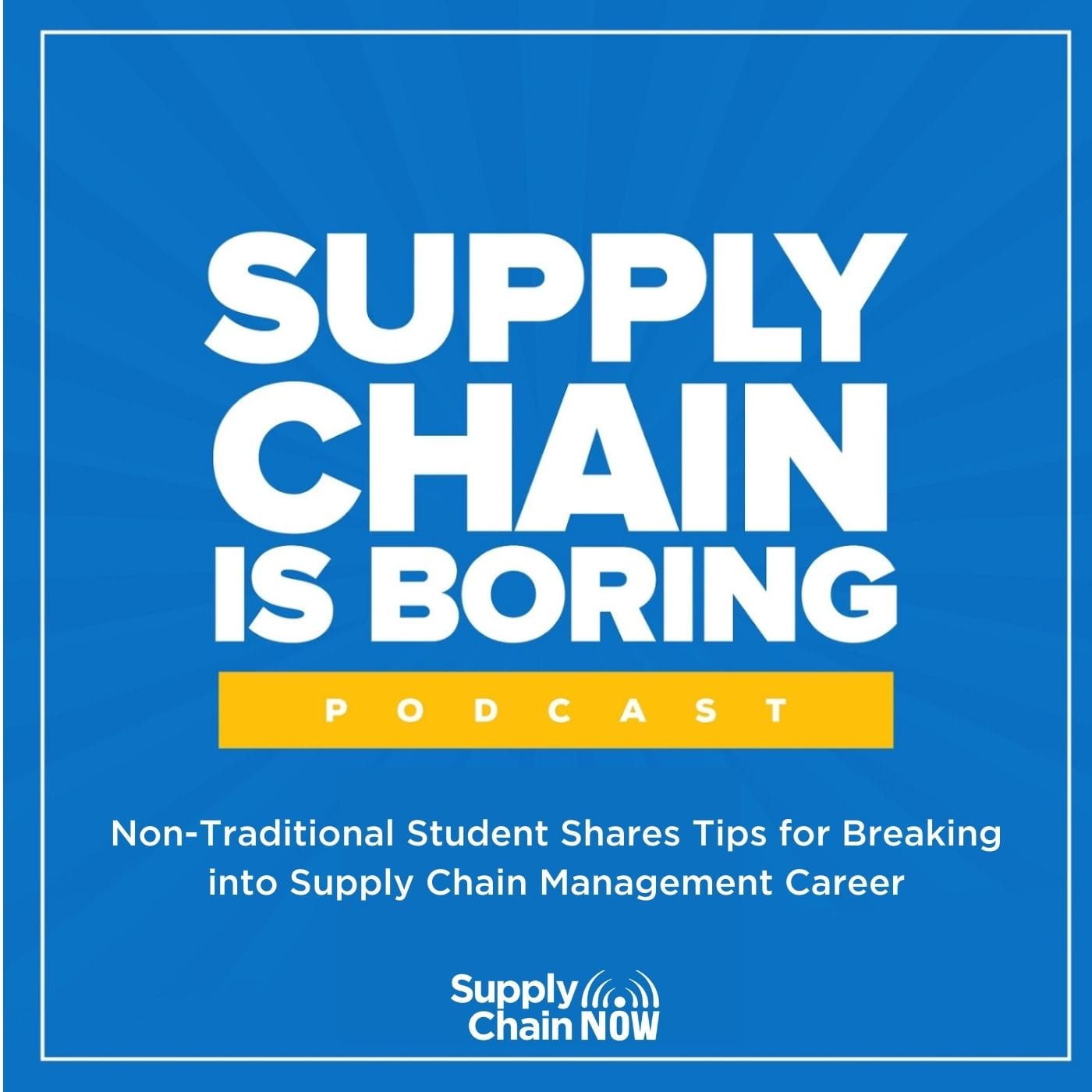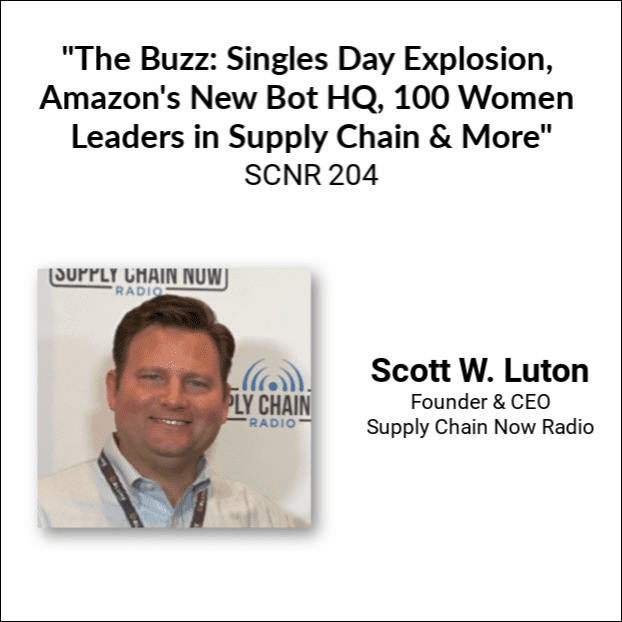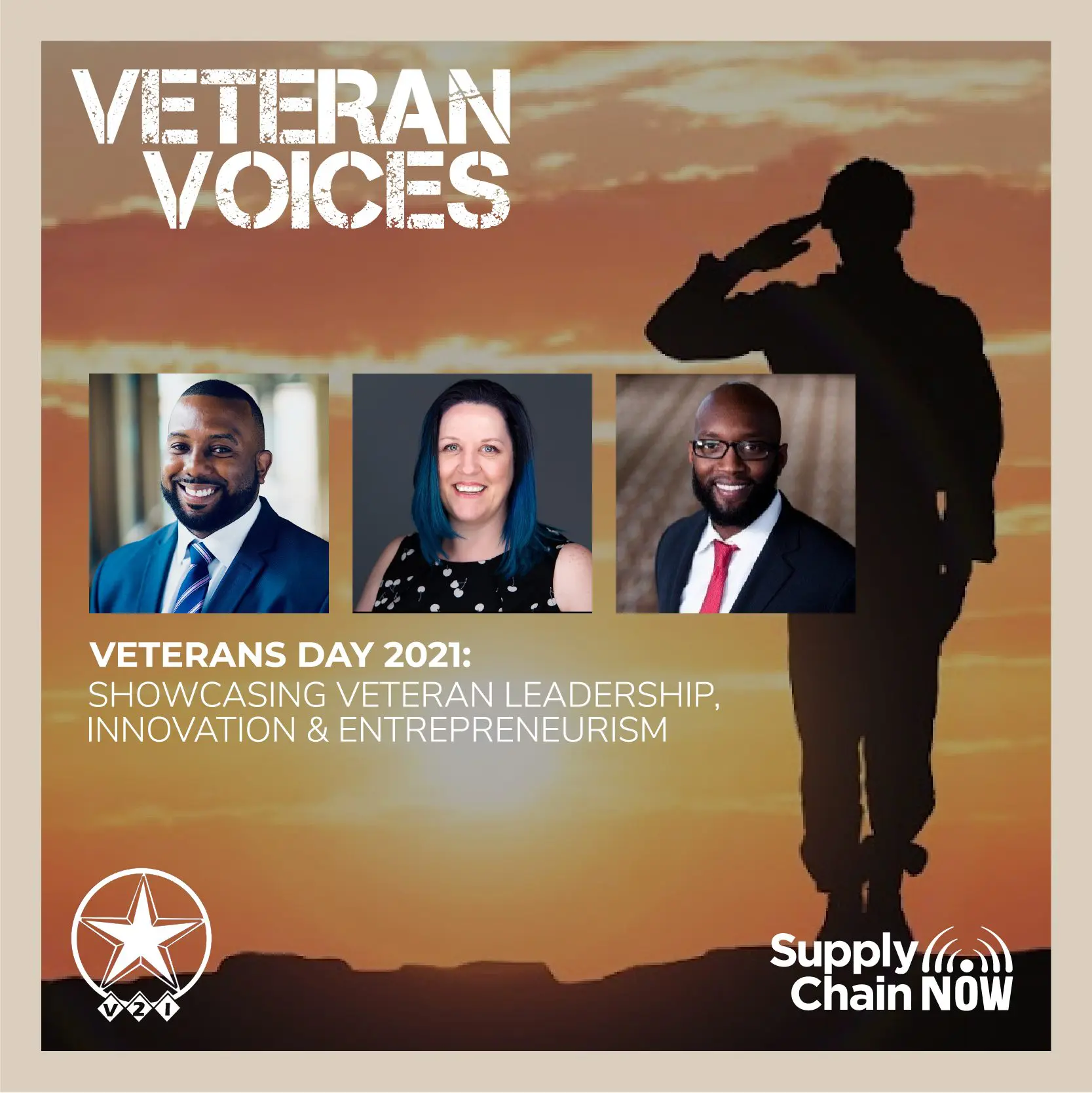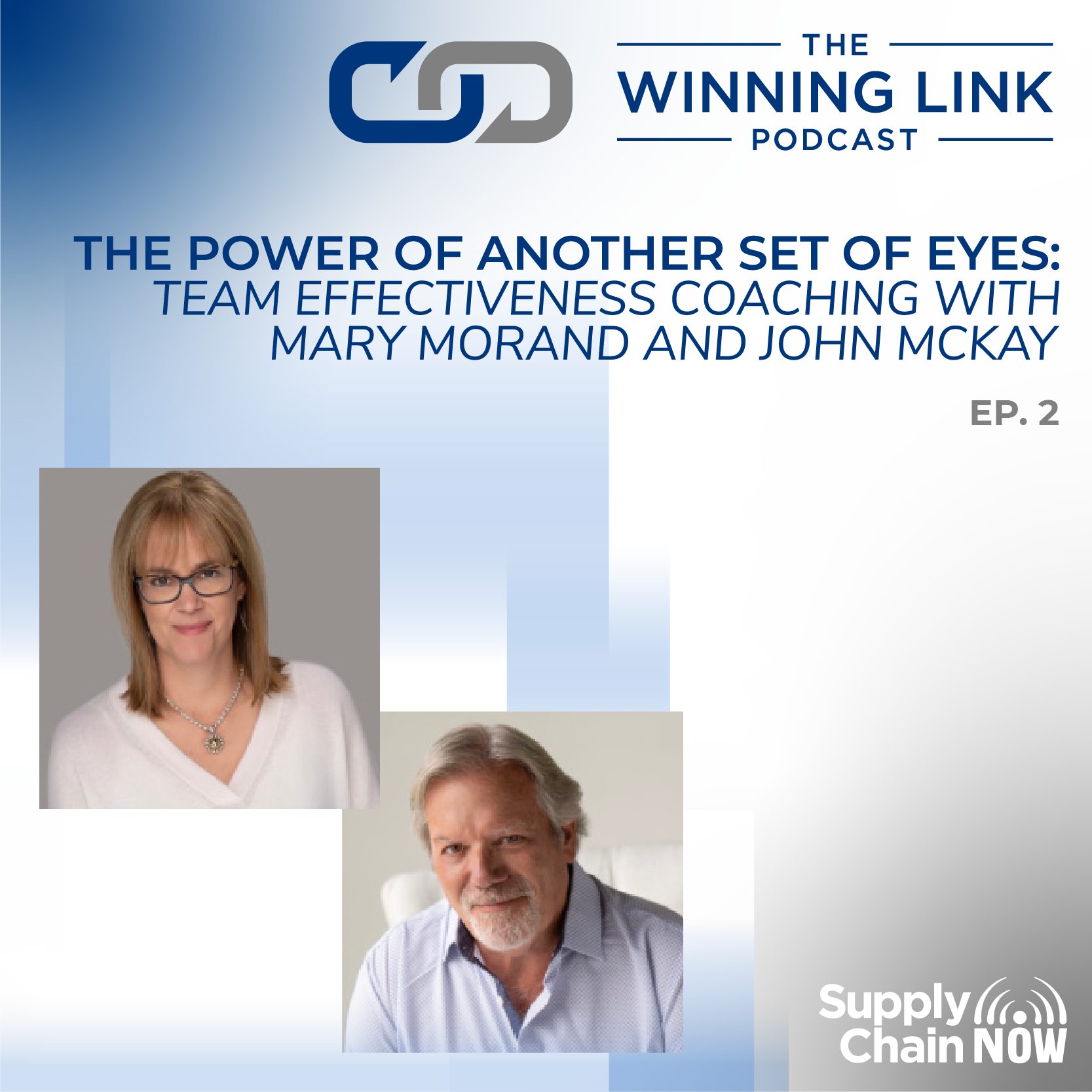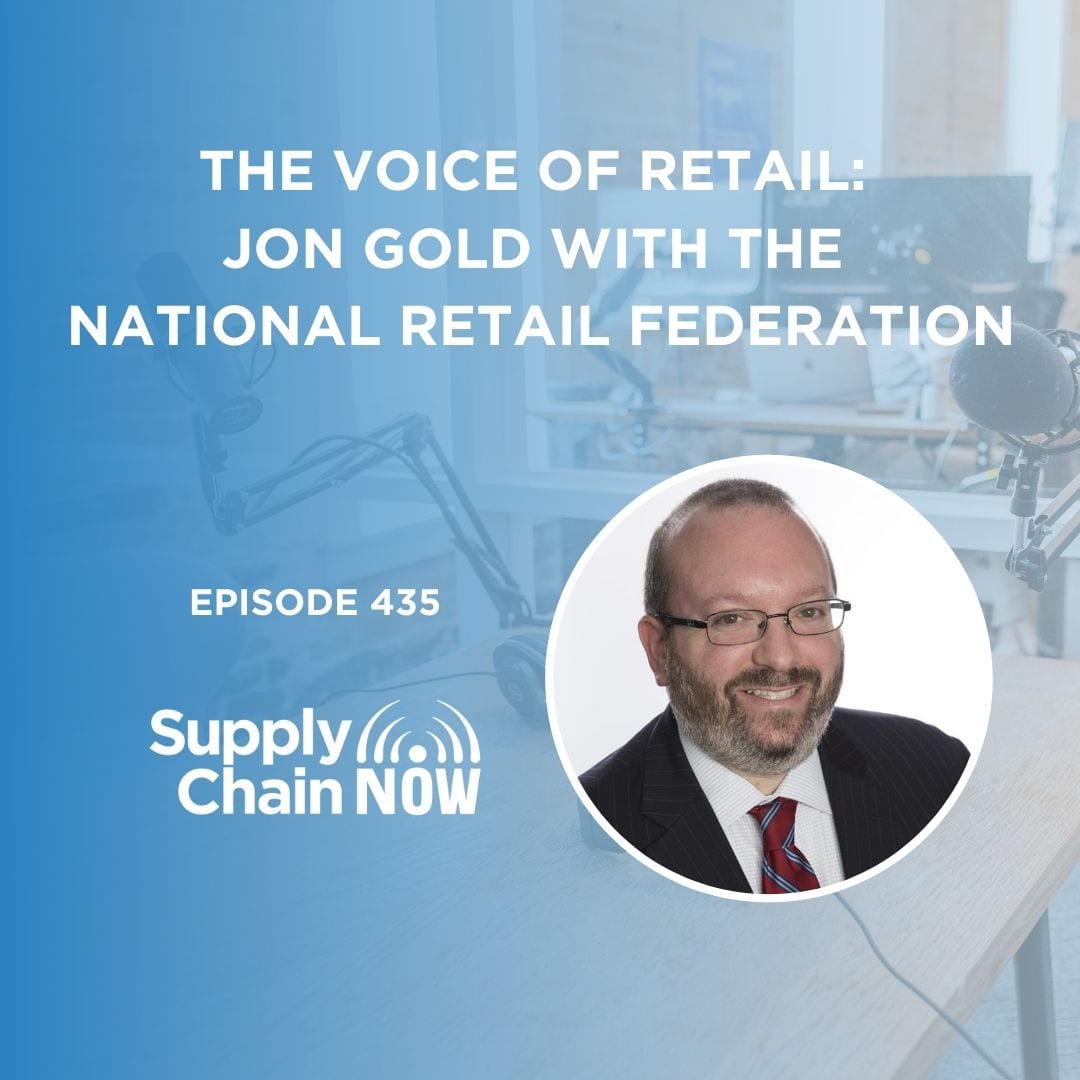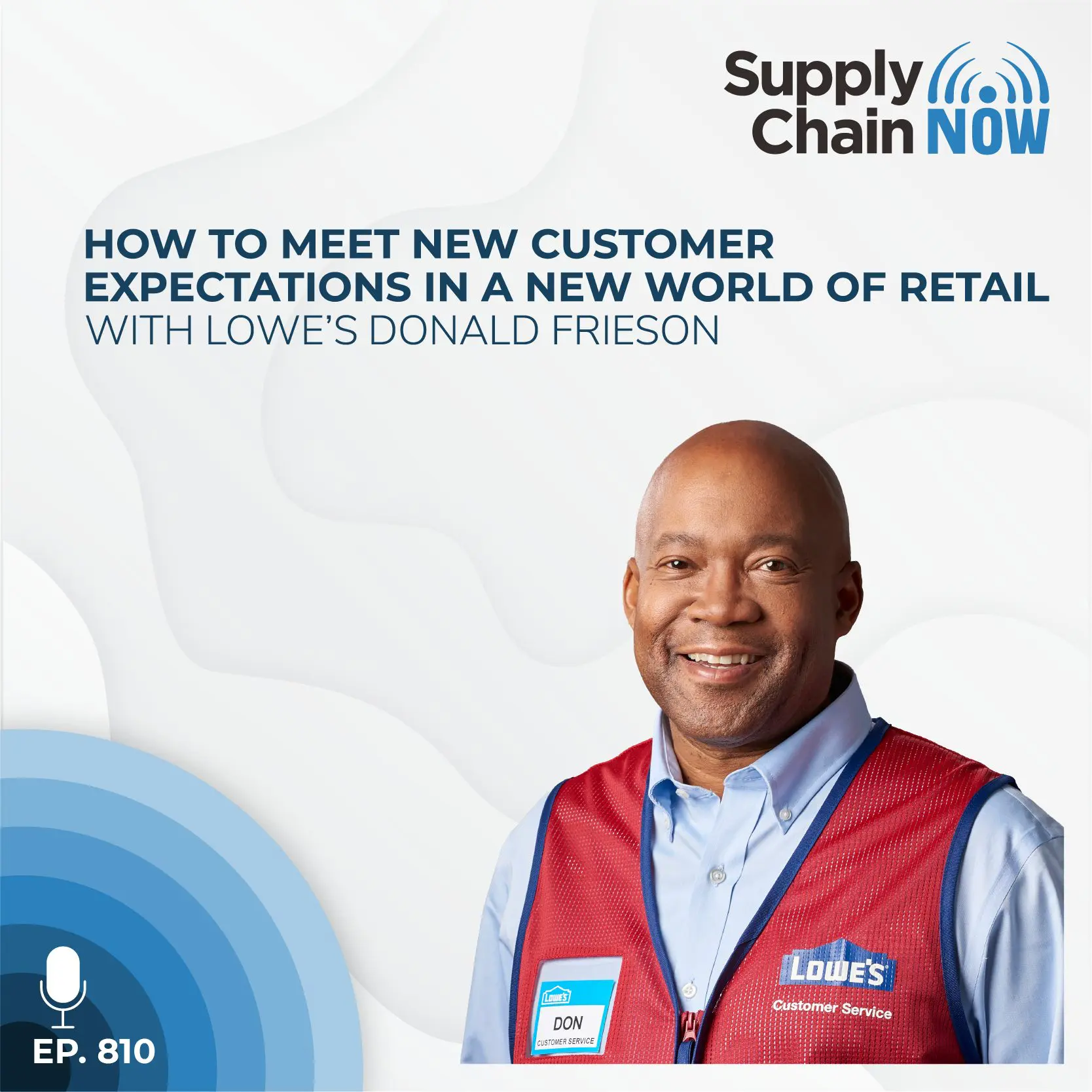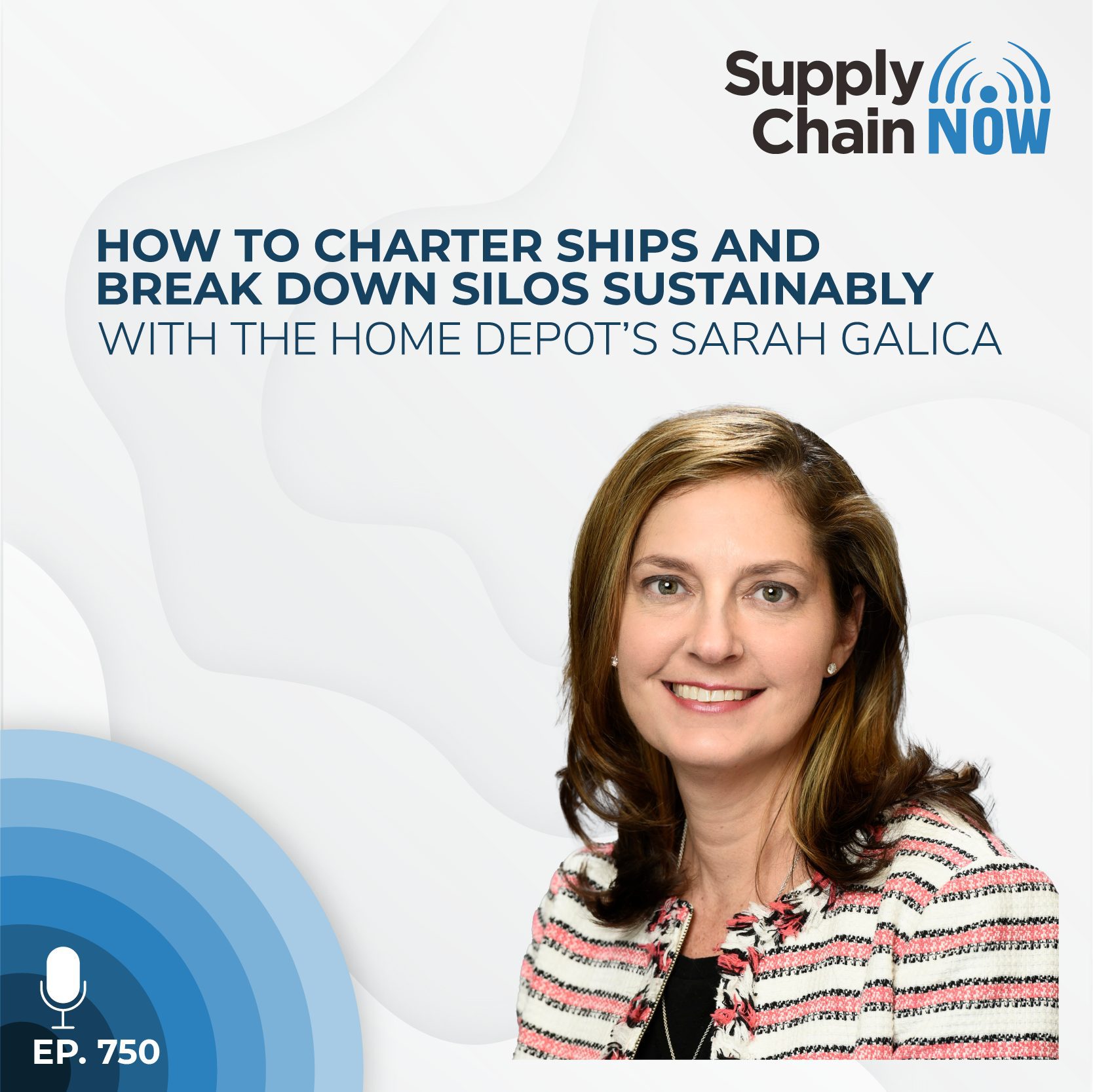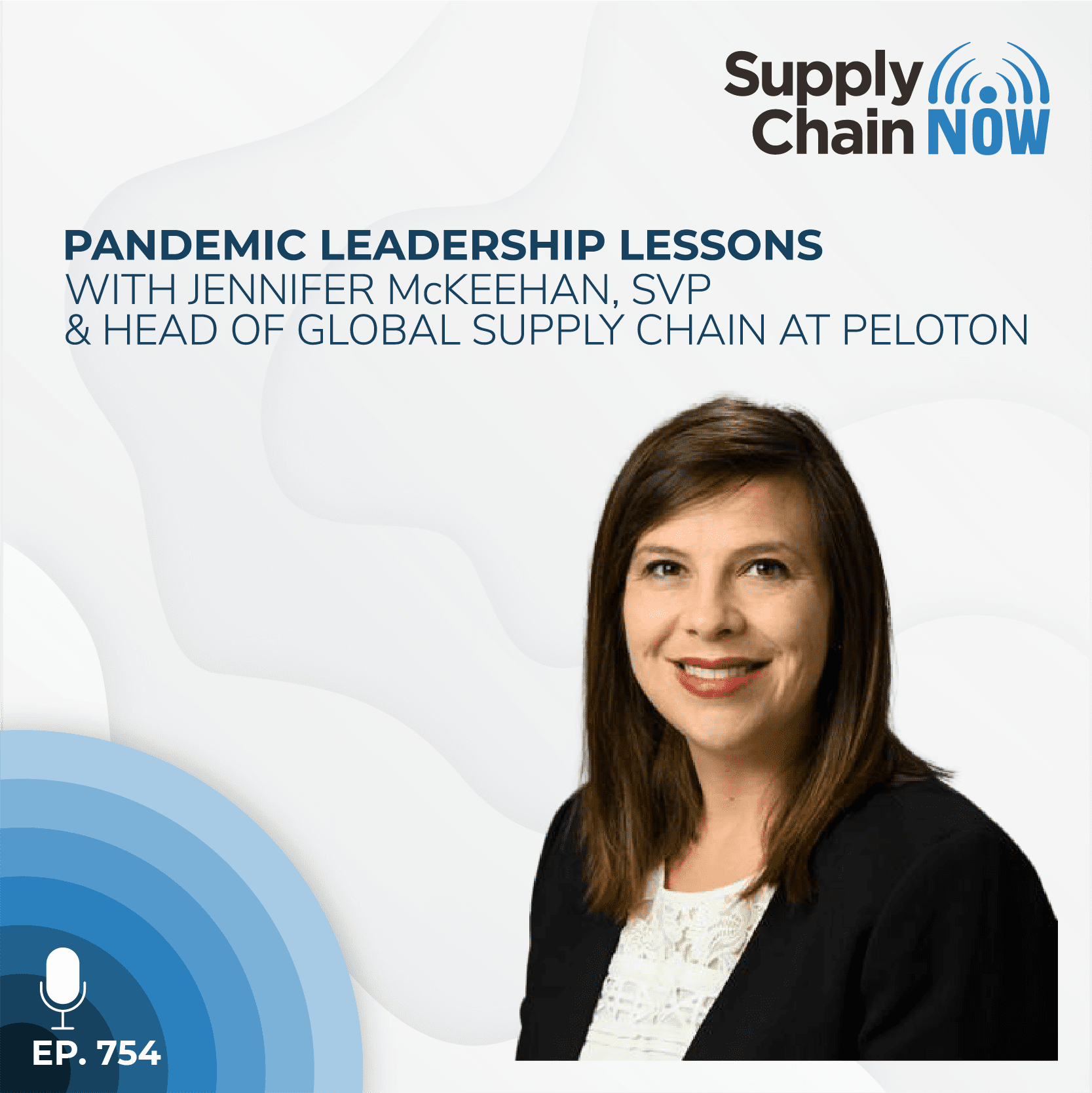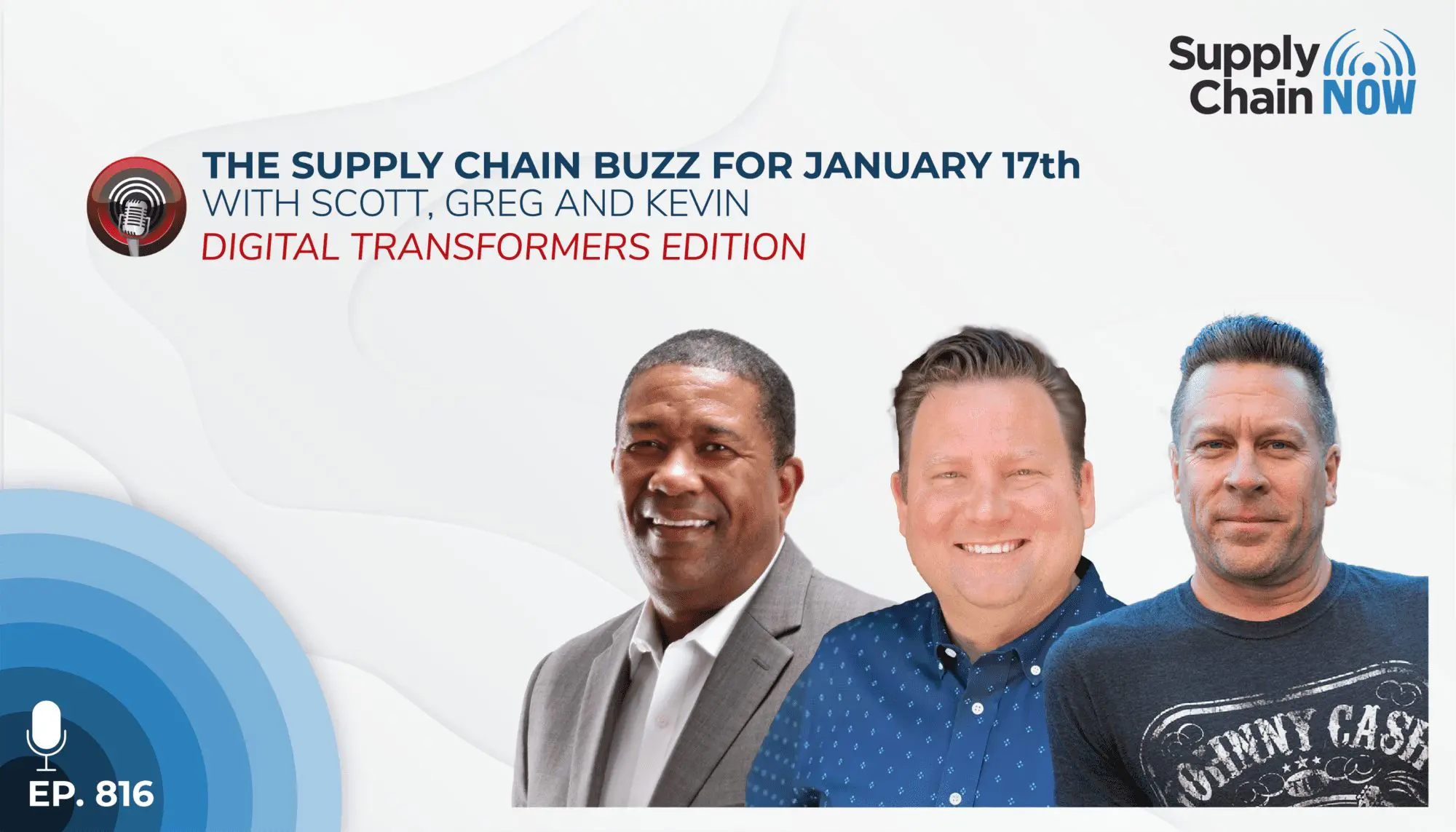
Step up to the challenge. Be consequential to the rest of the world.
-Kevin L. Jackson
Episode Summary
Fair warning: you will not leave this episode the same as you started. Tune in to the Supply Chain Buzz for January 17 and be prepared for loads of inspiration. First off, co-hosts Scott and Greg welcome Kevin L. Jackson for a Digital Transformers Takeover of the Buzz. The trio starts with some reflections on the legacy of Martin Luther King, Jr. before turning their attention to changing workforce preferences, the role of automation and robotics, and the call to action for more inclusive supply chains.
Episode Transcript
Intro/Outro (00:00:03):
Welcome to supply chain. Now the voice of global supply chain supply chain now focuses on the best in the business for our worldwide audience, the people, the technologies, the best practices, and today’s critical issues. The challenges and opportunities stay tuned to hear from those making global business happen right here on supply chain now.
Scott Luton (00:00:30):
Hey, good morning, Scott Luton, Greg white and Kevin L. Jackson here with you on supply chain now. Welcome to today’s live stream Gregory. Kevin, how we doing?
Kevin L. Jackson (00:00:40):
No, no. Good more good morning. Snow ice. And the teens last night. I am so happy. I work from home. <laugh>
Scott Luton (00:00:49):
I’ll tell you it does have its advantages. Right? Greg
Greg White (00:00:52):
Guys, I got, uh, you guys sound like one of the monsters from Ghostbusters on my mic, so I’m not sure what’s going on.
Scott Luton (00:01:02):
Well, that’s, that’s a call from our tech team. I bet to figure that out, Greg, right on time. How are you doing this morning?
Greg White (00:01:09):
I might, uh, let me try and get back in here.
Scott Luton (00:01:13):
Okay. Right. Hey, Kevin,
Kevin L. Jackson (00:01:15):
Live no love technology. We
Greg White (00:01:18):
Record it. It’s very cool sounding. I gotta say <laugh>.
Scott Luton (00:01:21):
Hey, live true. Murphy’s law is alive and well, certainly, uh, as we all are looking to overcome our technical challenges, we’ll give Greg a few minutes to join back in there. Kevin, how was your weekend?
Kevin L. Jackson (00:01:32):
Hey, it was, it was very, very good actually, uh, kind of quiet. I took some, uh, took some downtown, uh, and um, you know, after the holiday you gotta, you know, I gotta sit down and, uh, recover from the family, so to speak <laugh> but, uh <laugh>
Scott Luton (00:01:50):
Yes, I agree. Hey today I think we got great some good
Kevin L. Jackson (00:01:54):
Games on some good games to look
Scott Luton (00:01:56):
At. Agreed. Well, yes. Uh, in fact, the Cowboys and Niners are all the rage. This, this money morning, Greg, you got us now.
Greg White (00:02:05):
Yeah, that was like watching Ghostbusters. I mean, it sounded like either one of those monsters talking or <laugh> it was like, the devil was talking to me at first, Scott. I thought you were messing with your microphone and then Kevin spoke and I heard it and I went, oh, it’s me. <laugh>
Scott Luton (00:02:23):
I’ve been known to mess with people a couple of times. Never I’ve spared all,
Kevin L. Jackson (00:02:27):
All that means all that means is all that checking and testing we do before we go live is word that’s that’s right.
Greg White (00:02:34):
<laugh> it’s true. I mean, anything can happen. I mean, it’s the internet.
Scott Luton (00:02:38):
Well, um, you, you, you joined us right back at a right in time as Kevin was talking about the NFL games over the weekend. So before we kind of move on and talk about the buzz and all the things we’re gonna chat today, Greg, I’m gonna give you one quick take on the football games over the weekend.
Greg White (00:02:58):
Remember this trivia, uh, this trivia point, who was the last NFL player to sack Ben Roth. Berger.
Scott Luton (00:03:07):
Hmm.
Greg White (00:03:09):
Mike Dana with the chiefs. Yeah, like a second string defensive tackle for us. So, okay,
Scott Luton (00:03:18):
So
Greg White (00:03:18):
I’m gonna win. He got himself into the record books by doing that. How about that? <laugh>
Scott Luton (00:03:23):
By doing that? Well, lots of great games, uh, love the playoffs. And of course, achieves look, look strong, getting ready to maybe make another super bowl push. But folks today it’s about the super super bowl of supply chain, right? The supply chain, but, uh, digital transformers edition, which is really important. Kevin Jackson joins us. Uh, the third Monday of each month, of course, digital transformers is the podcast that knows no bounds taking no prison, taking no prisoners. Uh, it’s been very popular, enjoy to work there, Kevin, but Hey, on today’s buzz, we dive into some of the leading news of the day. Again, every Monday at 12 noon, we’re gonna, we’re gonna probably focus a little more on technology here today, which I always learn a lot between Greg and Kevin, uh, right there, but buckle up and get ready. Cause we wanna hear from you too. Now we’re gonna say hello to a few folks. We’ve got a bunch of folks chiming in, uh, including Kelly Barner, the birthday girl, Kelly Barner with us here today. Kelly
Greg White (00:04:21):
25th. That’s right. Uh, upper 25th.
Kevin L. Jackson (00:04:24):
How many 25th is that? No, <laugh>
Scott Luton (00:04:28):
Well, Kelly show
Greg White (00:04:30):
Her 20 birthday. <laugh>
Scott Luton (00:04:33):
Big friend of the show. Uh, great personal friend and professional colleague. And we’re actually gonna be talking about one of her most recent collaborations yeah. Towards a end of the buzz. But Hey, uh, before we get started, speaking of birthdays and um, what we recognize on the third Monday of every year, it’s Martin Luther king, junior day here in the us third, Monday of January, each year where we, you know, paused, reflect on the incredible, uh, extraordinary legacy of an exceptional human being. And I that’s where I wanna start here today. Uh, Greg and Kevin, you know, there’s so much gosh, here in recent months, uh, as, as we’ve touched on his journey and other podcasts, there’s so much. Uh, but, but Kevin and Greg, what, what comes to mind as you reflect on, uh, the one only Martin Luther king Jr. Uh, Kevin
Kevin L. Jackson (00:05:22):
Actually, um, I, I really, uh, he really changed, you know, he changed everyone’s world to be, uh, to be honest, but, um, you know, I was, uh, uh, a uh, in a choir. I was like 11 years old when he got, um, assassinator right. And, and I was at a children’s choir rehears. So it’s, uh, St Steven’s church in Neptune, New Jersey and, and, uh, the streets just erupted, not, I didn’t really know why, what was happening and I, I couldn’t get home because of all the chaos that was going on in the streets. And my, my pastor, uh, took us to his house to, so that we can be safe. And later my, my parents came to retrieve me, but that was my first realization of how the broader world can deeply affect one’s personal life. Right. You know, news didn’t mean much to me as a 11 year old, but from that point on it, it, it was, it, you know, what was happening to others was important to me. And, uh, the next time ever felt anything like that was nine 11, you know? So his life really points out the fact you, as an individual can change the world. So, you know, so, so step up to the challenge and, and be important, be consequential to the rest of the world as you lead your life.
Scott Luton (00:06:52):
I couldn’t imagine a better way to, to kick off the today. Thank you so much for sharing
Greg White (00:06:56):
Greg. Well, you know, it’s a little bit different for me because it was a history lesson for me. I was two years old when, uh, Dr. King was, was killed. And, um, I learned about it from my parents and grandparents and in school. Um, and it, it, you know, I got, I probably Kevin, like you, did you learn about what he was doing in school as well, but it was a little bit different for me because I had to reflect back on it. And in fact, uh, doing some studying over the weekend, um, I don’t know that everybody knows this, but his name was actual actually Michael King day. And in 1934, his father went to Germany to study Martin Luther, the original, uh, form former of Protestantism, and was so influenced. So inspired by that, that he changed his name, Martin Luther king Sr changed his name to that, um, and subsequently his son.
Greg White (00:07:54):
And, um, I, you know, and I think about some of the famous words of Martin Luther right here, I stand, I can do no other, basically these are the principles that I stand on. I can do nothing else, but stand on these principles and protect and guide and reflect them. And, and I just remember that statement so clearly and think about how, you know, at least what I learned of him. And, and of course, everyone knows now that that was the way that he was, right. It, it was about not fighting. You almost don’t wanna say the word fighting when you think of Martin Luther king, because it was resisting, right. It was aggressively resisting and outward, openly and peacefully resisting oppression. And, and I think that, um, you know, that, that, that whole sort of circle from all the way from his father changing his name from Martin Luther, obviously, but from his father changing his name, they were protesters from the beginning and they protested injustice and they did so in a way that was so effective to change people’s minds and hearts and policies and things like that. And that, just that little story, um, you know, kind of brought it full circle for me as to why Dr. King thought the way that he did, they were so philosophically influenced by, um, you know, the goodness of someone who invented an entirely new way to be individually expressive. So
Kevin L. Jackson (00:09:34):
Where you think about the, the, uh, the men of peace, uh, G and recently lost, uh, Bishop Desmond Tutu in, um, from South Africa in December, December 26th day up to Christmas and Luther king and how these, these men of peace have, um, really changed the entire world.
Scott Luton (00:09:56):
Agreed, agreed, um, really quick. And I, I, I, I love to keep it here all day. I, I think both of y’all there there’s so much to talk about, about this one families, but one, one man’s journey and the impact you had, but this, this image here, I, I came across over the weekend and we see so many of the same wonderful, iconic images of Martin Luther king, Jr. This was new to me. And this really captured, you know, a special moment with his family. This was taken, I think May, 1956, and this was in Montgomery. He was in his mid twenties. He, he, uh, begrudgingly and surprisingly what had around this time had been voted president of the Montgomery improvement association. And a big reason for that is, is others were fearful of the retribution from the community. And, but he took it on it in the mid mid twenties, imagine doing what he is doing, starting in the mid twenties.
Scott Luton (00:10:52):
Um, so special man, special family that also sacrificed incredible historical impact. And, and, you know, one day is never, never enough. But I think the challenge that we all have is to reflect and act on the legacy year round of, of, of, uh, Martin Luther king Jr. And his family. So thanks so much, Kevin and Greg for sharing y’all’s thoughts here today. And there’s so much more as we all know to that story. Okay. Much lighter note. It, it feels crazy going from Martin Luther king Jr. To global supply chain, anything but <laugh> to anything really that’s right. Yeah. But, uh, Hey, that, that is what we do here and, and we’d welcome. Hey, we, we wanna make this conversation welcome. All of y’all’s thoughts that are in the cheap seats, uh, the sky boxes, as it were gonna say hello to a few folks here in just a minute. Um, but we wanna offer up lots of learning opportunities starting with tomorrow’s webinar with our dear friend, Jeremy Boden hammer, uh, talking about survival, uh, when it comes to warehouse automation, uh, your survival guide to modern warehouse automation adapt or die. So check that out tomorrow at 12 noon, we’ve got in four, uh, with a live stream, this coming Wednesday at 12 noon, talking about, uh, what’s worse, bad news about your supply chain or uncertainty about your supply chain Corbu will be joining me for that. That’s
Greg White (00:12:14):
A tough call, isn’t it? I mean, really?
Scott Luton (00:12:16):
That is a tough call. Yeah, Greg. Um, and we’re gonna be out in Vegas. Uh, we invite you to join us, uh, in early February as we’re out with the reverse logistics association conference, NPO. I think it’s our 18th straight annual conference. So we look forward to can continuing, uh, investing in the coverage of returns management and reverse logistics, which we’ve been doing for a couple years now. And then finally, folks nominations are open for the 2022 supply chain and procurement awards. It’s a global affair this year, right? We’re celebrating, uh, global successes across industry 18th 2022, but Hey, nominations close on March 1st. So you got about 45 days to nominate individuals or companies across eight different categories. Um, and we’re really proud Greg and Kevin to be, um, baking in a ton of purpose into this awards program, uh, where we’re supporting hope for us, a nonprofit dedicated to eradicating, uh, modern slavery and human trafficking, which it is a travesty. Those are traves and of themselves, but it’s a travesty that we have to utter those words in 2022, for sure. Um, links to all those events or in the comments. And, um, Kevin and Greg, no shortage of things take place across global business here in January of the new year. Is that right? Greg
Greg White (00:13:39):
Agreed. And a ton of recognitions. I mean, you know, this is kind of the month where people reflect back on the, the previous year and look forward to the rest of, of the current year. And, uh, we’re seeing a lot of that. And I think starting to see some realization, some of the things Scott we have been talking about, and we’ve been talking about since the pandemic started and Kevin’s been talking about for not on a decade, right. <laugh> get your, get your technological house in order, get your processes in order, right. Um, build your house on, not on shifting sand kind of thing. And, um, I think we’re starting to hear more about that and starting to see more companies move seriously, move that, that direction.
Scott Luton (00:14:29):
Agreed. I’m I’m just gonna follow in Kevin’s footsteps and trust path, Kevin, your response to that.
Kevin L. Jackson (00:14:36):
Well, the, the, the thing about it is that, you know, people, uh, respond to adversity. Society responds to adversity, and the, the past two years have been a, really a, a learning opportunity, an opportunity for our entire society. You know, I’ve said this before, but it’s the first time that the entire population of the world experienced the same calamity at the same time and could actually talk about it in real time. Uh, I was looking at this show last night, it was 4 billion people on earth were been to their homes, uh, um, over the past, uh, year, right? That’s half of the population of the entire globe. You know, that’s amazing.
Scott Luton (00:15:22):
It is. And it’s, it is amazing that, uh, technology, and infrastructure’s gotta keep up with, uh, making sure we can maintain connectivity amongst all us folks. I’ll tell you all about y’all. I had to kick off three kids off the internet prior to going live here today. Cause they’re home, uh, with the holiday and they were not none too pleased about that. <laugh> but, uh, anyway, well, let’s say low to a few folks. There’s so much to talk about here today. I think we’ve got four stories teed up that we’ve been working our way through and folks we want to hear from you. We got T Hopkins, uh, with us. I think he’s in DC, big bam fan there. Max Gomez is back, uh, via LinkedIn. Great. See, max Mar says, good evening from the other side, Kevin, any guesses, you don’t think I’m hoping that’s geographically and
Greg White (00:16:12):
Microphones. It could be
Scott Luton (00:16:14):
<laugh>
Kevin L. Jackson (00:16:17):
You a Ghostbuster. That’s right.
Scott Luton (00:16:19):
Maybe we do do a Ghostbuster. Yeah. And, and, uh, with this via LinkedIn, great to see you. And this morning, Simon is back, uh, via LinkedIn, Simon. Hope this finds you and your wonderful sense of humor. Well, Steven is tuned in with us here today. Uh, ke is here. Uh, let’s see here studying, uh, masters in supply chain in Ireland. He is new. Any suggestions for looking for jobs and supply chain. Hey Kesha. Great question folks in the comments, Hey, drop in jobs, drop in advice, place as resources. You name it as we try to help help KEF who’s getting through, it looks like a great program there. Yeah. Eric,
Greg White (00:17:01):
Just ahead, open, open your ears because they, uh, they are out there. There were, we were 2 million professional short prior to the pandemic and there are far more supply chain jobs out there now. So that is right. Excellent.
Kevin L. Jackson (00:17:15):
Yeah. Oh yeah. Yeah.
Scott Luton (00:17:17):
So Eric asked and Eric Good morning, uh, where I think he’s saying is my UGA gear. Well, uh, I’m very, I’m very,
Kevin L. Jackson (00:17:26):
<laugh>
Scott Luton (00:17:27):
Congrats to all of my Georgia bulldog friends. It’s been really cool living here on the fringe of the Eastern Metro Atlanta area. Seeing the bulldogs, you know, celebrate, uh, a national championship really is cool, but, but I’m a big Clemson fan. Uh, as this poster right here, just over my right shoulder, uh, might seem to indicate, but Eric cope, this fines you well this morning, David’s tuned in via LinkedIn from the UK. Uh, max, Hey, max is talking chiefs. Let’s see here Mahomes versus the Allen showdowns gonna be a great game. Hope one of those two Auro when the super bowl, Greg, your quick take,
Greg White (00:18:04):
It’s gonna be a tough fight. The, uh, the bills stomped our guts at out. Um, earlier in the season it was not pretty, but, um, Patrick Mahomes has to be looking at, at Joe burrow and Josh Allen and going, am I the future greatest quarterback of the NFL? Or are they, I mean, I really think he thinks that way. And he’s gotta know in his heart, heart of hearts that is, and he’s got the team around him to win and I’m hopeful that they step up. But I mean, I fear the bills, like no other <laugh> I think the super bowl coming outta the AFC, I think the super bowl will be, um, an incredible game, but these AFC teams are gonna beat the heck outta one another getting there.
Scott Luton (00:18:50):
All right. So speaking of football really quick, Kevin, cause you’re a big fan of the Washington football team. It’s about to roll out a new nickname. What’s your favorite? One of the ones you’re considering.
Kevin L. Jackson (00:19:01):
Well, yeah, I, I actually wanted thes, but they didn’t make the short list. It’s like the presidents, the brigade, I dunno where that came from. The red hogs commanders, the red wolves, defenders and football team. <laugh> the team made the cut as a, the last, uh, you know, list. I’m not sure, but um, yeah, I’ll have to go with a motto, um, being a Navy. I mean, I, yeah, there you, that sounds pretty strong.
Scott Luton (00:19:37):
<laugh> that sounds like a good one. Uh, T square who holds down the Fort for on YouTube. Hope this finds you well, uh, says, hope that nourishment ain’t getting blown in these wins as he puts it. Uh, love that gene pledger is with us, uh, he, of Northern Alabama and doing some good work, uh, helping others succeed in supply chain. Gene hope this finds you well, Roger cars back with us, uh, from the winter Wonderland of Greenville, South Carolina, former home, I think of the Greenville grow. I’m not sure if they’re still there. Greg, what were you? I,
Greg White (00:20:08):
I’m just curious. I heard they were getting, you know, when you’re are in South Carolina, you hear a lot about the upstate and <laugh> I’m, I’m learning my South Carolina geography <laugh> and um, I’m curious how much they actually got there because they were predicting as much as 10 or 12 inches in Greenville, South Carolina. What? The home of B goodness, by the way,
Scott Luton (00:20:33):
Roger, fill us in. Yeah. Roger, let us know what, how much, uh, snow y’all got there. Natalie is tuned in back, uh, in, uh, Charlotte, uh, via LinkedIn. Great to see you there. Peter says good Monday morning likes he’s liking Greg’s new dude, Peter Saint. Oh
Greg White (00:20:51):
Wow. I love it too. Greg, I’m going for the, uh, I’m I’m contemplating growing it out. And, uh, man, every day is a challenge. Every, have you seen that? Have you seen Tommy boy where he wants to rip his hair up? Every day I wake up, my hair looks like that. <laugh> I’m like, how does it get before it falls? Right, right. <laugh> I dunno, it hasn’t fallen yet. I can’t get it to fall. That’s part of the problem. Love it. You know, love it. I’m thinking, I’m thinking if the chiefs win the super bowl, I’m gonna go with the Patrick Mahomes cut with the twists and everything. So, wow. Cause I think it’ll stand up better than his
Scott Luton (00:21:32):
<laugh> Peter. Thanks for noticing. And Greg, I look forward to getting the future rundown on the due Mervin. Great to see here via LinkedIn. Uh, Jason says, who would’ve, who knew the MLK was a logistician and knew the road success was integration. You know, that’s a great comment. And I also, I cannot remember the gentleman’s name, but there was a lodge edition on the March on Washington. And we did a, we did a podcast about it and, and uh, we uncovered some, some really new aspects of one of the biggest, um, historical events on record, certainly across the country. Yeah. Um, let’s see here. Roger says as a bivocational minister, my favorite quote from Martin Luther king Jr. Was darkness cannot drive out darkness. Only light can do that. Hate cannot drive out. Hate, only love can do that.
Greg White (00:22:21):
Excellent. My favorite of all of his quotes ever. It’s a
Scott Luton (00:22:23):
Good one. Yeah. Uh, and finally, and, and I love all the feedback we’re getting. Y’all keep it coming. We’re we’ve got a lot of stories work through he, uh, helmet. Thank you so much. I’ve enjoyed your submissions. You’ve sent some articles and some takes, uh, across social. He, that’s a great question here. Or rhetorical question. Uh, what would be his dream for global supply chains? That’s a great question. We’ll par try to sprinkle some of that, uh, answers some responses to that maybe throughout our conversation here today. So thanks so much helmet. Okay. Um, and, and stay tuned. Cause I think one of them, part of that response is a vibrant, um, divers across our global supply chains, creating an opportunity for all. And we’re gonna touch on that through a wonderful article that Kelly barn are put together, uh, towards the end one, one final Kim winner is tuned in greetings from the desert guys.
Scott Luton (00:23:15):
He is in Dubai, Kim. Great to see you appreciate all the good work you’re doing. Okay. So folks we’re ready to get started and we’ve really enjoyed everything, but supply chain for the first, almost half hour of the show we gotta get to work. Right? Yeah. So on that note, let’s start with this first story here. So the first story, uh, we are talking about, uh, here in the first month of the new year mm-hmm <affirmative> CEOs continue to brace for more change in 2022, shouldn’t surprise anybody as reported here by the wall street journal. I’m a crime inflation and labor shortages. Oh my <laugh> Kevin. Tell us more about this story here.
Kevin L. Jackson (00:23:56):
Well, well actually there was a, um, a survey done by the conference board. Uh, this is a private research and they, they said that more than half of us CEOs expect 40%, at least 40% of their employees to work remotely three or more days per week after the pandemic goes away. So this is something that’s going to stay <affirmative>. And this compared to like 28% of the CEOs before the pandemic mm-hmm <affirmative> and um, about 82% of these, uh, CEOs, they’re about 900 CEOs they talked to, this is, and this was globally. This wasn’t like just an United States or thing. They are seeing upward pricing pressures for raw materials and wages. And they expect this pressure to last until the middle of 20, 23 or beyond. Right. And this is coupled with labor shortages companies like Honeywell international are, are reassessing prices of their goods more frequently, right?
Kevin L. Jackson (00:25:14):
They don’t just set a price once a year. They’re looking at it like every month or two and, and cloud service providers are, are planning. New incentives for their employees is to learn their employees back into the office. Nobody wants to go back into the office. And, uh, one of the ways that trying to get people back into the office is with, you know, COVID 19 testing to allow larger gatherings of workers. I mean, you know, what is safe today? You know, what is safe post pandemic, uh, you know, this is, this is going to be an endemic thing, right? It’s not, it’s never going away. Mm Greg,
Greg White (00:25:59):
I think that’s a, that’s a great analysis is, you know, this is the new flu, common, cold, whatever. This is something we’ll live with for the rest of time, which is something that was not just foreshadowed, but scientifically discussed by Harvard doctors in the very early dates of the, of the pandemic and subsequently ignored, which be got a lot of this, of these issues. Right. Um, you know, I’ve been reading a lot of articles because I am absolutely back while why people are not going back to work. I mean, other than, you know, the fact that they’re constantly hearing about a new variant that could impact their health. Um, there has to be other reasons because there are plenty of people getting out and getting around, um, you know, depending on, on where you are in the country, I guess, but, or, or what country you’re in.
Greg White (00:26:52):
But, um, you know, people are, you know, the root of all of these problems in terms of inflation and labor shortage, obviously is people are continuing to live on the money that the governments gave them as subsidies. They paid off their debts, they packed away savings, which I didn’t even think about people would do with a genius on their part. And now they feel like they’ve got some buffer they’re kind of waiting for things to, to settle out. Remember Scott, I said, the word of the year would be stability. I think people are right, waiting for stability. They’re waiting for stability in, in health. And, and in, you know, determining is this in fact, an endemic, I think Kevin, you and I are maybe a little bit ahead of the curve in believing that. And other people still think this can kill a lot of people.
Greg White (00:27:43):
Um, they’re afraid of that. And, and the, you know, of course the rhetoric from politicians and the news is commonly that, so I, I don’t know what else we would expect people to think. Um, but people have savings and they have this kind of nascent trepidation about getting back into the office. So they’re just in a, in a wait and see, um, you know, they’re in a wait and see mode around these things. And we are going to reintroduce a word that I think maybe only Kevin and I know Scott, I don’t, I don’t remember exactly when I dunno many words. I dunno. I don’t know when this word was used stagflation. So yeah, the economy will definitely stall. The fed has already indicated that they will, they will raise rates three times, probably four. And now people are saying five times in 2022. Wow.
Greg White (00:28:34):
Um, inflation is rampant as evidenced by it growing yet again in, in the last month of the year. Um, so we’re gonna see a stalling of the economy, prices rise. I think that not stability, but that, that concern will start to put people back to work. And maybe I, you know, I don’t think high-minded like, like politicians and economists do, but maybe that’s what they want is to try and force people to get back to work. I, I’m not sure, but I think that one of the things we have to do is we have to introduce some stability here. And remember for all of you, not in the states, this is an election year in the states. Stability is not usually what we get here. We get a lot of rhetoric and double talk and promises and threats and things like that. So I’m, yeah. I don’t know exactly, but I can tell you this, it has changed the way people will work in offices for a significant number of years into the future. I dunno, five, 10, maybe 10 years maybe. Well,
Kevin L. Jackson (00:29:39):
I don’t know. I don’t know. Uh, if people will go back in the office, um, looking at another Kevin. Yeah. I was looking at another show and it was saying that jobs like, um, driving Uber and Lyft or, or doing the, um, Instacart kind of job. Yep. <affirmative> people are deciding not to go back to their old jobs because they have no control of their safety. They, they see it as a, a danger to go into their old job. So like in the case of like Uber or Lyft, you’re in your own vehicle, you have control of what’s in there, you set your own hours, they’re putting windows back seats. They’re making, they’ve already saved a lot of money and they’re making enough money right. With this gig economy. Yeah. So, you know, why go into some environment you have no control over right. In, uh, you know, in, in today’s world do something that you at least have some sentence of control.
Scott Luton (00:30:49):
Right? Well, some good news is, and, and we keep getting more, I think, from the metal community, at least what I’m tracking is that, uh, more and more milder, um, uh, cases, uh, with this, with Aron and, and this last variant and, and that’s, that is great news. Right. That’s great news. Um, couple quick comments ask and you shall receive, Roger gives us a weather report, four inches up in the upstate of South Carolina, but the ice is worse. Yeah. He says,
Kevin L. Jackson (00:31:17):
Um, yeah, ice is treacherous.
Scott Luton (00:31:19):
Sheldon is back with us here today. Welcome. Welcome back, Sheldon, where great to see you looking forward to your contributions. Uh, Eric’s giving us stock tips. I love that in the comments. <laugh>, uh, I agree with you that Prolog tell you Prologis doing some really cool things. Eric and finally T squared stagflation was in the seventies and that ease. I remember it well as a four year old lot of good stuff there. Okay. Hey, really quick. I wanna, and we’re about is this lead off article? I’m talking about, uh, the story in the wall street journal about some of these issues that CEOs are bracing for, for change, uh, and, and disruption and challenges and you name it. Mm-hmm <affirmative> but a quote in this article, I found interesting. A beverage industry executive mentioned that quote, there isn’t enough agave in Mexico to make enough tequila quote.
Scott Luton (00:32:04):
No, no, I don’t. <laugh> I dunno about y’all, but I didn’t know that officially tequila must come from agave plants grown in the, is it HaCo region of Mexico? Yeah. Much like problem. Yeah. Yeah. I had no idea much. Like champagne’s gotta come from France. Lia onions have gotta come from Georgia. Right. Um, and I also didn’t know that there is, for years now, there’s been a shortage, uh, of, of agave to meet the massive demand in recent years of tequila. And I was doing some reading about tequila. It really has re reworked its image and it and its brand. Uh, so I, I, no, no wonder we’re seeing all these tequila commercials all the time. It is a hot, hot market. Greg. I know you’ve done some work. Uh, I believe in the beverage industry. Do you like tequila?
Greg White (00:32:53):
<laugh> I do. And I mean questions, it, it’s not just for shooting on spring break in. I mean, it never was. It never was, frankly, but in the states we sort of whatever went to the lowest common denominator as we, as we often do. Right. Well like to shoebox things, don’t we? Yeah. Right. Exactly true. Um, but yeah, I mean, it’s, you know, it is now a sipping drink, a mixing drink, obvious Lee margaritas. But I mean, there are all kinds of things that you can do with it. And there are very, very good brands of tequila that are as good as any scotch or bourbon that you will ever drink that you can literally drink. I mean, sip, uh, straight, you know, drink it in a sniffer. So it’s not just the shot glasses
Scott Luton (00:33:42):
That’s right. The other thing is, is the process, uh, for grow, not just growing, but then processing the starches that come outta the plant takes a long time. And so there’s been a lot of fighting over the acreage in HaCo and Mexico as the different brands and companies wanna secure. Um, uh, there, there they’re all goods. It’s really, really fascinating. Kevin, your quick, quick response, and we’re gonna keep driving.
Greg White (00:34:07):
Um, I can’t
Scott Luton (00:34:08):
Wait to have another shot with Greg <laugh>. Yeah.
Greg White (00:34:12):
<laugh> well, you know, we’re, I think we’re actually closer driving distance to one another. Now Kevin. Yes. Make that happen.
Scott Luton (00:34:20):
Yeah. So of course, Kevin is talking about tequila sunrise with T E C H I’ll let Greg do the wink, but lots of great content there. Fascinating interview that Greg and Kevin Greg did with Kevin a two-parter y’all check that out. Maybe we can put the link in the comments there. Uh, a couple quick comments. Speaking of temp says Uber drivers and Lyft drivers can make more than truck drivers right now. Wow. That’s a great, great comment, Tempest. Great to have you back. Uh, Natalie says my latest research project motivating in a work from home environment. There’s a struggle to maintain high team performance. Think collaboration, learning connection when everyone is working from home. That’s a good point, Natalie, happy
Greg White (00:35:00):
To tell you how I’ve been doing it for 21 years, Natalie, if you’d like to know <laugh>
Scott Luton (00:35:06):
That that would be a masterclass,
Greg White (00:35:07):
Greg. I, I mean, I I’ve been dealing with at least hybrid organizations since 2001 and there are some really, really productive ways to do it. Strangely walking down the beach the other day, I was talking to a lady from, uh, oh my gosh. One of the big universities in Canada, mm-hmm <affirmative> um, like their most prestigious, which in the name just went through my head anyway. And, and she was doing a study on this, on work from home and the dynamics of, and you know, Scott, you often mention water cooler conversations and the value right. Of having someone present and always on, or always, always, uh, in, in your space to share and bounce ideas off of. I think that is something that is, um, lost and so powerful. I mean, agree and emotionally motivating when you get to experience that. So one of the things you have to do is enable that to whatever extent you can.
Scott Luton (00:36:08):
All right. Uh, we, a lot of good stuff there. We’re gonna have to have a conversation dedicate on that. I mean, we can pick your brain Greg on, uh, leadership best practices when it comes from work, the work, the continued from home. Yeah, yeah. Work from home environment. Um, but really quick, Kevin, I wanna keep driving here. We’ve got so much to get to this next article. Mm-hmm <affirmative> talking about all the change we’re already been, you know, already have been speaking to for the first half of the show. There’s been plenty of change across global supply chain. Of course. And this really interesting article, I think quick read from four Greg price, a different Greg points out a few supply chain and strategy strategy trends, easy for you to say, to consider in the new year. Kevin, tell us about this.
Kevin L. Jackson (00:36:48):
Well, we’re talking about people don’t wanna go back to the office, right. Um, and, uh, so there’s a labor shortage, um, but you still need to get the work done. So how can companies deal with this if you’re not gonna get the people in that means more automation? So this is a huge trend, not just in supply chain, but across just about every industry because increased, uh, automation will free up teams from the manual task. And that means you can use humans for what they’re best for. So you can, um, you can do the same amount of work with the same number of people, a lower number of people, but the, the, the people can focus on high level strategic work. Mm-hmm <affirmative> rather than those repetitive tasks, right. Make the robots do the task. Um, and some of these, you know, time consuming things like setting appointments and checking shipment status and generating invoices.
Kevin L. Jackson (00:37:50):
There’s a robot for that. OK. Yeah. Go get a robot. Well, um, but, but also data wonder most important thing we found over the past two years as the supply chain crumbled was the lack of access to data. And the fact that this data is just all over the floor, it’s all over the place of, of where your products are, where your raw materials are. Um, so it’s really important now. And as we go into 2022 to more centralized data so that those humans can make better decisions. So because effective supply chains mean pairing data with human expertise, no robots allowed you need the humans, right? So centralizing data enables the in-depth analysis and reporting that uncovers those inefficiencies and opportunities for improvement. And there’s also means that there’s going to be a, a continue constraint on capacity across the supply chain. One thing I learned recently that I did, I really didn’t think about, but, but empty containers in the us, like when the, when the, uh, pandemic started, you know, and the United States in gen, I don’t know, imports more than it exports.
Kevin L. Jackson (00:39:17):
Mm. So all of these containers came to like the port of LA full and they emptied, emptied the containers, but they couldn’t get the empty containers out of the port back to the manufacturing ports. Okay. So the empty containers just stayed. And now there’s that tens of thousands of empty containers in the ports here in the United States and the manufacturers that need them, uh, uh, Greg cover your ears in can’t can’t, can’t put more products cause they have no empty containers. Right? Yeah. But there there’s another part of that. China imports, most of their food and food producing comp uh, countries, no like the United States and, and, and Mexico and, and others have been shipping a lot of food to China and they use reefers for that to keep the food fresh. Now the same thing has happened on that side because they haven’t been able to get the reefers out of China back to the food producing countries. So, uh, because it, they can’t make money shipping these things empty. So, you know, even if the pandemic goes away tomorrow, there’s still going to be a huge constraints on supply chain globally. Yeah. Now, and this, all of these things are forcing a lot of mergers and acquisition because of the smaller companies just can’t survive through this. So these trends are, are going to really be the headlines cross 20, 22. Yeah.
Scott Luton (00:41:20):
It’s never easy time to be CEO, but certainly this is a much more challenging time. Greg, your, your talk about, uh, your response when it comes to supply chain trends and strategies and some things Kevin’s talking about. Yeah. I think, uh, one of the things that
Greg White (00:41:33):
That to go back to the prior article also is we have to confess as leaders of companies that it, it will be largely remote. And that, uh, as Kevin said, has said before, and we’ve talked about frequently, uh, this labor shortage will continue and it will continue and people’s bank accounts run out and they have to get back to work. Um, and, and the labor shortage is the root of all problems in the supply chain. Um, you know, the fact that, that people aren’t, you know, coffee is going up, right. Um, uh, new agave plants are not being planted, et cetera, et cetera. Right. There’s, they’re, we’re having predicted a produce shortage now. And so few companies, um, you know, grow their own, uh, produce, sorry, somebody’s trying to get me to play tennis right now. <laugh> um, priority is great. Go get the I’m I’m I’m, I’m chewing him away and chewing him away.
Greg White (00:42:38):
<laugh> um, it’s also too windy. Um, but I think those, you know, those kind of things are the things that CEOs have to think about that the world is changing and that, um, you can’t think of the world in the way you want it, or the way you wanted it to be in the past, you have to think about how people’s psyches have been changed over the course of the last two years and, and how that changes things. For instance, automation to Kevin’s point, we no longer N need ever apologize for automating jobs because the jobs that Kevin is talking about, no one virtually no one wants. Right, right. Um, it, it is now inevitable that certain jobs will be automated as people do whatever it is they do. Right. Do side hustles, which become front hustles and things like that.
Greg White (00:43:29):
<laugh> yeah. Oh, sorry. Now my wife is responding to the tennis request. Um, I gotta get my other equipment down here. Um, right. Anyway, but you know, you have to, you have to, uh, acknowledge that these things are, have changed and probably changed for the foreseeable future, if not forever. And some of those jobs that Kevin is talking to, they should have been automated long ago. It was only be because the previous generations held those jobs and held onto them. So tightly that we didn’t automate them before, because it was unpopular. And now 3.6 billion, extra persons, largely from the baby boomer generation and the generation X have 95%, by the way of that 3.6 million people who retired early are from those two are 55 and above. So, um, so, and those people held onto those jobs and the next generations don’t want ’em so automate. Right. Just automate. And, and as Kevin said, position humans to do human things
Scott Luton (00:44:38):
That well said, all right, really quick. Uh, I wanna chime in, uh, you know, one of the things that y’all are both speaking to in the article spoke to was, uh, that final mile, uh, delivery that the autonomous final mile delivery market. So get this folks, get this. This might even surprise you, Greg, and Greg’s never surprised <laugh>, uh, 900 million is what that market is estimated as, uh, in 2021. Some project that to grow to almost 5 billion by 2030, man supply chain tech is hot. And especially if you can play in that sandbox, all right, we gotta keep driving. I I’m gonna share a couple comments. Um, Greg and Kevin, to give y’all heads up. I’m gonna skip over our third article and get to Kelly Barners for the sake of time here today. Yeah. Oh yeah. Let’s give heads. We gotta do that. Jason says, yep.
Scott Luton (00:45:29):
I think companies, especially SA supply chain companies will have to re-engineer office space and distribution with healthcare in the forefront. How to make an office feel like home. Jason, excellent comments there. Let’s see here. Um, Kim, this is point, uh, spot on here. Shout out the spot. You now friend Jata, tally, Talia ULI. I think I’ve got that right. I think Kim it’s been a while. Um, we, Kim and I interviewed along with Kelly Barner. Uh Jasinta and her and her family are in the Tonga region, which experienced that volcanic, uh, eruption. Now here’s some good news. Kelly reached out to her and has heard back her and her family are okay. That is wonderful. Wonderful news world is a small place. Kim, Kim and Kelly. Thanks so much for, uh, pulling that out. Uh, let’s see here, John’s talking about the labor market and John.
Scott Luton (00:46:18):
Great to have you back. He says, what happens when the, I L w U contract expires on July 1st this year? Yeah, man. The bottom’s gonna fall out further. Another shock to, uh, prices, right? That’s right. That is right. Um, and let’s see, Eric, uh, if you want automation, you’re a freight forwarder, uh, hit him up. Looks like he’s got some best practices, uh, for reducing your workforce by about 50%. Very cool. Eric, check that out. Always be closing <laugh> that’s right. All right. So folks, um, for the sake of time, we’re gonna go straight into our third article here today. Now this is a special one. Not only because we love, we all love Kelly Barner, but love the topic, right. Especially, you know, if there’s ever a timely day. Oh, well, hang on a sec. Before I talk about this one quick thought folks.
Scott Luton (00:47:10):
Um, we were talking too much about automation a moment ago. Kevin and Greg have y’all seen the movie, her, uh, that stars Joaquin. Phoenix. Yes. Okay. Kevin, have you seen that yet? Yeah, no, I haven’t checked that out. Check that out. I’ll tell ya. It was, um, that came out. I want to say I was, I was Googling it as y’all were sharing earlier that came out back in 2013. Now it was timely then, but man, I stumbled back across that over the weekend. It really will make you think. And Greg is smiling cause he knows what I’m talking about is really a movie ahead of its time. Uh, so check on that as, as we talk about AI and we talk about all this automation and then just how human humanized <laugh> the, the technology’s gonna be in the years ahead, uh, that movie will become more and more relevant. So check that out. Her by walking Phoenix, Kevin, especially next time you come on next month, we’re gonna have to talk for a few minutes around, uh, what that movie means. And some of your thoughts around it, movie
Greg White (00:48:11):
Assignments. Yeah. What’s on the list.
Scott Luton (00:48:14):
<laugh> movie assignments from the bus.
Greg White (00:48:17):
I don’t wanna distract us too much, but as I think about people staying away in droves from work, I cannot help, but be struck by the movie Wally, if you’ve ever seen the movie Wally where people yeah. Have becomes so complacent, they ride around in chairs that on a ship because the planet has been decimated, whatever. And they just can’t do anything now because they have evolved to become basically, I, I don’t remember what kind of morphic, but they can’t really physically do anything. So I wonder what our future is if we don’t do the productive things. So we have to figure out this balance, right. How to keep people engaged.
Scott Luton (00:48:57):
All right. So folks check out her and Wally, and we’re gonna have a movie review. Those are both, both are fascinating and Kevin will have to circle out and get your thoughts too. Um, and I love that you mentioned Wally. That’s a great movie, Greg. All right. It is a moving ahead. Moving ahead. <laugh> so again, talking about diversity in our global supply chains, uh, I love the trends we’re seeing, uh, our dear friend Kelly Barner host of course, of do P for, for procurement here at supply chain. Now she published this delightful article, uh, a few days ago, focused on the theme of building inclusive supply chains. And whoever asked that question, I think that might have been, um, helmet asked the question about, you know, what would Martin Luther king Jr’s thoughts on global supply chain be? Man, talk about a fascinating conversation to have that one, but I believe, uh, that a big part of that is building inclusive community. So, um, Greg based on this article is a, uh, had, had beyond Kelly’s POV, had folks from, uh, across industry weighing in, um, what were some of your key thoughts related to this or the bigger space of supplier diversity?
Greg White (00:50:05):
Well, I mean, this is really Kevin’s specific areas of expertise with source connect in the work, um, that he, that he does. Um, but I, I think the important thing is the, um, initiative, right? It it’s, you, you have to have more than just a goal. You have to have more than just metrics. You have to have a real active initiative to, um, bring, bring diverse suppliers, which is one of the things that she’s talking about into the fold. But moreover, as you talk about what, you know, what MLK would think about supply chain? I think his concerns were much higher than supply chain. They were frankly higher than, than human than humanity and, and driven by that higher power that higher will that higher understanding frankly than I think most of us have his solution is the same throughout, right? It’s um, it’s do the right thing and do it, you know, do it, we for the right reasons.
Greg White (00:51:13):
And I think that that Kelly in her way has really kind of described that here and given by the way, also some, both strategic and tactical guidance on how to get there. You need big solutions to bring people together because as it requires everyone to contribute. And I think that’s a really in its way, a really powerful statement because, you know, if you want to change things, everyone has to be involved. They have to be driving it. They have to be making the decisions. They have to be presenting the ideas. They have to be sharing and arguing the ideas for presenting the solution. And I think that, um, you know, that’s, I wouldn’t, you know, I don’t want to elevate it the MLK, like, but it is the best way to look at it is try to solve the big problems. And in, in trying to solve the bring big problems, you gotta bring everybody into it.
Kevin L. Jackson (00:52:07):
Yeah. Well said, Greg love that. Uh, Kevin, your thoughts. Well, um, I’m gonna elevate it. Greg said didn’t wanna elevate it. Well, I’m gonna elevate look. OK. One, I know we skipped the last article, but that last article was all about human nature in that human don’t like change, right? And, but change and what drives growth, you have to be forced to change and COVID-19 has changed the entire world. These discontinuities drove really a joke to the entire, to every industry and this drives uncertainty. So everybody’s not sure of what what’s going to happen. So they’re thinking about how do I respond to this change? I, okay. I’ve been forced to change that I don’t want to, but now I have to. So that’s another jolt and, and the third jolt is how do I change my long term strategy to reflect what I’ve learned so that I can survive in the next normal.
Kevin L. Jackson (00:53:17):
Now these uncertainties drive a growth mindset, and this is really a, a force for good cause growth sets the trajectory for future where millions more people can prosper and attain greater economic security, more material comfort and, and better higher wellbeing than before, because this has been forced on us. So growth is an innate able for our progress towards inclusion and sustainability. This helps create well paid jobs, right? Uber, you know, Uber drivers make more money than truck drivers. Truck drivers was, was a good middle class job, right? And this generates funding for things like climate transition. So, you know, jokes are good. Change is good and we’ve been forced to make that change. And this will be towards inclusion and sustainability. So diversity, those that are successful in our global supply chains are those organizations that embrace diversity and inclusion.
Scott Luton (00:54:33):
Hmm. Well said, well said, um, you know, a couple of quick points, uh, and folks would drop the link to Kelly’s article, uh, in the comments, Hey, be a part of the conversation, uh, click that link and it take you to the LinkedIn post and would love to your, get your comments and your take on, on optimizing supplier diversity. But Hey, love the good news that was mentioned in, in Kelly’s article about the state of supplier diversity, the data that, that, that report showed there’s tremendous momentum for greater and more successful supplier diversity and Greg kind along the line. Well, long lines, what you are both is speaking important point that Kelly makes in the article and a quote, uh, quote, if a supplier diversity program is to last making a solid business case to the leadership team is essential in that is really important when you say that louder for the folks to back. Cause it’s not just the right thing to do, but it’s gotta add to the bot for it to be sustainable. Right. That’s right. So y’all check that out. Uh, check out the link, uh, Kelly, wonderful article. I love what you’re doing with the, um, what’s that LinkedIn program. Kevin and Greg
Kevin L. Jackson (00:55:39):
Called the creators program, right? Yes.
Scott Luton (00:55:43):
Like the creator accelerants, uh, program. One of LinkedIn’s first big, um, push is to kind of invest in content creators and Hey, they picked a great one. They got a great list of folks. Kelly is amongst that list and love to see the, the good stuff come outta that. Uh, good work. Um, all right. Couple quick comments. We’ve got some goods here. Kevin and Greg, uh, Simon says, say that a couple times fast, right? Yeah. Simon says necessity is the mother of invention. Digital transformation entwined with sustainable supply chain will drive the change we need the metaverse will soon be mainstream. Absolutely. Simon’s got a little poetic, poetic, uh, um,
Kevin L. Jackson (00:56:25):
I like Simon what Simon says anytime.
Scott Luton (00:56:28):
<laugh> Simon. Great. Great to have you back, uh, Tempus agrees with what y’all are saying. She says totally agree with the sentiment that people need to be forced to change. It’s maybe one of the reasons why we don’t like it is humans. I’m not sure who this is. Amanda Clay. Uh, Catherine, maybe y’all can let me know, says the root calls of the supply chain issues are really about addressing the internal and external supply chain as they are interconnected. Uh, Jason says Greg automation of jobs is a good idea, but I got a question for you. If we automate a simple forklift, will we need to try train that operator to manage it from a remote computer redesign is always followed by reeducation. Can we train that one person from operations to robotics? Is that on the job or go back to school? Lots of questions. You said one question, Jason, lots of good questions, Greg. What’s your quick response.
Greg White (00:57:21):
I think we’re gonna have fewer and fewer people who want that job and it’s gonna be, it’s gonna be moot as to how we retrain those people because, um, you know, I ultimately that’s, that’s certainly a technology that could be more than just a drone, not just remote control, but certainly automated. I mean, if you look at some of the automated robotic systems, what are they, but tiny little forklifts or, or a substitute for a forklift. So, um, I, you know, I think what we do is we identify the gifts that people have and we position them in the company based on what those gifts are. And, you know, and we talk about this all the time. Humans are best at making critical decisions rapidly within or, or unavailable data technology cannot do that. It takes tons and tons of data to train AI. Humans can work if you will, on the fly. And therefore, th those will be the jobs that humans will take. So we won’t need to retrain anyone to do the jobs that are being, or maybe even, um, transition them to some of the jobs that Jason contemplated there they’ll be totally different jobs.
Kevin L. Jackson (00:58:33):
Oh yeah, absolutely. What better person to operate a fleet of remote forklifts than someone who drove forklifts, right. They don’t have to go back to school. That that’s experience is, is
Scott Luton (00:58:47):
Critical, great point. Kevin and Greg, uh, Kelly is with us in the cheap seats. Uh, thank you for including my article today, Kelly. Absolutely, uh, big fans of what you do love your thought leadership, and let’s make sure folks connect with Kelly Barner. And you can also check her out at buyers meeting point, which is her company. Uh, you, we love our collaboration here via dial P uh, love what she’s doing with Phil Addison over at AR procurement. Of course, we collaborate with both, uh, for our supply chain and procurement awards, nominations close March 1st, get ’em in, uh, but make sure you connect with Kelly on LinkedIn and connect with our company. All right. Uh, I love Peter’s comment here. Peter says, how about simply make decisions and stop tripping over yourself for perfection? <laugh> Kim’s a big fan fan of that as well. Uh, Kenton says at the heart of most supply chains is a production operation. That is where raw materials and supplies into and finish goods flow from. Many of the biggest issues are created by constraints within the production process, uh, process that’s right theory of constraints, one where it
Greg White (00:59:52):
Needs to be added there at the heart of most manufacturing supply chains is a production operation. I mean, I think what we need to acknowledge is supply chain professional is that they’re foundationally four types of supply chains, manufacturing, distribution, retail, and consumer,
Scott Luton (01:00:09):
Ah, the information and data supply chain. That’s right. That’s that’s going too. Boom. <laugh> all right. All right. Let’s see here. Um, Peter loved driving the forklift. When I started working some 43 years ago, it was always a blast. I, I agree. Is there anything that Peter hasn’t done? <laugh> I dunno, retired. Obviously I was in the right. Well, he just, he just joined, uh last as of last week. Yeah, that’s right. As of last week, I believe Peter joined, um, a, a friend’s company and gosh, he’s gonna bring so much wealth, wealth of information, knowledge to the table, but really quick, speaking of forklifts, when I was in air force in Wichita, Kansas, Greg, your, your hometown, um, I got a part-time job mixed some extra money because the pay enlisted pay wasn’t the great, great greatest. And the best thing of my part-time job was it was at an aircraft components company on the other side of town. Uh, so I had to drive quite a bit from MCC Connell air force base, the best part, wasn’t the pay it wasn’t. I got to do some cool things with air force parts, especially, uh, aircraft parts, especially landing gear parts, but I got to drive. I have a forklift and it was my favorite part of the whole thing. Um, landing
Greg White (01:01:27):
Get parts. Wait, what was the name of that company?
Scott Luton (01:01:30):
You know, I’ve done I’ve Googled. That was back in 2001 or 2000. No, I was, I was before nine 11, cause that had to go away when nine 11 hit. So that was back in 2000 and I cannot I’ve I’ve done searching. I’ve Googled I’ve yet to find it. Um, so maybe you can help me. My best
Greg White (01:01:49):
Friend works at a company that does landing gear parts on the west side of Wichita.
Scott Luton (01:01:55):
Um, oh, we gotta chat it’s we gotta chat right after this. How many
Greg White (01:01:59):
More companies could there be?
Scott Luton (01:02:00):
<laugh> that would be so cool. Um, all right, so we’re couple minutes over. We’ve had a wide ranging Kevin and Greg. I love getting y’all together. Talk about his brain trust two, y’all get together. Um, Kevin, let’s talk about, uh, digital transformers for a minute. You know, your hit podcast series, one of the many projects you’ve got cooking. Um, what’s what can folks, uh, expect as we get deeper into 2022?
Kevin L. Jackson (01:02:27):
So, uh, on Monday is our first, uh, uh, release of publish for, uh, digital transformers. And it’s going to be feature, uh, a show from the, uh, middle east and north African and cloud Alliance is gonna talk about technology, convergence, uh, and, and cloud and, and, you know, robotics and all of that, how that works together, the, the change industry. So, uh, stay tuned for that. And in February we’re we have, uh, uh, a brand new sponsor at and T business. And in, in February, we will be featuring at and T business on an, a cyber security to have a special study, a report, cyber security report coming out from at and T business. That’s going to focus on healthcare. So there, and we have so much lined up for 2022. So, uh, make sure you follow digital transformers.
Scott Luton (01:03:29):
Love it. That is very exciting. Uh, digital transformers, we talked about dial P for procurement tech talk, digital supply chain podcast. We got a new series launching, uh, just around the corner with Billy Ray Taylor. So you look for that, the winning link and Greg, I know that, uh, your hall of fame career, you’ve been on a sabbatical a little bit with tequila sunrise, but we may just lure you out of that sabbatical. Who knows any thoughts? It could happen.
Greg White (01:03:53):
It could happen. <laugh> yeah, yeah. You know, it’s funny, I’m, I’m, I’m really enjoying sabbatical link and I’m really just finally getting into the leisure part of it. If you can call it that <laugh> a life of leisure can be a lot of work, Scott.
Scott Luton (01:04:12):
Right. Well, you know what though, and, and you well deserved too, and, and it’s been really neat to see you, you kind of this next phase, but you got so much both y’all, but Greg speaking of entrepreneurs and growth and, um, you know, fundraising, just a whole entrepreneurial journey, you got so much to share. We gotta, we gotta get a Crow bar and get it outta that brand. You got too much to give. So it’s been really cool to see all those great discussions. Okay. Greg white and Kevin L. Jackson, one heck of conversation here today. I gotta share this from Jose Jose. I think you’re, you’re coming our way, um, this week or next week, I believe, I think I owe you a message, but Jose is a great live stream, focused on logistics and coffee. Uh, he says life for people in general would be the same unless we change the world is gonna change regardless if we do or not true. That is a wonderful thought Jose and safe travels as you come our way in the coming days and weeks. Okay. Final word, final word. I promise. And then we’re gonna sign off and, and we’ll go, Kevin, Greg, and then I’ll, I’ll call it a date. Kevin, your final challenge for our team here.
Kevin L. Jackson (01:05:19):
Hey, listen to what we’ve said and look at 2022 as not just a year of change, but a year of growth. That’s what we’re saying. You know, keep your head on this rive and include diversity and inclusion as you do that.
Scott Luton (01:05:35):
Mm well said, Kevin. Great.
Greg White (01:05:38):
Yeah. Be, be more like, uh, Martin Luther king Jr. Right? I mean, hate cannot drive out. Hate. Only love can do that.
Scott Luton (01:05:47):
Mm. Love that message Greg. Well, I love that. Yes. You know, I went, I went scrolling up back to the comments as we’re about to sign off here. And I love this, something that Kevin mentioned, both of y’all were very eloquent on the front ends. We talked Martin Luther king Jr. This was a, there was lots of t-shirt is there, but here’s one. I think Amanda called, uh, Kevin said step up to the challenge. Be consequential. Yeah. To the rest of the world in I’m glad.
Greg White (01:06:12):
I’m glad you called that out. Yeah. Thanks Amanda.
Scott Luton (01:06:15):
You bet. Great catch Amanda and Kevin T challenge. That’s everyone’s challenge here, whether you’re in supply chain or not, you gotta be con consequential and you can’t do that via lip service leadership is about taking action and being, and being bold and brave enough to be the first one to take action, even when you don’t like to do it. So folks, uh, wherever you are, we, uh, hope you have a wonderful week ahead. Hopefully you pause just a second and reflect on what Martin Luther king Jr’s journey means to you and how it means to your, your day in and day out actions. I I’d listen to Kevin and Greg here a lot. I love how they’ve, they’ve baked in that, into how they view the world and how they view, uh, their daily walks. So folks, um, we hope to see you next time member of the buzz every Monday at 12 noon. Um, we’re gonna sign off here. Big, thanks to Amanda and Catherine and clay behind the scenes for making it happen. Uh, Scott Luton signing off on behalf of Kevin Jackson and Greg white, challenging you to do good to give forward and to be the change thats needed. And on that note, we’ll see you next time, right back here at supply chain now. Thanks.
Intro/Outro (01:07:17):
All right, bye. Thanks for being part of our supply chain. Now, community check out all of our programming@supplychainnow.com and make sure you subscribe to supply chain. Now anywhere you listen to podcasts and follow us on Facebook, LinkedIn, Twitter, and Instagram. See you next time on supply chain. Now
